#Yes those receipts are on their way. THERE ARE JUST SO MANY TIMES TO CITE omg
Explore tagged Tumblr posts
Text
Farming content James Somerton style
Edited: I cleaned up sentences, removed typos and added some links
You've probably seen the latest hbomberguy video that highlights plagiarism problem on youtube. He gives several examples many I never heard about but I've been recommended iilluminaughtii before and watched some of her stuff before getting tired of seemingly endless volume (now I know why). But then he gets to the real subject of the video and I did watch a lot of James Somerton videos. And I liked many of them. I liked them a lot.
I didn't give him any money and, as much as it came as relief, I kept thinking how this must feel so much worse for people who did. I thought about supporting him for a moment when he posted (in April this year!) how his videos are getting less views because youtube algorithm and demonetisation of gay creators (it's a real thing so it was easy to believe) and he will be forced to stop creating if people don't sign up to his patreon. But I was casual viewer and he seemed big enough so I didn't. It must feel like such a betrayal to those who created a real community around him. Just like his film production company it's clear now it was another of his scams. It's infuriating how well it worked.
Somerton deleted his patreon now (along with his twitter and discord server) so there is probably no recourse for those affected. The only good thing is that someone big enough highlighted what he did (and brought receipts) so he had to stop. When smaller creators called him out it either went unnoticed or he managed to make himself a victim (and send his fans after them). He actually did what Anita Sarkeesian was accused of and gaslighted his followers about it. His misogyny just adds an extra bitter taste to this.
youtube
At the end hbomberguy talks about how if Somerton was open about what he was doing this could've been his niche. He said it just as I was thinking basically the same thing. I'm sure there is a market for field review type of videos. Not review like movie or book review but in academic sense when you take other people articles on the subject and compare to show the state of research on the subject on at the moment.
youtube
This kind of reviews doesn't need any original research. The value is in giving people overview of where the field is at and pointing them to the actual research so they can read more in depth about the results. If you already did the search for all the sources this is a perfect format to use them. Most people don't have time or resources to comb through all the resources themselves but they like to learn about it and this is why videos like that are popular. That's why iilluminaughtii, Somerton and al. were able to cash in on it.
But of course this kind of things have to properly cited. And they cannot be just all quotes. You have to make coherent points not just make stuff up for the transitions (lies that actually made Todd in the Shadows make a video not about music). I suppose that's too much work. Too much effort when you need to crank out content to satisfy all the sponsors.
youtube
I was glad to find out I already watch most of the queer creators recommended in the hbomberguy's video (and put on this watch list) as an alternative (I would add Caelan Conrad to it - funnily enough I found them through their video about antivax movement). I trained my youtube recommendations well in which way it skews but it's easier to kick out all the obviously awful when you know what talking points to avoid. It's much harder to spot grift when it pretends to care about the same things you care about. Somerton was saying all the right things. It just wasn't his words.
Did he even believe any of it? I bet he'll insist on yes but the laziness says otherwise. It seems like it was all just for the money and fans this angle gave him. That he enjoyed being cool to the audience he built and the stuff it bought him. Be gay do crime for real. Only he didn't write that one either.
#hbomberguy#james somerton#youtube drama#youtube plagiarism#todd in the shadows#archeology tube#james somerton conman#james somerton scam#youtube#plagiarism
86 notes
·
View notes
Text

Okay, but can we talk about That Feeling™️ for a second??
You know the one - it hits your gut before your brain even attends the party. That quiet little "nope" or "YES" that doesn't need receipts or a PowerPoint presentation to back it up.
Like: ➵ When someone seems perfectly lovely but your stomach does The Thing ➵ When an opportunity looks meh on paper, but your whole body lights up ➵ When everyone's saying "do it!" but your insides are screaming "RUN"
Here's the tea: We're all out here trying to logic our way through life, making pros and cons lists like they will save us while our bodies literally send us signals in HD.
And the wild part? Every time we ignore That Feeling, we end up thinking, "Wow, who could have seen this coming?"
Narrator voice: Your gut. Your gut saw it coming.
The thing is:
Your butterflies aren't random
That chest tightness isn't nothing
Those random 3AM thoughts? Not so random
Maybe we stopped asking our gut feeling to show it works like a math problem and just listened.
Because let's be honest - how many times have you looked back and thought, "Damn, I knew."
Friendly reminder that your Inner Knowing doesn't need to cite its sources ✨
Schedule an appointment with Victoria www.vagaro.com/healingartscenter
1 note
·
View note
Text
.
something petty af but i hate hypocrisy
katrina ariana holte, of edelweiss patterns llc, once went on plenty of soapboxes about how everyone {women} should always be dressed up. that when she was a young adult, she had to take care of multiple children under 5 for a relative who was sick, and SHE had had plenty of time to curl her hair, do her makeup, wear pretty dresses with heels while also taking care of those kids. she went on and on about how SHE didn't even own pants! all she has in her closet are 50s dresses.
SHE MADE AN ENTIRE WEBSITE {now defunct bc ofc} she called "most authentic vintage housewife website on the internet" telling people how to be housewives, that: "Anything you read on this website is not my “opinion” of the 50s, but can be backed up with at least 3-10+ period sources in my collection."
A COLLECTION THAT SHE NEVER CITED ONCE OUTSIDE OF BEAUTY TIPS OR WEIGHT LOSS ARTICLES POST-BABY
lots of right-wing-style talk coming from a {probably} childless woman in her 30s with no formal education {another thing she admitted to}.
then people pushed back. things got heated. she disappeared from online, erased her personal IG account katrinaariana {so naturally, no receipts, and what i would give to have it back, it's now under a different person} and went quiet.
now she's back, with an updated business website, updated IG business account, blah blah.
her first new pattern since returning is for a simple fabric brooch. she says it's a fast and easy way to sew and make something pretty while looking after children.
her next patterns? all similar in ilk. she's coming out with yet another *simple* pattern.
here's where the hypocrisy comes in.
is she still wearing makeup? yes.
does it look caked on and hastily done? yes.
she isn't curling her hair, though. she isn't posing entirely in dresses. she's talking about running around after toddlers all day. she's talking about patterns for the moms in the world.
she's wearing PANTS that she insisted she didn't have.
i think she became a mom.
i think she got a dose of reality: that she's no longer the svelte little twenty-year-old who could stay up doing whatever all night and then run around after little kids all day.
i think she learned that having YOUR OWN KIDS is very different from being a nanny.
is this petty? yes.
am i going to talk about it? yes.
it's niche. it drives me nuts. she thinks she can erase mention of this just by deleting some stuff and insisting that the reason she went quiet was because of "business website difficulties".
i think that's also lies. i was on her website right up to the rebrand. it was working fine as a user.
i CAN tell you that she CLEANED HOUSE before she rebranded. many old posts, all with personal info {likes and dislikes, anything briefly mentioning she has closeness with childhood friends} taken out.
very bernadette banner of her. it's also incredibly irritating that she can't just own up to it.
but i guess that's par for the course.
1 note
·
View note
Photo
yes it's says users of all ages but I've talked about this many times. obviously I can't expect everyone to go through all the replies and reblogs. I am aware you can't know that I commented about that time and time again and I'm not gonna go too deep into that part of this conversation yet again, if you want my opinion on that you can go look (I just wanna throw in for you that the next bullet point literally highlights "students" specifically out of all of the people of all ages...but nvm)
as I later found out, even the op from the screenshot is but a teen
that fact totally changes the tone of the post, I am fully willing to admit that, but it still only supports the core thesis
I realize many "terfs" are teens
that's part of the problem, actually
do you not realize the irony? (I don't mean to be condescending, that's a genuine question, I don't demand an answer, just maybe, maybe ask yourself that question as well)
I say "terfs go after young people"
you say "not true, there's many teen terfs"
so I ask myself: how do you become "teen terfs"? where are they coming from?
I did eventually realize that I misjudged the tone of the original post and yet the majority of the replies were minors "whining" about how wrong I would be about terfs targeting children (even though I didn't even explicitly state that)
also I am talking about targeting to "recruit" young people, if you can call it that, to follow hate ideology and not about grooming in the sense of sexual assaulting minors.
I may cite what I wrote again:
"[...] they actively seek out especially [note: not exclusively] young people to convert them to their vile fascist views"
quite a provocative statement, I admit, but it's very clear I don't talk about terfs being sexual predators like you tried to put in my mouth. I haven't even used "children", specifically. or those loaded terms you used that often are used to mean some sort of sexual abuse like "grooming" or "preying", let alone "sexual abuse" itself - I don't even know how you got there
I don't know if you purposely misunderstood me or if you think that's the only way of getting coerced into something, if the latter: it's not. some things can be predatory without being about sex. to make a harsh comparison: neo nazis or other extremists spread their ideas around young people - who are still trying to find themselves - without wanting to have sex with them. what they want is more extremists. I'm quite sure you'll be offended by that comparison, which is why I won't further elaborate on why I made it. just please know you can be preyed on without it being to be coerced to have sex, in case you don't already know that
and this is why I won't engage in the talk you asked me about because that is so far from the point. so far.
and even if it wasn't, I'm not a crusader. I'm not here to argue, even if it might seem otherwise. I realize I stirred some shit up by posting that and it would be naive to expect no reactions whatsoever from terfs but this post was not for you. this is not an invitation for a discussion. I get the need to discuss if something is about you, but still it wasn't for you.
obviously, you can talk to me if I haven't blocked you, and i haven't blocked you, specifically, yet, but eventually I will block you. but I'm not here to talk to you. (I know some people see blocking as cowardice for lack of proper arguments but the arguments are right there within reach. I'm just too tired to pull them out. I'm not here to pick fights, I'm here to have some fun. and I'll block everyone who is stealing my fun.)
because for my peace of mind I try to interact (maybe not about terfs but) with terfs as little as possible because imo it's a waste of energy. I could have all the receipts saved and ready (or just google some on the spot, it's not that hard to find good and scientifically backed sources to counter most terf arguments) and you would probably still think I talk bs
maybe it's my prejudice against terfs speaking and you would actually be open for a calm discussion, but from what I've learned, even if you deliver rational arguments and indisputable proof, most terfs will still not listen. just as those fighting against terfs won't listen to the terfs either. because in those talks no one is intending of actually challenging their own believes (at least not during those "discussions"). I'm not wasting more time and energy on someone who most likely won't even care what I wrote
and lastly and frankly, and I'm sure you will be pleased to hear that I can't provide you any names about terfs that sexually groomed/harassed/assaulted minors but that's because it's totally not at all what I'm talking about. I understand why that might be of genuine interest for you as you should avoid those people for your own safety but I don't bother if a terf is also a sexual predator.
that's a whole other thing that has nothing to do with their transphobia, I would assume. that's bad for a whole different, unrelated reason. If I found out a singular terf was a child rapist I wouldn't assume all terfs are child rapists even though I would despise that certain person for being a child rapist. them being also a bigot and me disliking them for being a bigot as well would probably not be linked to them committing that sort of crime. which is why I'm not accusing terfs of sexually grooming children, never have
I've read that it happened but that's all hearsay for me that I didn't investigate any further. might be smear campaign, might be a disgusting individual. It might happen, i don't know. I don't think that's a "textbook terf thing", I wouldn't think it is.
so if you actually want to find out about that you probably have to dig deeper and ask the right people and you will surely find answers (because you will find sexual predators in literally any "group" of people in the wider sense, no matter who they are and what they believe in) but the issue with terfs is literally not that they're a group that sexually assault children and that's no claim I'm making.
In general, if you want to hear a different perspective on opposing/exposing transphobic views, I'm not the person to talk to, simply because I don't want to talk to you about that, no offense. but there's plenty of people that will. just not me. please leave me be. I'm too exhausted for this.
Just fyi, I got many replies/comments on this post by ex-terfs/almost-terfs that talked about toxic environments and preying they experienced, so maybe you should look through the notes after all, if you liked to. because that was the other half of people reacting to this post.
Just like you won't be able to convince me your ideology is correct, I doubt I could reach you even if I tried. I don't think there's any basis for an actual conversation here, feel free to correct me, but I don't want to further talk to you nonetheless. However, you will surely find a different person to talk to if you are honestly, genuinely interested in hearing the other perspective.
tl;dr:
kids wanting to talk to fellow kids isn't an issue. kids being exposed to hate and bigotry and being dragged into it through adults is the problem. and no, I will not further elaborate (and won't fight further with teenagers, especially minors)

terfs really don’t even try to hide the fact that they actively seek out especially young people to convert them to their vile fascist views
2K notes
·
View notes
Note
List the angsty times she’s extra! Do it! Do it! Also, would you take meta prompts? I guess that’s just questions...but your metas are my fave, and I would read them all day everyday. P.S. still any plans to provide receipts for the Doctor’s and River’s irrevocable love? (Yes, that was my ask too ;)
Okay so here’s my emo companion to this post.
I only picked a handful of moments cuz I wanted to get this to you quick so you don’t think I’m ignoring you lol and I will gladly accept all the meta prompts. Always.
Let’s start at River’s beginning for this one, shall we?
Kid Melody calls Nixon for night terrors. He ends up being entirely useless, but that’s government for you. I mean, technically the suit defaulted to the highest authority, so not exactly her fault, but lbr, River would. This gets glossed over a lot, and maybe that’s because it’s so sad.I don’t even have to dig for the angst here. Orphan girl, terrified, alone, cared for by a man whose sanity is unraveling before her very eyes. She watched him graffiti walls and his own skin, warning himself to get out, to get away. How much guilt does that put on a little girl? Unwanted. No friends. Nothing but isolation and a dusty room with paint chipping off the walls. Owned rather than loved. Swaddled by a suit meant only for murder. Other kids want a puppy, but little Melody begs the President of the United States, please, don’t let it eat me. She learns early on that going big is the only way to not be overlooked.
Now I’m just wondering if the Silence fixed that little issue? If little Melody can call for help, did River? When she was trapped in that suit at the bottom of the lake, did she try to call the Tardis to warn the Doctor? Did he not answer his phone AGAIN? Did she leave a voicemail begging him not to come? Does 12 or 13 find it but can’t do a damn thing about it cuz these faces have to be a secret? Sorry, I spiraled.
Anyway, after she escaped, kid Melody also found an audience to regenerate in front of. She scared the daylights out of some poor homeless man because she was sick and, for once in her life, she didn’t want to die be alone. Think on that.
I won’t get into it too much cuz we’re all well aware, but friendly reminder that home girl actually broke time just to prove a point. She did it for love, yes, but she also did it for herself. She was done being a puppet. This is River saying the decisions she makes will happen on her terms and the universe learns it the hard way. While we’re at it, River has another go at changing time by that lake side by physically shooting at herself. And you know she tries because she is blinking back tears as she says, “of course not.” If the shooting is just for show, why does she say that? This scene is the cause of a lot of diverging headcanons because it either means, River doesn’t remember the events that took place in the aborted timeline and is still trying to change time and create another paradox. Or she does remember and she’s just that self loathing. Or secret option C, she’s faking it for the Ponds, which is it’s own brand of ansty extraness. Basically, pick your poison. They’re all bitter and hard to swallow.
There’s a lot of controversy around The Big Bang and what River remembers and what not, but let’s consider this for a second: assuming she does genuinely think the universe will close with the Doctor on the other side, she’s agreeing to let her whole life be rewritten. Mind, this is the same woman that later DIES to protect her life and memories with the Doctor. Amy, Rory, and 11 don’t realize it at the time, but when River lets the Doctor climb into the Pandorica and fly it into the heart of the TARDIS, she’s taking the risk of never existing herself. She says, he hardly knows her and now he never will, but what she means is River Song will disappear and Melody Williams will take her place. She is literally self sacrificing at every opportunity.
Another casual reminder: Remember that time she broke her wrist and tried to hide it because heaven forbid she be mortal for five seconds? And then slapped her husband because he has the audacity to love her? Yup, extra. The entire episode of THORS. If you want a crash course on how to make a scene, this is the ep for you. She makes her entrance by wearing a bright red Mrs. Claus cloak and threatens to remove peoples vital organs. Iconic. And then she follows it up with an overdramatic display of how her “love” will rise again. Meanwhile her medusa hair is just tingling with excitement over how close she is to murdering this sucker of a king.
Anyway, back to the angst. Her speech is the obvious choice here and we’ve all cried over it a thousand times. She could have ranted about anything to kill time before the meteor strike. She could have laughed about how you can’t trust that slippery fellow, Jim, the fish. She could have listed the inaccuracies of the Byzantium movie, gone on for ten minutes of how it really went down and oh by the way, I’m one of only three survivors and I hunt weeping angels for fun. Forget the Doctor, I’m far more dangerous than he is. She could have bragged about her significant history of escaping. That would have made the most sense, considering that’s literally what she’s about to do. hahaha here’s my master plan and you can’t do a damn thing to stop it. Toodaloo suckers. Enjoy being deep fried.
But she doesn’t. She talks about the Doctor, as if convincing a room full of strangers he doesn’t love her will save him from danger. Maybe she even convinces herself because she feels responsible for her parents. Maybe she steals diamonds and acts like a thief because she is one. Maybe she feels like she stole something from the Doctor and she tells herself he doesn’t give a damn because he’s better off without her. Moral of the story, he’s always her first thought in a crisis. How can I protect him, how can I save him? Even when he’s not around to see it. She’s so damaged affected by their love affair that it’s second nature for River to scream into the void that the people she loves most don’t give a damn about her. It doesn’t matter (that they’re her parents). You don’t expect a sunset to admire you back. is it a defense mechanism because everyone she loves leaves her? Probably. But only someone who’s extra shouts about their insecurities to a room full of criminals.
And on a slightly less obvious note, when River and 12 first land on Starship Super Villains R Us, was it really necessary for her to blatantly incriminate herself? She tells what she thinks is some random guy about how this ship is full of despicable people, planet burners and murders and criminals. And then she gives him an icy stare and says, do try the fish. A neon sign of I come here often. In no way was it necessary to inform this guy that she has no qualms with murder. But she does because if she wants to believe her own lie, that she’s heartless and cold, she has to convince others first.
And last but not least, she straight up haunted her husband’s ass. Ex👏tra👏. Now whether you believe the haunting was full time or just in TNOTD, you can’t deny that the look on her face when she says he left her like a book on a shelf. She didn’t have to follow Eleven and Clara through the tomb explaining things to Clara, but she does. She doesn’t have to flirt with the Doctor and give him the come hither eyes even though she thinks he can’t see/hear her. But she does. Cuz she’s extra.
#ask#river song#doctor who#Yes those receipts are on their way. THERE ARE JUST SO MANY TIMES TO CITE omg#also sorry if this isn't the most thorough answer#my spawn decided to cover herself in baby powder half way through writing this#and i lost my train of thought lol#Anonymous#prepare for tears
37 notes
·
View notes
Text
So a summary of my research this past semester:
Thought things were going well before spring break. I had learned two of the assays I was gonna need and performed most of the others with help.
My mentors insisted I take the break off.
When I got back from spring break, my mentors called a meeting and told me I was well behind where they wanted to be in the project. This was the first time they had said this.
They also said they were questioning my “commitment to the project” so they assigned me a quiz on the background information and assay procedures they had taught me up to that point.
They were considerate enough to ask if I would have enough time that upcoming week to complete the quiz, to which I said I did, because I did.
After that meeting, they told me the quiz would be due several hours earlier than I agreed to.
I submitted the quiz (which, spoiler alert: they never actually graded) a few hours before the due date I agreed to, but a few hours after the due date they set after the meeting.
As punishment for submitting the assignment late, they contacted the director of my research program, had him place me on probation, and organized a meeting between me and him.
This is where they messed up: one of the first things I asked the guy was what my mentors had told him about me. He responded three things.
One of these was true and my fault (I hadn’t read all the papers they sent me or completed all of the statistics problems they assigned me weekly).
One of these was true, but I had been suggesting solutions to this issue since I was accepted to the position, all of which had been rejected (I was rarely able to be in the lab, but I told them my availability during the interview and expressed willingness to come in on weekends and afternoons after classes. They just refused to ask for me during those times).
The last was a blatant lie, and I told him so, and cited 5 months worth of email and text message communication between me and my mentors to prove it (they said I didn’t come into the lab multiple times they asked me to, which was the lie. Luckily, I have the receipts of the many, many times I asked to come into the lab and my mentors replied they were too busy to help me).
I learned a lot more from the guy, including that there would be no negative consequences to me for quitting the position, and that my mentors were already trying to replace me (I met the student they replaced me with a few days after the meeting. I wish her the best dealing with these people).
After talking with my academic advisor and the director of the University Honors Program (I had a deal with them to give me class credits for the research I was doing, which I needed to withdraw from) I made the arrangements necessary to quit the project I had been working on here.
My email telling them I quit was CCd to the director I met with. One of my mentors sent a very snide response back to me, in which she made sure not to CC him (still CCd the rest of my mentors tho, so I know it was deliberate). I haven’t responded, because I do not have a kind response.
I also talked to my research mentor at my previous lab and secured a position there (I’m gonna be mentoring the students in the program that I was in last summer, as well as working on a project with one of my old mentors. Very excited about that).
So yeah, that’s the situation there 😅
Even though one of my mentors seems hell bent on making me despise her (yes the one that sent the snide email), I don’t (just the way she says things). I genuinely wish that their project goes well, that their experiments work, and that their data is significant. The girl that replaced me deserves that much.
2 notes
·
View notes
Text
Get Paid To Take Pictures With Your Phone – 20 Ways That Work(Next)
This is an article citing a high-quality blog. For more high-quality content, please go to the blog:https://italiangoat.com/

Other Ways To Earn With Photos
You don’t have to be a seasoned photographer — or even artistic — to make money with your photos. Cell phone images of more mundane things can still earn you extra cash. Here are some more options to make money from photos for the more practical types.
#18. Take Pictures Of Receipts
You can get paid for taking pictures of things as ordinary as grocery receipts.
With apps like Fetch and Ibotta, you can get rebates from your grocery purchases. They offer rebates on things you likely buy at the grocery store every week.
Simply download the app, and buy one of the items or brands that offers a rebate (no coupon required). Snap a photo of your receipt, upload it, and get paid via PayPal.
You won’t make a mint on apps like these, but they’re a great way to put extra cash back in your pocket for grocery shopping — something you have to do anyway.
#19. Take Pictures Inside Stores
Dozens of companies want eyes on the ground to assess how their employees treat their customers, how products are displayed, and how clean their stores are. That’s where you (and your trusty cell phone camera) come in.
As a mystery shopper, you pose as a normal customer. But you’re on a mission to covertly take photos of specific things in a store’s interior to give the company valuable information.
Mystery shopping has been around a while, but apps like Mobee, Shopkick, and Field Agent have automated the process. Get notifications of new assignments near you. Sign up for a shop, complete the requirements, and upload your photo inside the app.
Mobee and Shopkick apps pay in gift cards to common stores (Amazon, Best Buy, Sephora, etc.), but Field Agent pays cash via PayPal or Dwolla.
#20. Take Pictures Of Help Wanted Signs
Editor’s Note: In April 2020, Indeed announced that JobSpotter (discussed below) was indefinitely ceasing operations as a result of the COVID-19 pandemic. We’ll update this page if the app is brought back online.
By submitting photos of help wanted signs in your neighborhood, you can earn points through the JobSpotter app. JobSpotter posts these jobs to Indeed.com, one of the largest job search engines on the web.
To ensure accurate data about the location that’s hiring, photos must be of signs hung in the window of the establishment. JobSpotter has specific standards for images (not blurry, not taken from a car, contains no people), so be sure to read the requirements before starting this side hustle.
You can redeem JobSpotter points for Amazon gift cards.
#21. Take Pictures Of Yourself Looking Great
Authenticity and real people (not airbrushed models) are all the rage in photography and advertising right now. One of the most unique subjects that you have constant access to is you! Telling your story, showcasing your look, and being yourself can gain you a loyal following as an online influencer.
Influencers have almost boundless income potential as the influencer market is slated to grow to $8 billion in 2020.
If you have a sizable following, brands will pay for individual posts. But if you’re not a big fish yet, companies like Stylinity will pay you a commission for shoppable items in your selfies that feature the brands they work with.
And this isn’t just for the fashionistas. Stylinity works with travel, automotive, home decor, books and electronic brands as well.
#22. Work As A Freelance Photographer
To build up your photography business, try advertising your services on Fiverr and other freelance websites. They broadcast your photography to a worldwide customer base, which is great whether you’ve been doing photography for years or are just breaking into the space.
There’s healthy demand for food images for cooking blogs, product photos for e-commerce stores, and lifestyle stock photos. Rather than taking images and hoping they sell, contracting with a client via Fiverr ensures that you’re producing photos that someone will pay for.
Unlike other photo websites, as a freelancer you work with your clients directly and you can set your deadlines and rates for your services.
Common Questions Can I sell photos that contain people or private property?
You may or may not need permission to sell photos that contain people or property. Copyright law is complicated, so make sure you review the requirements of your chosen platform before uploading your pictures. You can also refer to this FAQ from the American Society of Media Photographers for more info about when you need a model release and/or a property release.
What kinds of pictures sell the best on stock photo sites?
The most in-demand stock photos are those that have a candid, authentic look — things like kids playing, coworkers at a meeting and friends chatting. Also, photos that include people of diverse backgrounds and less-represented demographics are increasingly popular.
Can I sell photos on more than one app or site?
Generally, yes. In fact, it’s a good idea to upload to many sites to increase your exposure as a photographer and up your chances of getting accepted. Each site and app may have different requirements on exclusivity, and some may pay you a larger royalty for exclusive rights to a photo. So do your homework before you upload.
Can I sell pictures of myself?
Yes! You don’t need to be a model, either. In the post-airbrush world, people crave authentic pictures of real people. Most cell phone cameras have a time delay function, so spend some time on the other end of your camera. There’s no reason you can’t be the star of your stock photos.
Where can I learn how to take great pictures?
Photography is a learned art, and as any photographer will tell you, it’s a lot more complicated than just snapping a pretty picture. There are numerous online courses (through websites like Skillshare and Udemy, as well as through colleges) and books on photography. Several blogs also offer great tips and information on how to get started. Get to know the basic functions of your smartphone camera, and when to use them. Pay particular attention to the fundamentals of photography (e.g., the rule of thirds, fill the frame, etc.), since no camera, lens or filter will make up for errors like bad composition. If you’re new to photography, pick up a book on the subject and practice the principles before monetizing your hobby.
Summary One great thing about photography that is unlike many other business ideas and side hustles is its potential as passive income. You only have to shoot, edit, and upload each photo once. After that, you can sell the photo again and again.
None of these photography businesses are get-rich-quick schemes. Each of these apps and websites requires time, effort and a bit of practice on your part to see what works. That’s true in any business.
With the ceaseless hunger of social media users, companies and websites for fresh new content, the need for creative images is greater now that ever before.
And with the near-universal availability of cell phones, you can certainly make money with the camera you carry in your back pocket every day.
I will regularly share the high-quality content of the blog and let it spread out to help more people.
#make money online#make money at home#quick cash#money making blog#make money 2021#investment advice#Investment and financial management#virtual currency#make money on instagram#Hackers make money
4 notes
·
View notes
Note
Kayt ask meme: 7, 9, 12, 14, 16, 23, 26, 27, 28, any version of her or even multiple!!!! 🌈
I have too many aus of this bean (one of which can be found on my instagram @ bloopsalot plug plug) But i’m just gonna go for canon Skeleton Kayt
7. Does your OC have any weaknesses? Have these ever been exploited?
She trusts too much, can’t say no, and she will throw herself in harms way to save those she love. Yes they have been exploited.
9. What is the greatest sacrifice your OC could ever make? Under what circumstance would they make it?
She died and came back for a stupid revenge plot. And she would do it again. She would put herself in harms way so someone she cares about won’t have to.
12. To what extent would your OC go to survive?
Bold of you to assume she has self preservation instincts.
14. Would your OC let themselves be forced into a loveless marriage?
If she lived through the Incident, she probably would have had to. Her mother was very controlling, and in the 60s-70s, finding help to get out of that situation’s very difficult.
16. Your OC has exactly 15 minutes to live. What is their last act?
Write a goodbye essay note that just lets everyone know how much she loves them and why. Citing little moments, and just beg for them to remember her. Please, don’t forget her. Please. Not again.
23. Would your OC be considered good or bad by an outsider?
She’s literally what happens when she seems nice until someone brings up receipts from literally 50 years ago.
26. Has your OC ever had unrequited feelings of any kind for someone?
She has a crush on Konstantin. If Chancy hadn’t pushed for her to say something, she wouldn’t be able to stop staring and/or be unable to speak around him.
27. How does your OC deal with rejection?
She’ll be upset for a few days. Maybe needs a disney movie marathon at day 2. Cause it took her a lot of courage buildup to even ASK.
28. Would your OC ever reject someone?
She really can’t. She’ll panic and say yes every time. Much to her dismay.
Angst ask meme
#bloop out#almost went with the boku no villain au but a hah idk#idk if anyone even wants to hear that#Anonymous
2 notes
·
View notes
Text
Paint with all the Colors
The coffee cup was white, that much he knew. His fingers were wrapped around it like it was a vaccine to this frigid, winter day. It didn’t do much to soothe his shaking hands or his curiosity. He’d seen the color of this cup almost every day, and he has decided that white wasn’t that stunning of a color. When he reached into his pocket for his wallet, the denim bled dark blue before he pulled out his money and it faded back to grey. The wallet was black now that he was holding it, but now he had to put down his coffee to slip a few bills from the folds, and it turned back to grey as well. The money was a faded green, the barista’s fingertips were mocha colored, and the receipt had red lettering scrawled across the top, but they all turned to grey as soon as he wasn’t touching them anymore. He used to, when he was younger, go around trying to touch everything in sight. Now, though, he has realized it a bit of a fruitless task. Even if he could hold on to the color of the things he held forever, they wouldn’t be nearly as brilliant as they would be after he met his painter, so aptly named for the way they paint your life with color permanently. From what he’s heard- stories passed down from his parents and grandparents- your painter will crash into your life when you least expect it. One touch, and suddenly the world would be splashed with every shade you could imagine, a Picasso right before your eyes. Not that he’d ever gotten to touch a Picasso so he wouldn’t know. Waiting was the hardest part. He swore that he’d find his painter in high school. That was when his mom met his dad, when their worlds bled into rainbow. Then, he swore he’d find them in college. Where else would he meet the person of his dreams, the one to spend the rest of his days seeing color with? Two degrees and a stressful job as a marketing analyst later, and he was no closer to knowing what color the sky actually was. It wasn’t really fair. No one could touch the sky, not even pilots. How was he supposed to know what color it was? Blue, apparently, but what kind of blue? The blue of the swimming pool on Memorial Day. The blue of the Royals jersey his dad got for him when they went on that family trip to the stadium as a kid. The blue of his cousin’s hair when she'd turned seventeen. He felt like he’d never know. Even the color of his own skin, hair, and eyes were a mystery to him. The universe was a jerk in that regard. You couldn’t know your own true colors until someone came along and painted the picture for you. A bit overly dependent for Garret’s taste, but he was willing to deal with it if he got to see what his mom meant by sort of a goldeny, cream color, baby. It’s very lovely. You don’t even need to worry about tanning. “Sir?” Garret’s head popped up from where he’d been staring at the few inches of bronze counter he could see next to his hand. “Sorry, what?” “There’s a line,” the barista insisted cautiously. Garret looked behind himself to see that, indeed, there was a handful of people waiting for him to get himself together and move out of the way. “Yeah, um, sorry,” he murmured and grabbed his coffee again. The white blip was the only color in his vision until the cracked wood brown of the door, and then his entire world was back to grey by the time he got to the office, coffee long trashed. “Good morning, Mr. Plier. You’ve got a meeting with the team from TeachYoung in about fifteen minutes,” his assistant, Beverly, spouted before he could fully step out of the elevator. “Have you eaten breakfast? I left a blueberry muffin on your desk just in case. Here are the reports from the Frizzle study.” Garret was handed a decently sized manila folder that came alive with it’s weird banana pudding coloring. “Thanks, Bev. No calls until after lunch, okay?” “Yes, sir. Got it.” Garret gave her a thankful smile and pushed the slick, metal door to his office open and let it sink shut behind him. He shrugged off his light coat, the lapels fizzing green as he did, and went to the wall behind his desk. On it was mounted the only painting he’d ever owned in his life. Art wasn't cheap, actually it was one of the most expensive commodities in the world. They say artwork was a substitute for love to the lonely, that it was cherished cheat of what could be. Garret couldn’t find it in him to care, especially when he ran his fingers across the face of the framed panel and the trickle of colors followed him. The mountains were a faded purple, like the color of a little girl’s Easter dress. He thumbed over the winding river, the exact color of the spring back home that he and his sister used to drink from on hot summer days. He let the art slip from under his fingers and slunk back to his desk, slumping into the large, stuffed chair. He swiveled around to face the sturdy wood surface, his hands suspended in the air. The choices were to either place them on the desk and see the same chocolate brown he saw every day, or place them on his lap and see his trouser for the dark charcoal grey they were already without touching them. None of it was satisfying. Garret always prided himself as an independent lad, but lately he’d become so desperate to know the whole world that he was tempted to go around touching everyone in the city, which, worst case scenario, would land him in a holding cell for a few hours. A long time ago, they installed a set of rules on the proper etiquette of touching other people. Not laws exactly, but reason enough to put someone in a secluded room until they got their shit together if they went too far. Some were so desperate to see color that they would slide a hand inside other’s clothing to get that skin on skin contact that was necessary to gain the world unknown to them. Garret had never- but he was considering the insanity of it as of late. He could handle a rest in a jail cell if it meant he found his painter. There was a knock on the door. “Come in.” After two years, his assistant still seemed skittish in his presence. He was pretty sure it had something to do with the crush she had on him. Unfortunately for her, they’ve touched many times before and…nothing. “Your nine o’clock is waiting in the small conference room for you.” “Thanks, Bev.” She nodded and swiftly left while he gathered his preparations from the mess atop his desk, knocking his breakfast muffin aside as he did. He almost slid his fingers along the wall like a child as he walked down the hall, just to see something other than the bland white of the papers in his hand, clipped together by a black piece of metal. He stamped that down and entered the meeting room, the grey scale of faces greeting him in various stages of excitement- that was, from nonplussed to tolerant. “Afremov, ladies and gentlemen," he greeted, "Let’s go ahead and get started.” The meeting was tedious, to say the least. He’d over prepared and then had to catch everyone else in the room up on the plan. It was like when he tried to explain the rules of football to his sister when they were young. Turned out not to be worth the effort. They scrapped the plan at the end of the meeting, citing confusion, and wanted Garret to steer the research in another direction. Whatever, he was going out for lunch. Had to get out of that office, those same pea green walls that surrounded his daily life. He brought the car door to life, followed by the seat belt, and then the steering wheel. The radio delivered some top 40’s pop song, and Garret couldn’t tell if it was being sung by a boy or a girl. He drove until the traffic of the city fell away and was replaced by a bland screen of tree after tree. The road turned from a four lane to a two, and he took a side road off to the right. He'd stumbled upon this place one night when he and some friends got high and heard about this really great café that was sure to cure the munchies. Now, he came here when he was antsy, jittery, and needed some place that held colors he wasn’t quite used to seeing every day. Parking just left of the door, he walked up to the diner with a content smile on his face. “Garret!” The smile spread until he was sure the white of his teeth stood out against the grey of his face. “Nancy,” he greeted fondly. “How are you?” The well-rounded, middle-aged woman came around the bar to the hostess stand and took Garret’s hand. He looked down at see the milky white of her fingers wrapped around his. “Give it here,” she encouraged and brought his hand up to her face. The gesture was one of trust, not one extended often to someone you saw less than once a month, but he was glad for it. The rose of her cheeks contrasted with the pale, icy green of her eyes. He took it all in, trying to memorize every detail before she dropped his hand and asked, “Usual?” Swallowing down the sharp loss at missing the color of her lips, he nodded. “A coffee as well. Lots of-” “Creamer, I know, love. Take a seat, and I’ll have it right out.” Garret extended his gratitude and wandered over to his usual booth, sliding into the tacky red seat that swiped to life under his palm as he situated himself. He picked up the menu from the end of the table and let his eyes rake over it. One of his favorite things about this place was that the menu was ever-changing, which meant different pictures every time he came. Currently, they had a bright green slice of key lime on the back. He brushed his fingers over the lunch choices, a multi-layered pile of nachos pulsing with a myriad of colors under his fingertips. “Alright, babe. The usual.” She set down a plate of chicken-fried steak with mash potatoes and corn on the cob. The coffee splashed over the edge of the mug, onto the saucer, and trickled a transparent mud over his fingers when he reached out to settle it. “Oops, sorry, love. Napkins for ya.” She reached in her apron and pulled out some extra ones, but Garret was slow to clean up the mess, loving the reprieve of color that would last as long as it stayed on his skin. “No problem, Nancy. Thank you.” He went right in on his food, the fork and knife a shiny, scratched silver. He was a grown ass man, and he knew better than to play with his food, but if his fingers slipped lower on his silverware and swiped across the tops of his lunch, just for a glimpse, then so be it. The gravy was that brothy brown and the corn was grilled, black on the edge of some of the kernels. He licked the remnants off his finger, letting himself enjoy that one small act of indulgence. “Nance!” The door to the small café opened with a bang, the windows rattling. Garret turned to see a thin man with dark grey hair (brunet, at least; black hair, maybe) dressed in clothing too heavy for this breezy, fall day: zipped up leather jacket, gloves, beanie. He was panting and looking around wildly for the said hostess. When she peaked around the corner of the kitchen, the man breathed out a sigh of relief and rushed to her. “Nance, help me. They’re coming.” Slightly sketchy. Garret wasn’t averse to a little adventure, but that did not sound like his type of fun. “Honey, Marcus, slow down. What did you do?” The man scoffed. “Why is it always me that-” He broke off when Nancy raised a knowing brow. “Right, well. I might have…stolen a little something from Mariposa’s warehouse. “Marcus!” “A tiny something. I didn’t even think they’d notice.” Nancy slapped him across the chest and scolded, “You’ll get yourself killed one day, and for what? Huh, what was it?” The new stranger shifted his eyes guilty around the room while he unzipped his jacket and pulled out a small framed artwork of some sort, Garret couldn’t really see from his seat. “It’s beautiful right? Tell me it’s beautiful, or I stole it for nothing.” The older woman sighed and looked up from the art to the nervous man’s face. “It’s lovely, Marcus.” He breathed out in relief. “But,” she emphasized, “you stole it. And I’m not having stolen merch in my diner. You’ve got to go.” As she started pushing him towards the door, Marcus pleaded with her. “No, please, Nancy. Just let me hide out here for a few hours. I just need to let them calm down a bit, so they’re not so let’s find him and skin him alive when I see them again.” Nancy’s jaw was set, eyes stern. “No way. I’ve got a business to run, and you’re disrupting my customers.” Like he’d just been reminded of where he'd ran to for cover, he looked around the eatery and scanned over the half dozen patrons that were staring at him with everything from distaste to disbelief. He nodded to a young lady with a high bun. “Hey, Stella.” She rolled her eyes. “Get out, Marcus.” The thief sighed like her greeting taxed him in some personal way. “Listen, Nance-” he tried, turning back to the woman, but she cut him off. “I want you out in ten seconds or I call the cops.” Garret nearly stood up at that. He felt the need to tug the man further from the door, push him under a table, and reason with Nancy to give him a chance. He was a thief, but he just wanted to hold a piece of beauty in his hands for a little bit. Garret could understand that. Just when he was about to protest Nancy’s decisive action, a company of rumbling trucks plowed through the parking lots and idled in front of the glass windows of the café. “Oh, shit,” the thin man cursed and ducked behind the nearest booth. He tucked the painting back into his jacket, safely zipping it into place. “Pretend I’m not here,” he urged as he crept backwards, further into the diner. “Marcus Leland, get your butt out here now,” Nancy ordered, but he shook his head frantically. He kept slowly moving backwards until his back hit an obstacle and he startled, hand flailing out to catch himself and instead caught someone else’s hand that kept him from landing on his butt. He looked up to see Garret’s worried face hovering over him. “What’s up?” the criminal asked casually. “Um, not your luck,” Garret answered without thinking, but the other man just laughed easily and nodded. “Too true. Hey, uh,” he shimmied under the table and tipped his head out to talk, “would you mind not mentioning I’m under here?” Garret’s eyebrows furrowed as he shrugged. “I guess, yeah.” “Thanks, man. Really.” Marcus curled up into a ball and settled in, and Garret sat back up to look behind him to the door as a small gang of men in well-fitting suits entered the diner like they had something to prove. A point, most likely. They sauntered up to Nancy’s considerably smaller form and one leaned on the hostess stand. “Hi there, Nancy. How are you?” She leveled them with a cold look. “You can just turn right back around and leave. I have no business with Mariposa. The group exchanged glances before the supposed leader pushed off the podium and stepped up close to the middle-aged lady. “We know he’s here, Nancy. He ditched his car just a couple blocks away, and who could refuse your great cooking.” Garret was gripping the top of his booth so hard the red seemed to burn a brighter candy apple. His eyes flicked back and forth between the large man and the small woman. Like he was some sort of beacon, the man’s eyes swept sideways to meet his, and Garret froze. “Got yourself a decent crowd for a Thursday. Enough people to make me nervous for what might happen.” “Don’t you threaten me,” she snarled, making the man- thankfully- look back to her. If Marcus’ opening statement a few minutes ago didn’t sound like fun, that sounded like a really bad time. Garret ducked under the booth and whispered urgently. “Do something. They’re going to hurt people unless you go out there.” The wiry man shook his head with a disapproving tilt to his mouth. “They’d never. They talk all big and bad, but that’s all they are. Just talk,” he explained as he tugged off his beanie, the hint of dark bangs that Garret got before turning into a head full of thick, almost wild, hair, that the thief ran his hands through anxiously. “They’ll just grumble while Nancy refuses to back down, and then, leave and tear up my place as repayment.” He wiggled the gloves off and let them fall to the floor before unzipping his jacket and pulling the small frame from under it. “Sounds like you’ve done this before.” Marcus shrugged while his fingers grazed the art piece. “Those pricks don’t deserve to hold all of the beautiful things in the world.” “You take what doesn’t belong to you, endanger innocent people, and get your home torn apart. For what?” At that, Marcus turned the piece of art around so show it off to his current protector. “For this,” he reasoned. “It’s beautiful right?” Garret couldn’t see the colors of it without reaching out and brushing his fingers across it, and that didn’t seem appropriate just then. But the picture of it was really something. It was a scene of a gorgeous garden pixie wrapped up in the arms of a well-dressed man. She was laid out in his hold, head thrown back with a look of desperation etched across her face. “It is.” Marcus seemed relieved by Garret’s answer. “I just wish I could see all the colors at once you know. I was hoping that, if I got one small enough, I could light up the whole thing, but…” He cast his eyes down to the painting. “Still,” he nodded surely, “it’s really something.” “Nancy, you’ve got one more chance to tell me where he’s at before we start tearing this place apart.” Garret sat back up, turning to see that things hadn’t escalated so much as intensified. Bulky mob guy was encroaching on the lobby and Nancy had backed up a step or two towards the counter. He ducked back under the seat with a, “Do something.” “Trust me,” Marcus urged. “Nothing is going to-” A gun shot went off and both men ducked for cover, Garret joining Marcus under the booth and curling up across from him on the floor. “Shit, no, shit. They never.” “Marcus,” the boss man taunted. “Come out, come out. We’d hate to hurt your favorite little cook.” “Dicks, the whole lot, I swear,” he cursed under his breath. “Now, I’ll have to…” He waved his hands around the small space and groaned quietly. “Don’t touch me! Let me go!” Nancy’s voice rang out in the still café. “Go find him,” the leader ordered. Marcus hung his head and sighed in resignation at the declaration. He gripped both hands around the painting in his lap, and looked up to Garret. “Take care of it for me. Don’t let them have it,” he requested severely. The steps of the men were coming closer. Garret nodded frantically and held his hands out as Marcus regretfully passed the artwork to him. Their hands brushed and, in that moment, the waves of color actually hurt to take. It started at the connection of their hands, washing over the painting and making both men lose their breath. The technicolor spread outward from there, filling the booths and the underside of the table with realistic hue. Marcus’ hair was black like Garret had thought, but not black like it was in grey scale. There were these highlights that reminded Garret of the way the night got lighter around the moon. And his eyes. They were like a mix of green and brown. He grit his teeth in frustration when he couldn’t remember that name of that color. He didn’t know anyone that he was close enough to to touch that had eyes that color. The thief, his painter, blinked slowly, shock obvious on his features. “Do you?” he asked. “Yeah,” Garret huffed out, lost for words. “Your eyes, they’re…” “What?” “I don’t know the word for-” He cut off when Marcus was yanked out from under the booth, the painting slipping from his fingers and into Garret’s lap. “We found him, sir,” the man announced. “Don’t get handsy, pal. I’m a taken man!” He sounded giddy with it, the news, and, when Garret set the painting down behind him and looked out from under the booth, Marcus was smiling down at him with sparkling white teeth and petal pink lips. His skin was tan, almost the color of the caramels Garret liked to pick up around Christmas time. He couldn’t even enjoy that he finally knew that Nancy’s hair was a dingy, dirty yellow or that the tile of the floor was dark blue speckled with random cream splatters. It all faded into the background of Marcus’ struggling. Garret started to crawl out from underneath, had to help him, but Marcus blurted a scared No! and he froze. A sharp warning shake of his head and Garret was slinking back onto his hind legs and just watching as Marcus was dragged over to the front doors of the diner and presented to the boss. He could see the pink spread across Marcus’ cheeks feet away, from that moment of vulnerability, and it felt amazing.
Too bad that was overshadowed when Nancy was released and, instead, his painter was being held up by a tight hand around his throat, the pink flushing his cheeks turning into a bright red from lack of oxygen. Garret’s fingers pressed into the old tile, but he didn't even look down to see the color of his skin going pale around the tips. He was too afraid this would be the last time he’d see the one who had given him color.
One of the sidekick’s hand padded over Marcus' body and grumbled he came up empty. “He doesn't have it, boss.” Scary boss man tugged Marcus closer by his neck, making Marcus gasp and Garret lurch forward. That earned him another warning glare from the thief to stay right where he was. It took him a moment longer to obey, sitting back again. “Where is it?” The brute demanded. Marcus scoffed as best he could. “I'm not sure what you mean.” “Don't play with me,” he warned. “I have orders to do what it takes to get that painting back.” The thief scratched at the fingers surely leaving bruises on his neck, asking for a reprieve. The grip loosened just enough for him to say, “Why is it so important?” Caveman mobster laughed haughtily. “You just happened to steal-” “Allegedly stole,” Marcus interrupted, making Garret swallow his laugh, but his grin was enough to make the threatened man’s eyes light up, that mellow brown turning a bit greener. “You stole,” scary guy insisted, “Mariposa’s two-year anniversary gift to his painter.” “Two years?” Marcus crowed in disbelief. “If she’s dumb enough to stay with that nitwit for,” his eyes cheated to the ceiling, “730 days, she’s not going to enjoy some tiny painting that I apparently took.” The grip on his neck went tight again, and Marcus cut off with a gurgle. “You should watch what you say, Marcy. I wasn’t told to leave you alive.” “Excuse you?” Nancy piped up. “You’re not killing anyone in my diner.” Boss man pulled a gun from his waistband and pointed it at Nancy’s suddenly cautious face. The patrons let out collective murmurs of fear. “Sure about that?” “Woah, now, okay,” Marcus choked out and the grip loosen the tiniest bit again. “No need to go shooting the only woman within a thirty-mile radius that knows how to make a proper pot pie. Keep the focus where it belongs, yeah?” “Alright,” the leader agreed easily and pointed the gun at Marcus, the barrel a shining dark grey in Garret’s eyes. If the analyst hadn’t memorized every inch of Marcus’ face, he probably would’ve missed the drain of color from his skin. As it was, Marcus’ now ghostly lips pressed firm, but Garret could see the trepidation in his eyes. Marcus had just realized he might not make it out of this alive. Garret reached for the painting sitting on the diner floor behind him, and brought it close, half-hidden under his leg, to run his fingers across the now smudged glass front. He didn’t need to touch to really see it anymore, but the connection made him feel as if he had more control over this situation than he actually did. In reality, he’d just met his painter, the one he was supposedly meant to spend the rest of his colorful life with, but today, he just might lose him. “Why don’t you tell me where it’s at, and I won’t make a mess in your favorite lunch spot?” Marcus looked caught, pulled between refusing to give in and sparing these people, Garret and Nancy, of what they might see. Finally, he nodded. “Yeah, alright.” Garret’s face must have been one of shock, because Marcus’ own face went soft. He held his new partner’s gaze, furiously trying to get the thief out of this while simultaneously memorizing every hitch and detail of his face just in case. “They’re hazel, by the way,” Marcus spoke slowly, deliberately. The mob men looked confused, and so did Garret, until Marcus fluttered his lashes dramatically and Garret’s face broke into a barely contained grin. Hazel. His eyes were hazel. That was the name of that color. Hazel. “Thank you for that piece of information, Marcus, but no one cares,” the big man with the big ego lamented. Marcus scoffed. “Mind your business here, slick. I’m trying to be charming.” Garret was going to watch his painter die, but he couldn’t stop smiling. “Why don’t you worry about charming me, instead?” The threat came with a shove of the gun into Marcus’ temple, reminding him of his current situation. “Right, yeah. Um, well if I stole it, I didn’t bring it in here,” he decided quickly. “If I stole it,” he repeated, “I probably put it in my car.” Garret was shaking his head. He didn’t want Marcus to leave, be taken away so he couldn’t see his midnight colored brows crinkle up in worry. What if they didn’t bring him back? What if they never let him go? But Marcus was nodding back to him. “Yes, I think I put it way back there, in my car.” “To your car, then,” the leader decided, and the entire cafe let out a breath of relief. “No, no, wait,” Garret mumbled, not nearly loud enough to matter as the men started shoving Marcus towards the door. “No,” he said again, more firmly, as he stood up from under the booth. “Wait,” he finally called out, and everybody, including Marcus, froze and turned. With all eyes on him, he lost all his confidence and gripped the painting tightly in his hand. “Don’t do-” Marcus started, voice shaky, but was cut off by the head mobster’s, “What have you got there, big man?” “I have it,” Garret admitted, painting nearly trembling in his grip. “You can have it if you let him go.” Marcus rolled his eyes, but then, his face melted as Garret set his jaw and rolled his shoulders back. Mob man was not nearly as impressed. “That’s not how it works, bud.” His barely-there blond lashes fell slowly into a blink, like he couldn’t be bothered to move too quickly. This was his last chance to save his new found partner. “No, you listen to me, bud,” Garret quipped back. “Let. Him. Go, and I’ll give you the-” The gun shot off and before Garret could blink his entire world went grey again. The color didn’t drain, or melt away, just vanished. The walls were a medium grey again, the booths a deep grey. The lifeless body of his painter a bunch of different greys crumbled on the floor. The blood pooling under his head a dark, rich grey. He’d only seen the color of blood when he’d scraped a knee or cut his finger on a kitchen knife, but he knew exactly what the mass puddle of heavy liquid was. “No!” he shouted and sprinted forward, dropping the forgotten painting on the floor. He fell to his knees beside the man he’d only just met and placed careful hands on either side of his face. Nothing. Not even the few inches around his finger were lighting up with the deep tan that Garret knew Marcus’ skin to be. He raked his hand through the thief’s hair, brushing it off his face, but the black didn’t swirl with highlights and lowlights. He couldn’t see the color he was touching anymore. He’d heard that you lost all ability for color after your painter died, but that was when you were seventy and in a nursing home and you’d had years to memorize all the colors of the world. Not now. Not just twenty minutes after gaining the privilege. There were heavy footsteps around them, but Garret couldn’t bring himself to look away from the droop of Marcus’ mouth. Then, a low, hissing voice was right next to his ear. “Don’t feel bad, bud. I was going to off him either way. But thanks for the painting.” Then the gang of men exited out of the diner, the front door bell dinging on the way out, and Garret was left seeing the world through wet, grey eyes.
4 notes
·
View notes
Text
So this is the Bullshit

I don’t believe in call out posts. I think they’re unnecessary and usually create a tidal wave of drama over a misunderstanding or an issue that might have been resolved with a simple click of ‘unfollow’ or block’.
This is one of those instances where it is necessary. Where the actions of one person are genuinely harmful and quite likely malicious and it’s actually impossible to know the extent of everything they have done.
Before I proceed, I want to make it clear that I do not condone sending this person hateful asks-or, indeed, any- asks about their behaviour. If you wish to unfollow or block them-or not- then that is your business. But I did not make this post to encourage spiteful behaviour.
I want to thank everyone who contributed to this post, whether it was sending me data, good vibes, proofing or just cheering up my cranky butt at varying points between now and April. Without further ado:-
This is a callout post for user Vallanoble, for actions spanning back to February of this year.
Before I start, I need to point out a couple of things, this is a long ass story. It might take at least one session to get through all of the receipts, of which there are many.
Also: tumblr took a shit on the formatting and none of the links work now. Everything is ugly but I have a back up I’ll post when whatever weird glitch this is fixes itself.
SEVERE TRIGGER WARNINGS FOR THIS POST
Secondly, for much of April, before this story crossed over to tumblr, Vallan went by a nickname that was an amalgamation their general location on my statcounter and the fact they had sent weird anons as opposed to their actual name. Now that the story is being publicly connected to a singular individual, I’ve edited out all references to physical locations from my data and switched out the actual place in the document with the word ‘dipshit’. Yes, this took hours. Yes. I had a LOT of help. This is in the interest of protecting user privacy, however and not dishonesty.
First things first, Dipshit anon is an overly passionate Zen fan. They don’t interact much, so tbh I never really noticed them ?? But for sure they were following me around the time of this post
http://fromthedeskofelizabeththird.tumblr.com/post/155205738770/1-am-i-the-only-person-who-feels-like-zen-is
(which seems to be the first they reblogged from me) and I recall they had been for quite some time at the time of this one
http://fromthedeskofelizabeththird.tumblr.com/post/156327734615/i-love-how-you-always-take-survivors-opinions-into
which they later alluded to in a post of their own.
It’s important to actually note several things happening at this point:-
Random overly enthusiastic Zen anon exhibit A // http://fromthedeskofelizabeththird.tumblr.com/post/156228295970/you-know-theres-something-that-annoys-me-like
Not so rando enthusiastic Zen anon // http://fromthedeskofelizabeththird.tumblr.com/post/156308585305/i-have-a-question-how-did-you-interpret-zens-bad
Zen anon the third // http://fromthedeskofelizabeththird.tumblr.com/post/156206700610/what-are-your-thoughts-on-the-conflict-between-zen
Zen’s creepy childhood brought up with the beginnings of resentment towards a Jumin post made only shortly before
http://fromthedeskofelizabeththird.tumblr.com/post/156210280495/honestly-im-so-glad-youre-talking-about-how
http://fromthedeskofelizabeththird.tumblr.com/post/155500851985/what-do-you-think-to-the-thoery-that-jumin-is-a
Tbh I’m a bit annoyed that tumblr removed their historical notes from posts so I can’t actually reference stuff properly >:[, but January was a very busy month in terms of Zen anons (a pretty recent thing, so I don’t think Dipshit had been following me for THAT long??) asking me about stuff while I posted Jumin fics and other Jumin meta, all while Dipshit anon liked the posts all of thirty seconds after I answered them, which basically led me to the conclusion they’d probably been the one asking in the first place.
In January, they talked to me about fanfiction
http://fromthedeskofelizabeththird.tumblr.com/post/156305150630/vallanoble-replied-to-your-post-wait-why-dont
This is important. At the very least please take note of the tone
In January, they were also posting this, complaining about Jumin blogs shitting on their favourite character.
https://vallanoble.tumblr.com/post/156356257463/something-ive-noticed-is-that-almost-all-the
(I took screens in case of deletion)

This post is fine on its own, but crucial context for what came later.
By this point, I had them tagged on Statcounter, though I didn’t know about these posts until February, when this debacle happened
http://fromthedeskofelizabeththird.tumblr.com/post/157102446080/i-looked-everywhere-my-desk-my-files-the
Tl;dr, in a conversation about how Jumin fans felt uncomfortable about a particular phone call, an anon came out of the blue to change the thread of conversation to Zen. Why is that familiar?!?
http://fromthedeskofelizabeththird.tumblr.com/post/157093746030/just-read-through-all-the-debating-about-jumin-and
http://fromthedeskofelizabeththird.tumblr.com/post/157097601850/the-breadcrumbs-call-is-outgoing-not-incoming
http://fromthedeskofelizabeththird.tumblr.com/post/157098711835/im-honestly-not-trying-to-be-so-salty-but-im
http://fromthedeskofelizabeththird.tumblr.com/post/157097035190/seven-does-make-passing-guilt-trippy-comments-in
http://fromthedeskofelizabeththird.tumblr.com/post/157112807900/to-clarify-it-was-annoying-that-the-discussion
Take note of this post and this one
http://fromthedeskofelizabeththird.tumblr.com/post/157112807900/to-clarify-it-was-annoying-that-the-discussion
http://fromthedeskofelizabeththird.tumblr.com/post/157097417010/i-just-meant-during-the-conversation-about-sevens
Same day, take note of this
https://vallanoble.tumblr.com/post/157117392193/lj-writes-shippers-my-ship-is-totally-not
(screenshot),
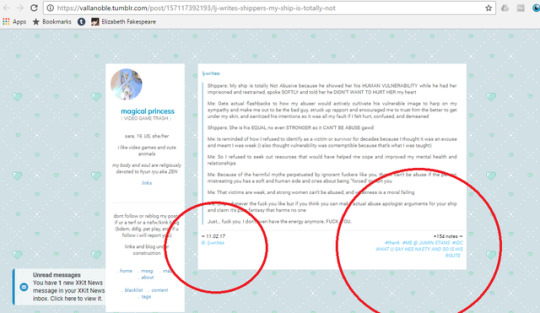
plus this post from a short while earlier
https://vallanoble.tumblr.com/post/155827891443/what-really-irked-me-more-so-than-just-the-fact

(screenshot 1)
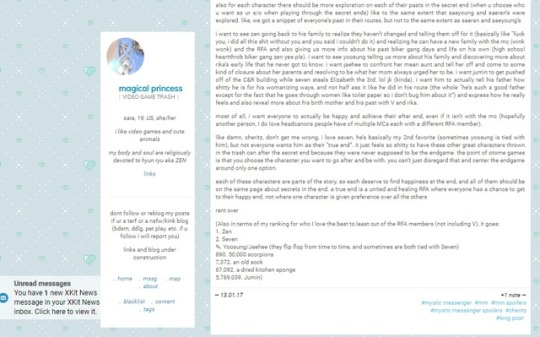
(screenshot 2)
Same behaviours as before. Both resenting discussion of Jumin where relevant and blaming me personally for gross fandom behaviours I was not guilty of. I had statcounter data too (no longer unfortunately, as I have the free version), but anyway, I blocked the user and went on my merry way.
Note:- In case it is not clear, I was able to work out the identity of Dipshit and block them based on their historical activity, previous asks they had passed onto me (which in turn led to their tag on stats), stat counter data at the time of the debacle (data I don’t have anymore, but they remained tagged in April) and a cross reference of posts on their own blog.
Side note:- Here is Dipshit admitting to sending the anons (paragraph 4)
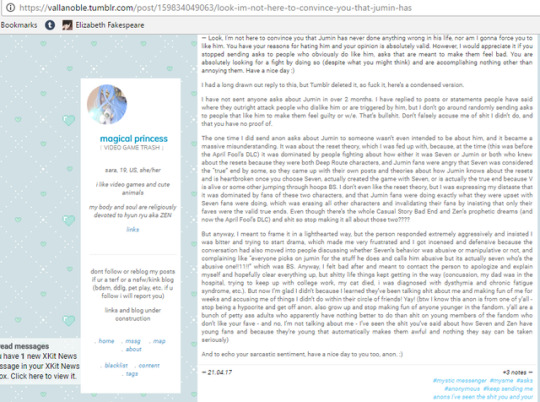
And again, (paragraph 2)
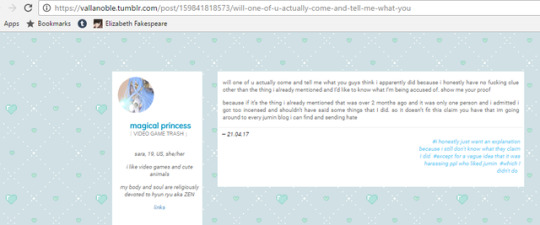
And again (paragraph 2)

And again

A n d a g a i n
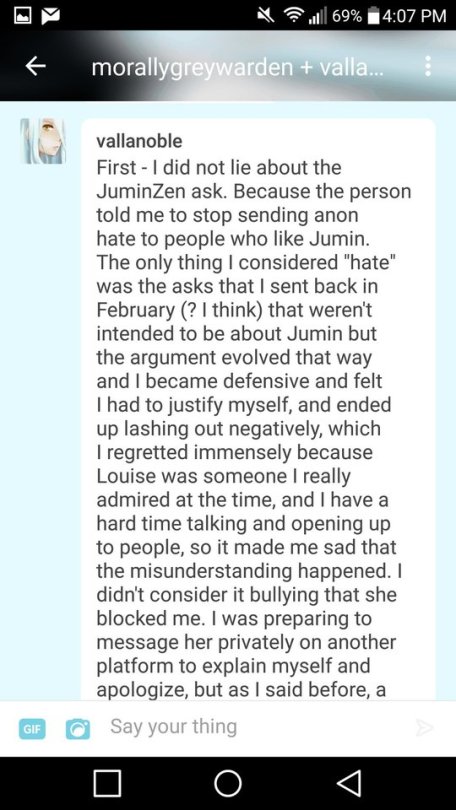
In any case. Check out these posts from March
http://themystic-messenger.tumblr.com/post/158096675544/vallanoble-replied-to-your-post-me-i-dont
(screenshot)

, [x]
https://vallanoble.tumblr.com/post/158933352583/the-amount-of-hate-and-aggression-towards-people
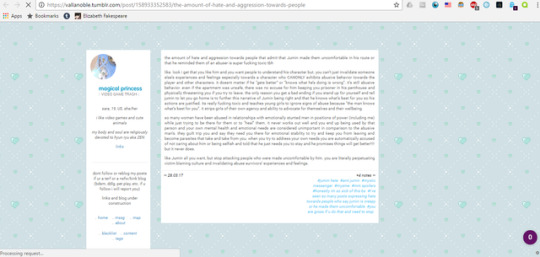
(screenshot)
https://vallanoble.tumblr.com/post/158973582463/yall-rant-and-rave-about-how-rika-abused-v-and
[x]

(screenshot)
and this one from April
http://themystic-messenger.tumblr.com/post/159234167469/i-rly-love-all-ur-posts-bc-i-agree-with-your
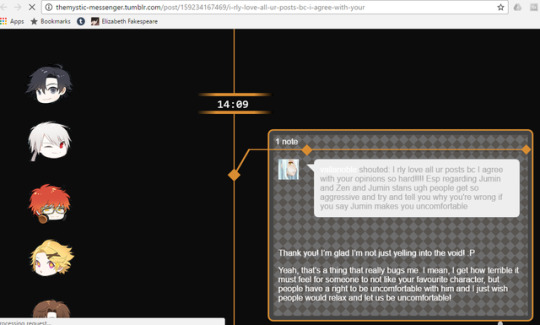
(screenshot here)
Once again, crucial context for what comes later.
Prior to JuminV week, I received this ask
http://fromthedeskofelizabeththird.tumblr.com/post/159180924940/zenxv-and-zenxjumin
This question came off the back of this ask to Jun, which was liked by Dipshit anon.
https://xeraeus.tumblr.com/post/159177453126/what-i-was-asking-a-question
There is currently no evidence to tie the ask itself to Dipshit however, in light of what happened later, I am including that detail nonetheless.
On the first day of JuminV, this was posted
https://vallanoble.tumblr.com/post/159427686298/sees-zen-x-jumin-content-stop-that
(screenshot here)

followed succinctly by this ask
http://fromthedeskofelizabeththird.tumblr.com/post/159426686395/am-i-the-only-one-annoyed-about-the-popularity-of
I made the connection to Dipshit Anon after replying. Juminzen week, as far as we know, was not in the works until after JuminV week had already started. Therefore, it’s unlikely that first message is connected to it and it was sent for a different reason.
Note:- Here is Dipshit directly admitting to sending the JuminV ask Part one, part two

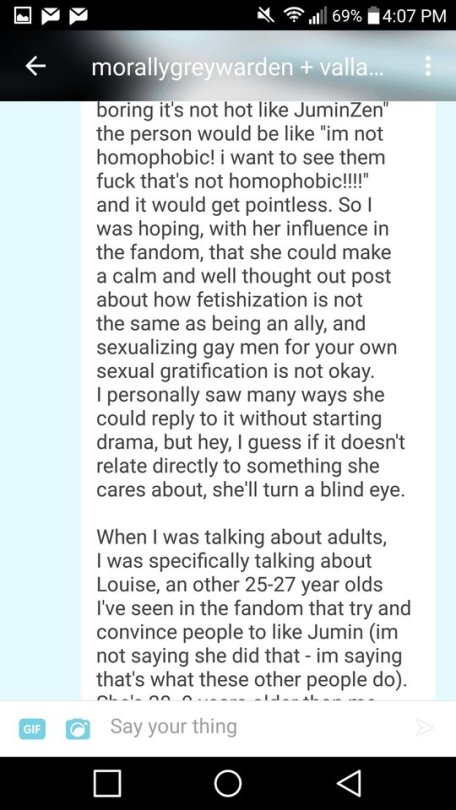
In any case, since I didn’t want to start ship drama, I dismissed them?? I blocked them by IP around this point.
After I responded two more responses came, citing a disability when reading and claiming to ship JuminV over Juminzen tl;dr because it was not fetishisation. I deleted both of these messages and blocked by ip. I would not have deleted them if I had already made the later connection.
I posted to twitter at this point, joking that it was the first day of JuminV and already I’d blocked the entirety of the University of Dipshit by IP.
I posted again a short while later after checking statcounter and making the connection.
Dipshit anon’s name or URL was not mentioned. The fact that they actually studied at the university was assumed, though not confirmed nor referenced by myself the tweets were later deleted and this is to the best of my recollection
Things went quiet, but then the mod of JuminZen week started liking my tweets about Dipshit anon (which in turn made me suspicious, as we did not know one another and did not talk until May). Strange asks started arriving to other bloggers in regards to JuminZen. My statcounter traffic started to spike with visits from the university of Dipshit.
In this period I made jokes about “Dipshit anon”, based on the fact that I had blocked them by ip more than once and they persisted in viewing my blog, leaving me to redirect their individual ip addresses to rick rolls, crash safari and more. In private I also complained about them, because their actions were making me uncomfortable.
They posted this on the 14th, which later made me suspicious
https://vallanoble.tumblr.com/post/159572324383/if-someone-makes-a-jumin-x-zen-week-i-will-boycott

(screenshot here)
https://vallanoble.tumblr.com/post/159700504123/wow-im-feeling-like-shit-i-want-to-die
This is what they posted on the 17th
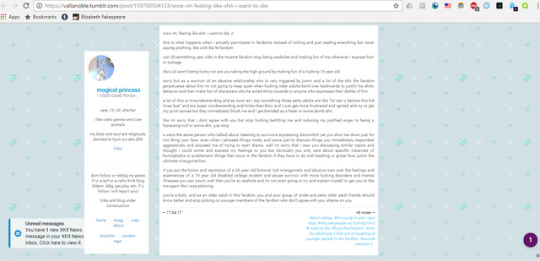
(screenshot here)
This is definitely about me, considering everything I’ve covered so far and this paragraph
were the same person who talked about listening to survivors expressing discomfort yet you shut me down just for not liking your fave. even when i phrased things nicely and came just to discuss things you immediately responded aggressively and accused me of trying to start drama. well im sorry that i saw you discussing similar topics and thought i could come and express my feelings to you but obviously you only care about specific instances of homophobia or problematic things that occur in the fandom if they have to do with bashing ur gross fave, jumin the ultimate misogynist han
The thing I didn’t understand was why it was framed as if friends were laughing, but
#dragzenweek
#dragzenweek was established as a joke (and regardless of opinions on the matter, it was not actually tagged with Zen’s name), but Alyx reported receiving genuinely hateful comments from fans of Zen and people who hated Jumin over it. One of them was Dipshit anon, which I pointed out at the time on twitter. Alyx posted a screenshot of a post from their notifs with Dipshit Anon’s URL blanked out and I was able to identify it. I personally feel from the manner the screenshot was edited, it would not be possible to identify the user without prior knowledge. (Please don’t take my word for this, however. Here is a screenshot)
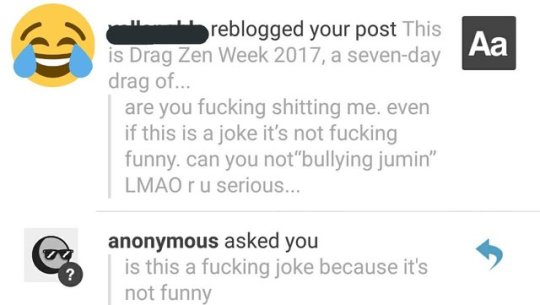
I was in contact with other friends about Dipshit anon’s behaviour and the possibility they were connected to other current dramas (at that point, I was the only person to receive an anon in regards to JuminZen who knew where it came from) both in private and otherwise. I was concerned, but did not want to spread malicious, unwarranted gossip.
It’s important to reiterate that in any given public conversation about Dipshit Anon, they were only ever referenced as such and not as any individual tumblr user. Dipshit-originally- referred to the general location of their Ip and Anon referred to the fact they had sent an anonymous message.
I spoke to Alyx about this at the time expressing concerns that Dipshit anon thought I was perhaps connected, or at the very least somehow involved with dragzen week.
On the 19th/20th April, I made a private document, detailing everything I currently knew, with links, screenshots etc (the first draft of this document). I did not want to keep repeating the story and if I was actually going to suspect this person of behaving badly, I needed proof. This document could not be liked, reblogged etc and and was only circulated privately among friends who had been in conversation about Dipshit thus far. It was a presentation of the facts as I knew them and intended to inform, leaving everyone to come to their own judgement on the matter.
Remember that at this point, beyond sending asks to Alyx and their priors with me, we did not know for sure Dipshit was connected to other dramas and without statcounter data, there was no way to actually prove it.
On the 19th of April, Alyx posted this screenshot to twitter.
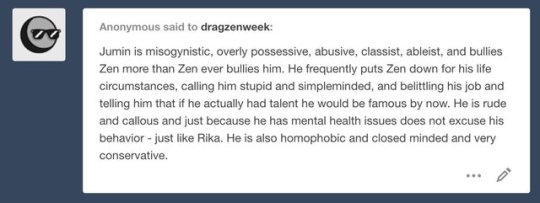
At the time we joked about how this remark was actually unfair of both characters, as while it’s certainly true that Jumin can be quite mean to Zen, Zen is hardly kind to Jumin either. Neither the screenshot nor the subsequent thread were tagged JuminZen or Juzen. You would have had to have gone directly onto Alyx’s page to find it.
This coincides with the following twitter based traffic to my tumblr page.

Worth noting is that Alyx’s twitter is listed on their tumblr page, where they also received hateful messages about the week on the 20th of April,
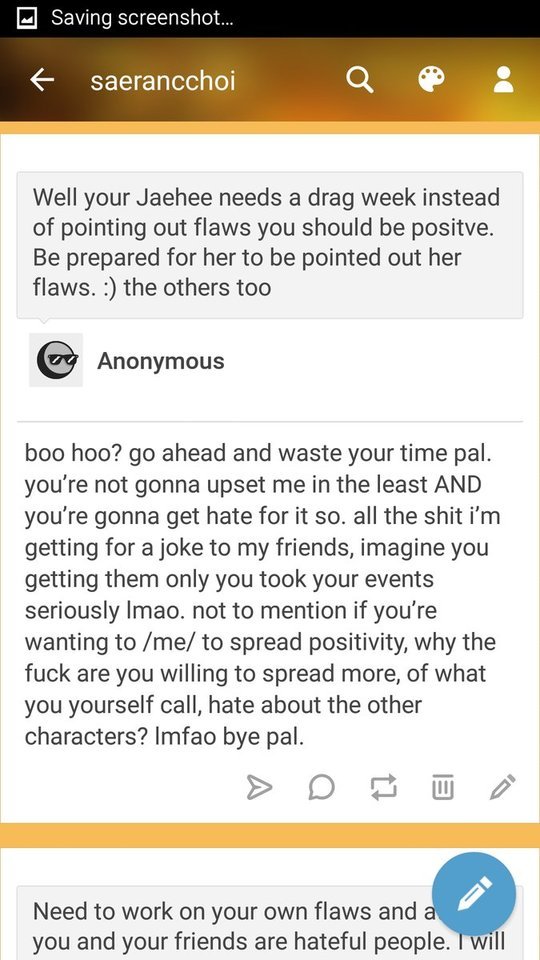
which once again coincides with twitter based traffic from Dipshit Anon.

Considering Dipshit Anon complained on the 17th about me and my friends and then Alyx received a complaint about their hateful friends, I do not think it’s too much of a stretch to suggest a connection.
Also around the same point, off the back of sentiments from other people that someone was trying to perhaps stir bad feeling betweeen Juminzen and JuminV shippers, I commented that I knew of two potential problems in this regard, one of which was Dipshit anon who I knew for certain had sent me an ask that would have caused drama. I mentioned victim complex, by the way, as a comparison to the Juzen shippers sending asks badgering artists. I was rather suspicious that no matter how shady their behaviour, ultimately Dipshit anon would convince themselves they were doing the right thing and anyone who told them otherwise was being a bully or a homophobe, having seen such behaviour before- both from them and other fandom dramas.
Also worth noting is that my tweet was on my own personal twitter page, which is not listed anywhere and was written J*zen. It was not retweeted and no one commented on it. It would have been impossible to find without either going directly onto my page or searching Dipshit Anon.
Around the 20th, Vess confirms traffic from Dipshit anon coming through from Val’s blog. Vess continues to receive traffic from them over the next few days. This comes after a tweet expressing the belief that Dipshit anon is, in fact, more than one person. In response, I note that the messages I received (of which there were three) came from Dipshit anon, which I know for certain. I do not confirm or deny anyone else’s, however.
That same day, Gillian also questions if Dipshit Anon is making the rounds. However, I personally do not comment on that thread.
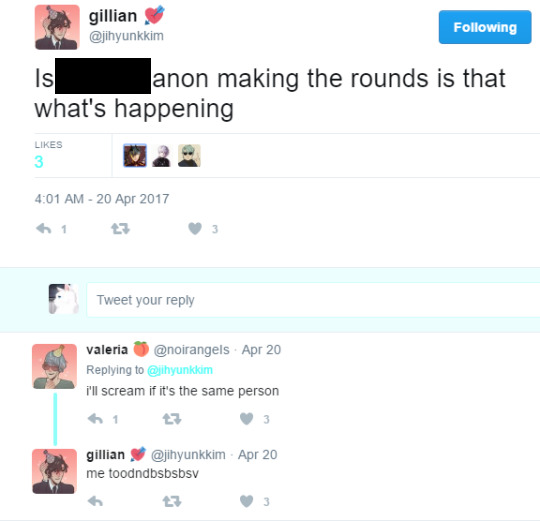
On the 21st of April, Dipshit anon posted hate directly to the Jumin Han tag because “they wanted Jumin stans to see it”
https://vallanoble.tumblr.com/post/159807410203/i-just-wanted-to-let-you-know-that-im-in-the-same
Screenshot is here
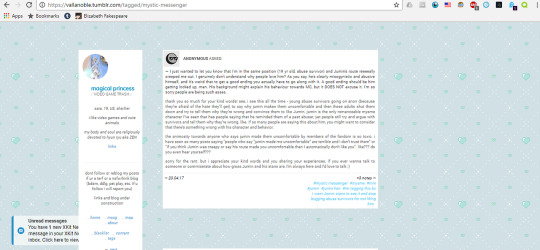
Note:- this gained a negative reaction on twitter as it broke established etiquette.
They later received an anon asking to stop sending messages.
https://vallanoble.tumblr.com/post/159834049063/look-im-not-here-to-convince-you-that-jumin-has
Screenshot is here

Note: I don’t know who sent this message. Up until this point, I had complained about them for stalking my blog, sending an ask that would have created a shit ton of drama and expressed my own concerns that they might have been doing the same to other people. None of us had mentioned sending asks about Jumin outside of that one post on the 19th, which related to askZen. This was not officially connected to Dipshit Anon at the time.
They later express righteous anger at the idea of “popular” Jumin and V stans blaming them for drama
https://vallanoble.tumblr.com/post/159834850458/apparently-someone-is-going-around-sending-angry
Screenshot is here

Note:- a quick search made it quite apparent that no ‘popular’ Jumin or V stans had referenced this blogger recently. However, this post comes shortly after dipshit anon was referenced as victim complex 101 on twitter (as dipshit anon). The connection was not made until later.
Dipshit anon claims to have been harassed, without mentioning names.
https://vallanoble.tumblr.com/post/159836552898/leave-me-alone-i-honestly-dont-know-what-the
Could be true, considering the Jumin post, though is not tied to that and no asks are published. Feels victimized for content they post on their own blog. Also claims not to have sent anons and only have lurked in the Zen tag, which is, frankly, untrue.
Note the phrasing: honestly how narcissistic do u have to be to think that one person who you had a disagreement with once is going around over 2 months later harassing every person who like jumin??? like??? <- this is about me
Link to Post - https://vallanoble.tumblr.com/post/159836552898/leave-me-alone-i-honestly-dont-know-what-the
Screenshot

Note:- This message also comes off the back of me saying on twitter (not 100% seriously) that I’m almost tempted to do a call out. Also note that this mostly came from the fact that they accused us of stalking and bullying on tumblr based on out of context comments from twitter.
Dipshit anon claims that people are spreading misinformation.
https://vallanoble.tumblr.com/post/159838725443/honestly-i-dont-like-people-who-blame-things-on
At this point the only information being passed around is a private document containing links to legit sources that cannot be reblogged to avoid this exact thing. References being mocked, which … this blogger has not been referenced on tumblr. Has only been mocked for their efforts as Dipshit anon. Based on things they have actually done.
Screenshot is here
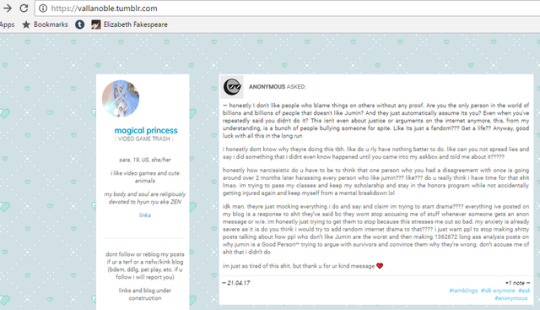
Dipshit anon refuses to give receipts on behaviour and references not wanting to start drama even though they spoke about boycotting an event only recently and tagged their hate that same day.
https://vallanoble.tumblr.com/post/159839414888/im-reading-ur-posts-abt-these-blogs-accusing-u-of
Screenshot is here

Dipshit anon tells another person that they have only made posts on their own blog irt Jumin, which is not true. They also say that their behaviour comes as a result of wanting their experiences as an abuse survivor to be considered. (Deleted! Screenshot available) Remember, they are not the only survivor here and they know this enough to try and use it in a vaguepost
http://fromthedeskofelizabeththird.tumblr.com/post/156210280495/honestly-im-so-glad-youre-talking-about-how
https://vallanoble.tumblr.com/post/159700504123/wow-im-feeling-like-shit-i-want-to-die
Screenshot is here
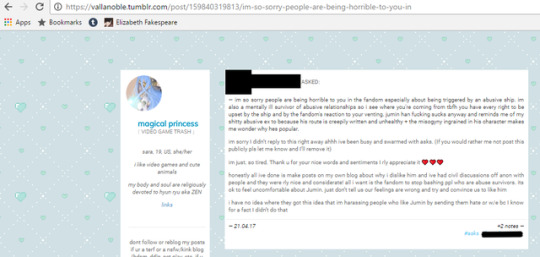
this private post was only referenced on twitter. In replies to conversations, not all of which mentioned Dipshit anon. Usernames were not mentioned. It was not posted on tumblr. Enough said. It was at this point that everyone started to suspect they were actually watching people’s twitters.
https://vallanoble.tumblr.com/post/159839641293/whos-saying-its-you-whos-sending-the
Screenshot here

Demands information from the people supposedly sending them hate Deleted, I took a Screenshot

Posts this by way of a receipt (does not link actual users) Deleted, but I took a Screenshot
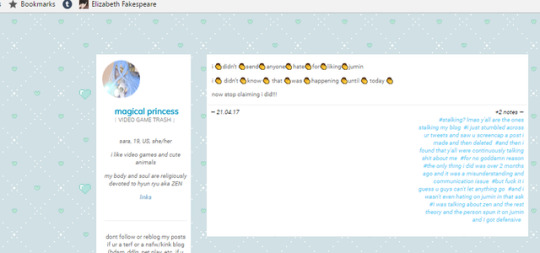
Note: You cannot just stumble across tweets !!! Also, the topic of conversation WAS Jumin. Dipshit got defensive after I refused to change the topic.
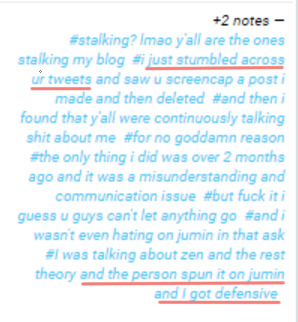
I would also speculate that this ask Alyx received on the 21st came from Dipshit anon, given these factors:
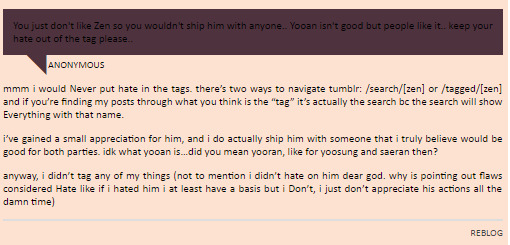
The timeline - having asked Alyx and knowing that ask arrived somewhere between 5am and 3pm cst on the 21st of April, which places it on the busiest period of Dipshit anon’s posts that day. Between the Jumin hate and many other of their corresponding posts
the knowledge that Dipshit anon was watching our twitters
the data that proves they were watching both Vess’ blog and mine for certain
They arrived at Vess’ blog via referral from Val’s. With this in mind and the facts above, it’s not unlikely that during this period they actually lurked everyone’s blogs.
This ask arrived during a very difficult climate when Dipshit felt particularly angry and in their own words, was stressed and emotional.
Not only that, but they themselves were on the receipt of criticism for posting hate in tags on the 21st.
I did a search of their blog for mentions of Yoosung and Unknown and they have explicitly stated a dislike for the Yooran ship (screenshot)
https://vallanoble.tumblr.com/post/159453918143/mysticmessengerspambot-gah-im-tired-of

This is speculation, but considering the evidence, I believe it is fair.
On the 22nd April, Dipshit Anon sends a message to Alyx (part2)(part 3)
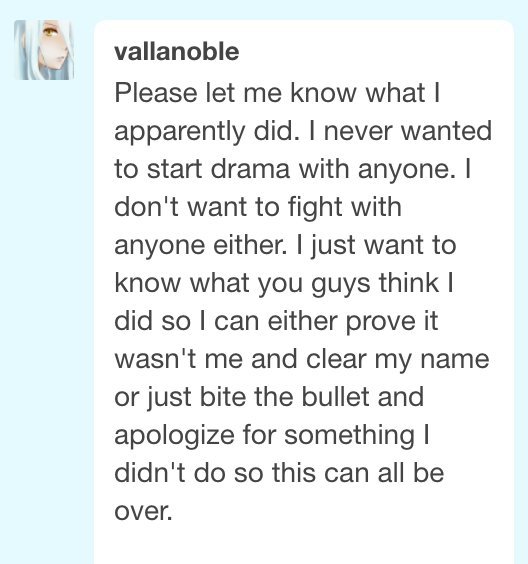
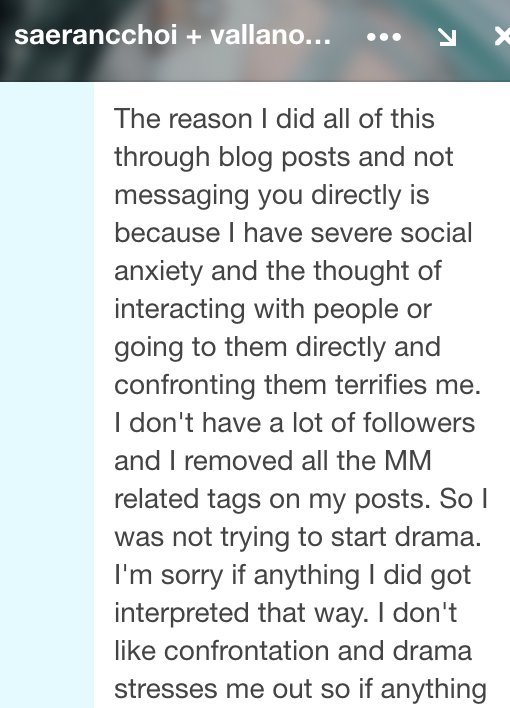
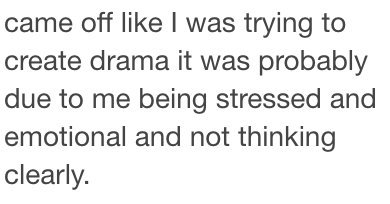
They send a message to Serena shortly afterwards
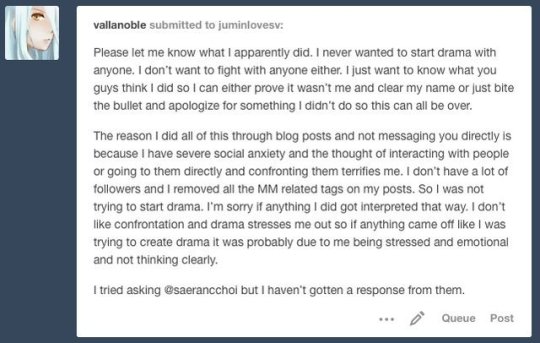
Here is how the conversation goes:
S: “I’m a bit confused about what it is you want me to tell you, honestly. I never thought that we were engaged in drama nor were we fighting, considering I’ve never spoken to you before.”
DA: “No, I didn’t think so either. But apparently you and some others had a post listing things I’ve done and I was really confused?? There was accusations of me sending people who liked Jumin mean asks which I didn’t do? I just wanted to clear everything up and figure out where that was coming from.”
S: “I don’t recall anyone saying that people were sending Jumin fans mean asks. Can you be more specific?”
DA: “Um, wasn’t that the entire point of what was going on though? There were tweets saying that I was sending harassment to people who like Jumin?Someone sent me a message telling me to stop sending asks to people who like Jumin which I didn’t do? And it seemed like it was from one of you guys. I could be wrong, though.”
S: “Well, I didn’t send that message, and to my knowledge none of my friends have sent you anything.”
DA: “That was the bulk of my frustration. I saw some tweets assuming that I was sending anon asks to random people about Jumin which I didn’t do, and I was overwhelmed and upset at being told I was doing something that I didn’t.”
DA: “Okay. Then what was all the hype about saying that I was harassing Jumin fans? And that there was a private post that apparently had a bunch of evidence that I did a bunch of things? I honestly was super confused on what everyone thought I did and that’s why I was upset.”
S: “Do you want to link me to a specific tweet claiming that you’re harassing Jumin fans, because I still do not recall anyone saying that.”
S: Honestly, it’s really not my responsibility to entertain you, but I’m a bit tired of this and I have exams to study for so I’m going to anyway. First of all, my friends and I aren’t a hive mind. I don’t know what it is they’re saying about you at all times, and just because they say something it doesn’t mean that I personally agree with it.
Second of all, I was referencing this ask that you sent to Louise when I referred to sending asks trying to start shit:http://fromthedeskofelizabeththird.tumblr.com/post/159426686395/ … I’m not interested in debating whether or not that was actually your intention; it doesn’t really matter to me because that’s the effect it would’ve had when it landed in Louise’s inbox had she chosen to reply to you seriously. And I know that you were the one who sent that ask, because of this post that you made subsequently, so don’t bother:https://vallanoble.tumblr.com/post/159700504123/wow-im-feeling-like-shit-i-want-to-die … For some reason, you chose to pretend that her response was some sort of personal vendetta against you for disliking Jumin, even though her response has nothing to do with Jumin’s character at all and simply stated that she doesn’t want to partake in an argument that’ll cause friction with JuminZen fans. And then you did a whole lot of misconstruing by saying that she’s belittling you for your justified anger or not taking your experience as a survivor seriously, which is a very serious and untrue accusation to be making of a person who is also a survivor. Hence, my annoyance with you.
Thirdly, I posted my incredulity at the fact we’re the same age, because of your assertion that adults in the fandom are bullying you despite being an adult yourself, and despite the fact you aren’t being bullied. Getting blocked isn’t being bullied, it’s being ignored by someone who has no requirement to engage with you anyway. Fourth, it annoys me that you said you haven’t sent any asks about Jumin since months ago, when you just sent that JuminZen ask like two weeks ago, because that’s lying. This entire time you’ve remained anonymous in our discussions. We’ve literally been calling you “Dipshit anon”, and your url hasn’t been publicly revealed anywhere. None of this information is available to anyone except in our group of friends, since the post containing these and other links is private, and we’ve only been sending it through private messages to people we are friends with. The fact you decided to listen in on a conversation about things you really did and claim that having that conversation is bullying is your problem, not ours. Have a good night.
Screenshot of Dipshit Anon loading my blog one hour before I am referenced in this conversation

Before Dipshit Anon’s response, I learn that Vergil received a strange JuminZen ask and receive clarification that, while he did receive traffic from Dipshit (the location), the one in his askbox was Italian. Around this point we discuss potentially eliminating Dipshit from this particular inquiry, but also to keep an eye on them in case of future problems. I too received traffic from Italy recently.

Dipshit begins deleting posts off their blog around this point. (The final two on the list)
Vess confirms traffic from Dipshit anon

Dipshit Anon’s response 1,
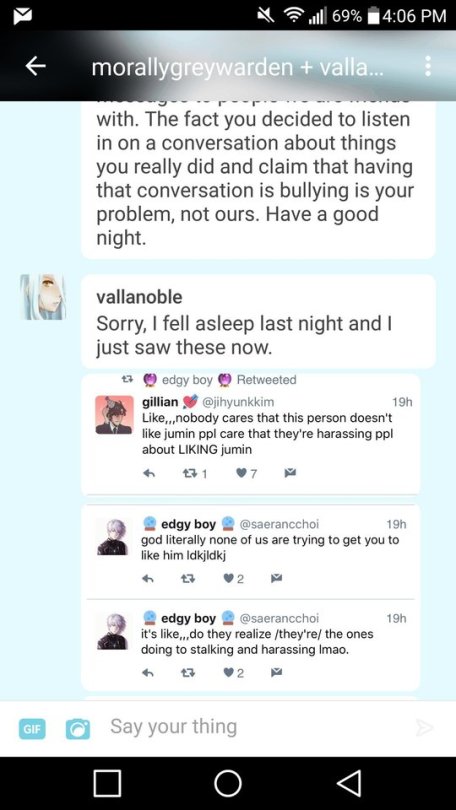
2
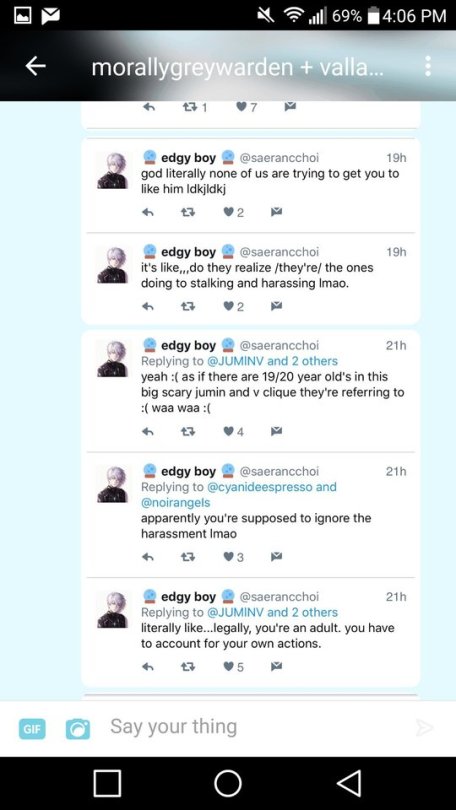
, 3
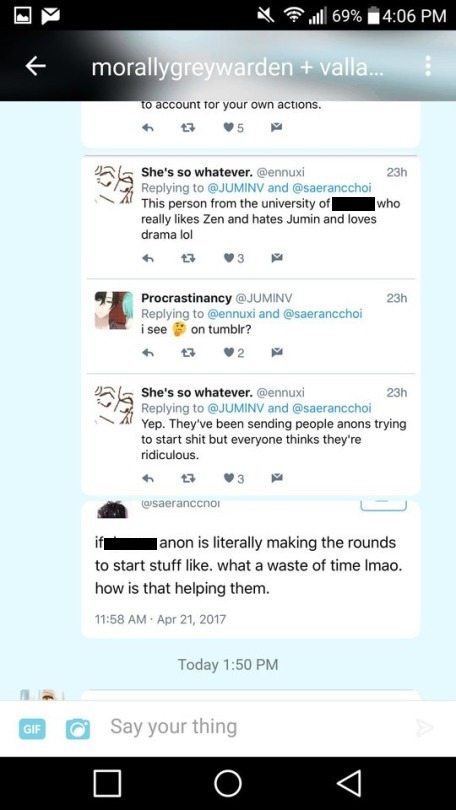
, 4

, 5

, 6

, 7
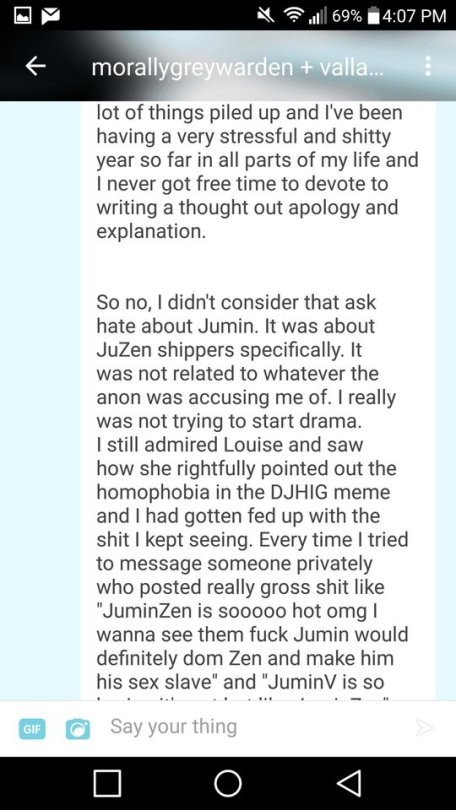
, 8

, 9

, 10
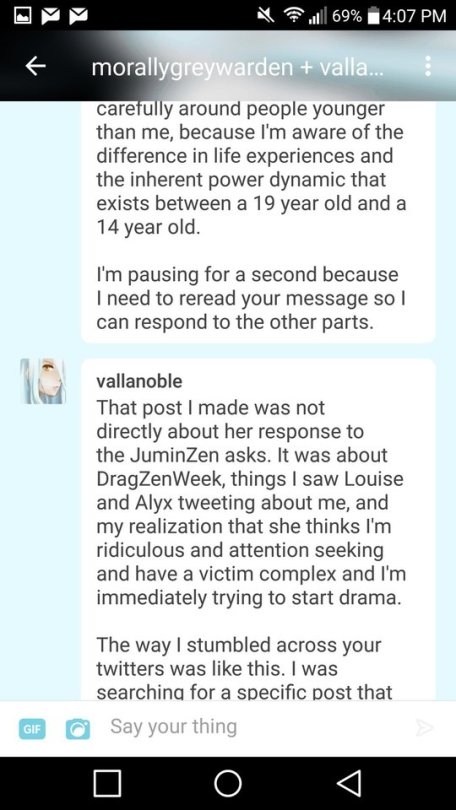
, 11
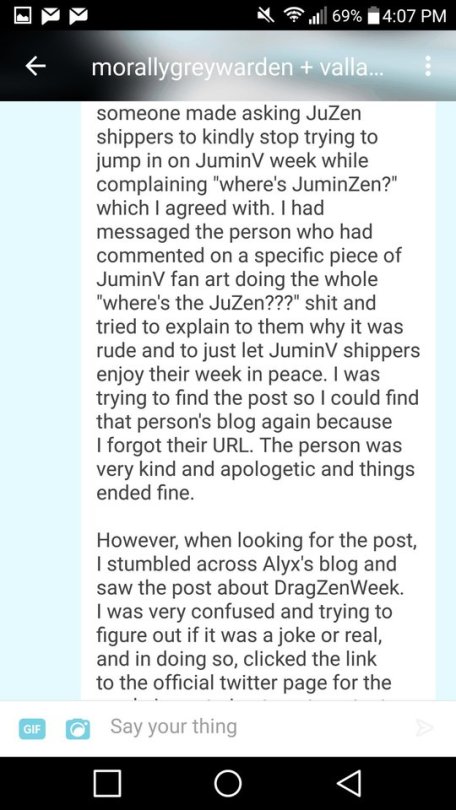
, 12
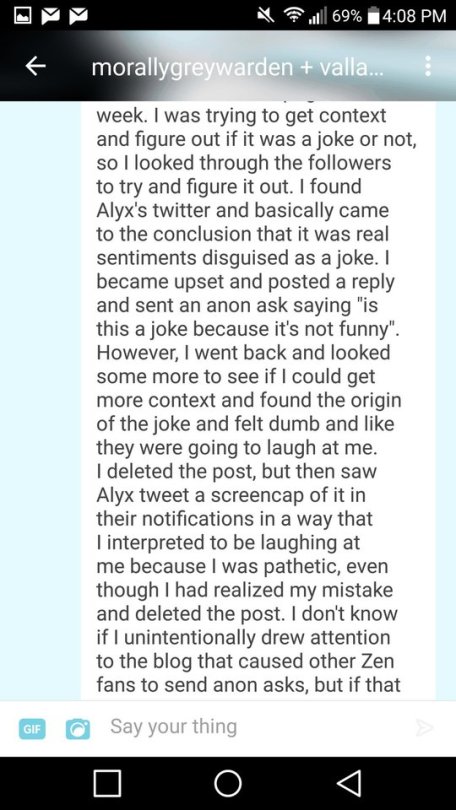
, 13
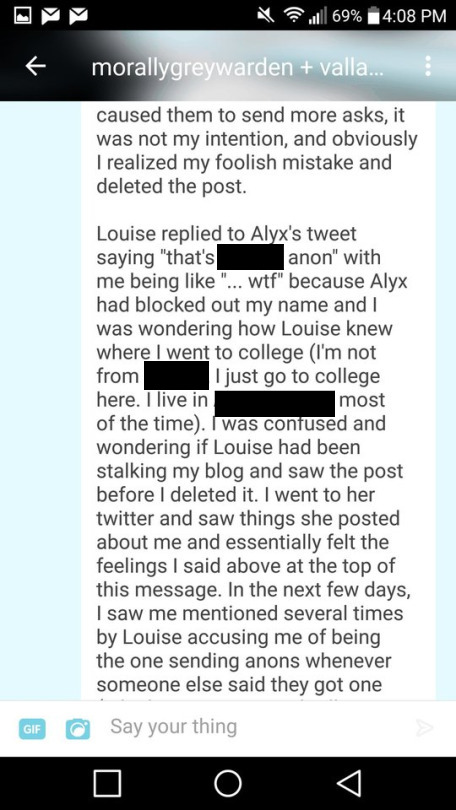
, 14
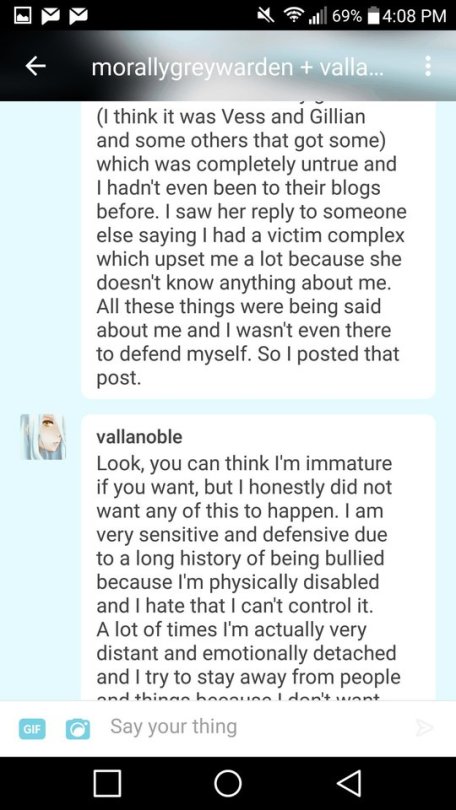
, 15
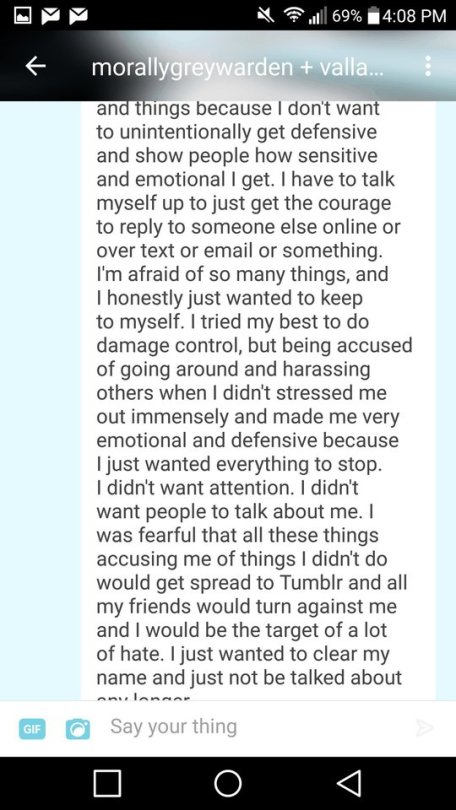
, 16
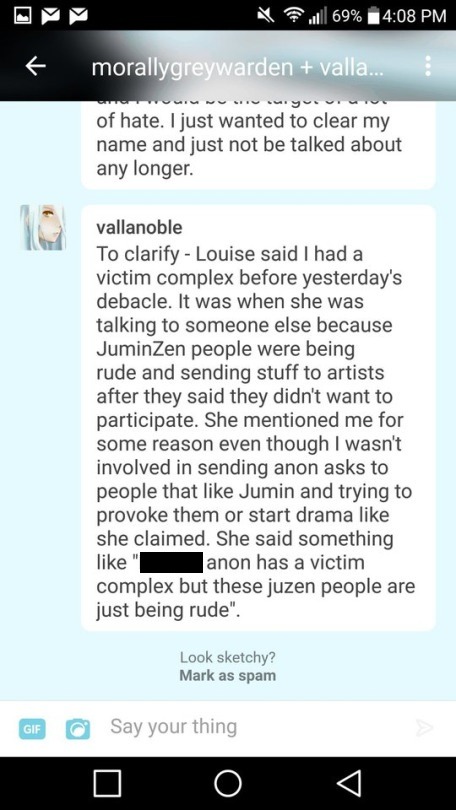
Some notes:-
In regards to point 8, this person is blocked from my blog for reasons I have already explored and it is manipulative, to say the least, to complain about my reaction to them when they had no business being in my inbox in the first place.
The phrasing of point 8 actually is very manipulative in general “oh well, she doesn’t care”. My emotional labor is not for their profit, nor consumption.
Speaking of manipulative, consider the point about age. Dipshit anon repeatedly refers to themselves as a child when they are nineteen, repeatedly complains about adult bloggers and grownups being condescending and in points 8 and 9 complains about an inherently present power dynamic that I should be aware of when speaking to younger bloggers, all while sending asks on anon. I cannot feasibly guess the age of anonymous asks.
I don’t actually remember saying anything about Zen and Seven fans on my twitter or tumblr. I also cannot find anything on my twitter about this. So. Um. Receipt?
I believe that point 11 is true to an extent. I believe they probably found DragZen on the 17th and, from there, found Alyx’s tumblr. I also believe that from there they found Alyx’s twitter, which would give us something of a timeline so far. It certainly brings us to their angry post on the 17th, in any case.
It’s true that I identified them as Dipshit anon, but only after concluding that their URL was blanked out satisfactorily and only because Dipshit anon was the name I had been using from the beginning to identify the person that sent me a questionable ask and continue to load my blog afterwards.
The next part in 15 is just. Where do I begin? Even Dipshit is not sure whose anons I identified as theirs. As a matter of fact, I only identified Alyx’s. When Vess got statcounter, we compared data in the interest of accuracy (as I later did with Vergil), but none of this happened on my public twitter.
When Dipshit refers to Gillian receiving asks, I believe they are talking about this, which I did not confirm

Point 15/16 makes me really uncomfortable, for reasons I will come to at the end.
Here is them viewing my blog around about this time

S: Okay, re: everything else now.
1. All right, if you didn’t consider that ask as being about Jumin then I’m fine with setting aside the idea that you lied about it. It was personally frustrating to me because I really don’t care what asks you sent about Jumin months ago, I was annoyed by the response to Louise’s way of handling the JuminZen asks from a couple of weeks ago. It’s pretty clear by now that you probably didn’t even have that JuminZen ask in mind the entire time all of this was happening, but that’s what I was thinking of in terms of everything else I posted. I have my thoughts on how the situation could’ve been handled differently by both you and me, but at this point I don’t think it matters anymore and in the interest of resolving things let’s call it a misunderstanding and move on. I already said I don’t really want to debate whether or not that ask would actually have started drama so I’m not going to.
2. I wasn’t aware of the timing of your post was after the DragZenWeek incident and not after the ask you sent Louise, but upon re-reading it makes a lot more sense in that context and I’m sorry for making assumptions. To ease your worries, Louise wasn’t stalking your blog. She has an app called StatCounter that allows her to see where people are accessing her blog from—that’s how she put together who it was that had sent her other messages prior to the JuminZen ask, and that’s how she was able to block your IP address. By the way, she also knows you’ve been bypassing her IP block to visit her blog these last few days.
I can understand why you were stressed, honestly. I disagree with the way you do a lot of things, but I’ll readily admit that I personally made a lot of assumptions that I didn’t have a real basis for making, and I’m sorry. I stand by my statement that no one claimed you were going around and harassing Jumin fans with asks, though.
To explain my own point of view, most of what was annoying *me* was that you were conflating responses to you with disliking you for liking Jumin. I can’t speak for anyone else, obviously, but I personally could not care less if you hate Jumin. Speaking for myself here, I’ve said multiple times that although Jumin is my favourite character, I’m completely sympathetic with the reasons people would have for hating him, and I’ve also said that I would never engage in a debate over him with someone who says Jumin reminds them of past abuse because that isn’t my place to speak. Most if not all of my friends have said the same or similar, and honestly, I don’t want friends that don’t have that attitude and when I dislike someone I make it pretty damn easy to tell. But you were accusing Louise of that, which I think is especially insensitive because Louise is also a survivor, and now you’re saying that you meant for all of that to apply to Alyx too—not that you need to know this, but Alyx heavily criticizes Jumin’s route for the exact reasons that you probably would. Again, it’s a very serious thing to accuse people of being abuse apologists, especially when you don’t know the situation.
I can’t speak for anyone else, but I’m sincerely sorry that you were hurt by my words yesterday, especially because some of the claims I was making were unfounded. Gossip is something I generally try to avoid, and I think this entire situation was a good reminder as to why I do that. I still don’t think this falls under the definition of bullying, but I do empathize with your perspective and I’m sorry for my involvement.
I’ll go back and delete any posts about this that were made by me. Here are my recommendations for you:
1. I don’t know if you have the extension XKit, but it allows you to blacklist certain words so that posts containing them don’t show up when you’re browsing tumblr, and it allows you to block posts that you dislike/don’t want to see. It’s a good tool to help you stay safe while navigating the site, and I think you should probably put Jumin’s name into it since you’ve mentioned that you find him severely upsetting.
2. Use the “anti” tags when you want to discuss character hate/critique, or don’t tag at all. It’s totally within your rights to critique a character, and using the anti tag means that anyone who chooses to interact with your post is consenting to do so knowing what they’ll be getting into. When you tag a post, you’re basically giving people permission to engage if they want to, so if you want to have a critical discussion about a character with like-minded people or people who disagree but are interested in having a discussion, that’s your way to do it. If you only want to discuss with like-minded individuals, you can throw on an “#I’m not interested in debating this” tag so people who disagree know to stay away. There’s a reason none of the DragZenWeek posts were tagged with Zen’s name and this is that reason.
3. This goes for both of us, but if you’re seeing something happening out of context, don’t assume that you know what the context is. You didn’t know what it was I was talking about when I discussed asks you sent, I didn’t know what you were talking about when you made that post (and I also assumed it was you sending the other asks, double bad on me). I don’t think I’ve anything more to say on this subject. If you do, feel free. Thank you for taking the time to contact me in spite of your social anxiety—I understand that that was hard to do and I appreciate it.
Dipshit Anon:
Thank you for your reply. I appreciate you clearing things up. I usually tag my posts with anti-Jumin, but at that time I was still emotional and defensive about things I previously mentioned, so I thought that tagging it would send a one time message to people that like Jumin to not harass survivors that feel uncomfortable with him about it. That’s all I wanted. It was a bad move on my part and I’ve gone and fixed it and I’m sorry.
I forgot to clarify these things - I didn’t think Alyx was being insensitive towards me being an abuse survivor - I made an error when constructing that sentence and it made it seem like I was including them in that statement. I just was upset because I was under the impression that they thought I was pathetic and attention seeking for my deleted post on DragZenWeek.
I can’t remember what exactly happened that made me say that thing about Louise being insensitive to abuse survivors and not liking me because I didn’t like Jumin, but that wasn’t about the JuminZen ask I sent or the previous one for February. It was something to do with her statement about me being attention seeking and seeing some responses to other people’s asks who criticized Jumin or something. I honestly can’t remember, and looking back at the post I don’t know why I said that, and I’m sorry.
I feel like a lot of this was due to misunderstandings by me and a little on the others sides and I reacted defensively and angrily to situations when I didn’t know the entire story. That just led to more statements and miscommunication on both sides and it spiraled out of control. Nevertheless, I apologize wholeheartedly and I appreciate you giving me a polite and courteous reply. I’ve been dealing with some tough stuff in real life for the past few months, including a traumatic brain injury, that’s clouded my judgement and made me more volatile and sensitive to criticism or what I misunderstand as negativity directed at me. I know that doesn’t excuse anything, but I just wanted to clarify that I’m not usually like this, and I usually keep to myself. I’m digressing, but I sincerely do apologize. I appreciate your clarification and will definitely do the the things you recommended. If you could, it would be very much appreciated if you could pass along my apology sentiments to everyone else that was involved. You don’t have to, and I’m not expecting them to forgive or unblock me or anything, I just want them to know that I am sorry and I’m usually a reasonable and nice person when not under extenuating circumstances.
Thank you again and I wish you the best.
Also - clarification about why I didn’t have Jumin’s name blacklisted - I’m on mobile Tumblr a lot, because it’s just easier for me to use because of a lot of convoluted reasons related to my learning disabilities and mental illnesses. But I do have them blacklisted on my computer, and when I’m on mobile if I see a particularly terrible hate post about Zen or a post that is praising Jumin but uses examples of Zen and why he comes up short in comparison, I’ll block that person. I usually don’t really care and avoid that stuff, but I have encountered several blogs in particular (none of which belong to you or any of your friends) that express extreme animosity towards people who say Jumin makes them uncomfortable or reminds them of past abuse. That’s kind of where that ask response was coming from. I just wanted people not to bug others who don’t like him. But it was done in the wrong way and I’m sorry. Also, I was only checking Louise’s blog because I was paranoid that she was going to post things about me and I wouldn’t be able to see them. I’m not going to do that anymore and I’m sorry.
And those blogs I mentioned that attack abuse survivors make numerous posts saying stuff like “if you say jumin made you uncomfortable I don’t like you” or “people who are triggered by jumin are the worst” and etc. Again, it wasn’t you or any of your friends, but some of those people who do that were really insensitive. I’m sorry for tagging the post though and getting y'all dragged into it.
Notes:-
There is a difference between EXPLAINING your actions where relevant and EXCUSING them. And excusing them is very much what’s happening here, given this phrasing: I’m usually a reasonable and nice person when not under extenuating circumstances.
Disability or stress or emotion is not an extenuating circumstance for accusations of abuse apologism and stalking, nor is it an extenuating circumstance for repeatedly insisting on engaging in conversation with someone who has blocked you. It’s not an extenuating circumstance for flat out lying in some cases and manipulating the facts in others. It’s not an extenuating circumstance for listening on a conversation you aren’t included in and choosing to accuse the people having the conversation of bullying instead of asking for context.
Secondly, Dipshit’s comment here: I forgot to clarify these things - I didn’t think Alyx was being insensitive towards me being an abuse survivor - I made an error when constructing that sentence and it made it seem like I was including them in that statement. I just was upset because I was under the impression that they thought I was pathetic and attention seeking for my deleted post on DragZenWeek.
Given the timeline we have so far, their post on the 17th, Alyx’s asks around that period and the traffic on my blog, I think it’s more accurate to suggest that they WERE including them and are backtracking.
Also in regards to this: I can’t remember what exactly happened that made me say that thing about Louise being insensitive to abuse survivors and not liking me because I didn’t like Jumin, but that wasn’t about the JuminZen ask I sent or the previous one for February. It was something to do with her statement about me being attention seeking and seeing some responses to other people’s asks who criticized Jumin or something. I honestly can’t remember, and looking back at the post I don’t know why I said that, and I’m sorry.
Once again, given our timeline, the fact that if I called them attention seeking at all it wasn’t until after the 19th in replies to other people and Alyx and I chatted about Jumin on twitter on the 19th, I feel it’s fair to conclude that this could be a legitimate memory blank, but it’s more likely to be backtracking.
It’s also very clearly backtracking irt: but that wasn’t about the JuminZen ask I sent or the previous one for February, when both are explicitly referenced in the post itself.
I usually don’t really care and avoid that stuff, but I have encountered several blogs in particular (none of which belong to you or any of your friends) that express extreme animosity towards people who say Jumin makes them uncomfortable or reminds them of past abuse.
This is the second (?) time they’ve angrily drawn other people into a conversation about unrelated topics and they have made posts about boycotting events, they tagged their hate only recently etc. I think it is fair to conclude from all evidence so far that they do care and they don’t avoid that stuff.
I’m on mobile Tumblr a lot, because it’s just easier for me to use because of a lot of convoluted reasons related to my learning disabilities and mental illnesses
I went back to count and Dipshit anon mentions their illnesses, injuries and more on seven separate occasions and always in the context of gaining pity, thereby shifting the power dynamics of the conversation.
Dipshit Anon remains blocked as of April 2017
As of 22nd of April 2017, they continue to load pages of my blog, despite their own statement that they would not:
Also, I was only checking Louise’s blog because I was paranoid that she was going to post things about me and I wouldn’t be able to see them. I’m not going to do that anymore and I’m sorry.

Also worth noting is that this traffic came through a t.co reference, which is the shortened url format from twitter.
In response to this, I made my tweets private again and removed the link to my blog from my twitter bio.
As of May 8th 2017, they continue to load pages of my blog.


I believe this occurred because of a reblog of this post.
http://fromthedeskofelizabeththird.tumblr.com/post/160437244740/your-recent-reblog-made-me-realise-how-mistreated
As of the 10th of May, I receive traffic on a singular VxMC-centric fic from Dipshit (the location). This traffic recurs over several days right up until the 14th.

I do not usually receive traffic from Dipshit the location with this amount of frequency. I also knew that Dipshit the person had been browsing my blog. This put them on my radar.
On May 15th 2017, I learned of this ask on Void’s blog
http://vo-dcc.tumblr.com/post/160686201606/i-saw-you-were-one-of-the-artists-for-the-zen
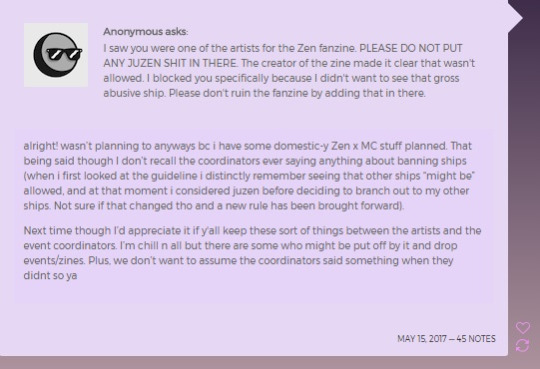
(screenshot).
At the time, I had my suspicions that Dipshit might be involved and a brief check on their posts that day reveals that Dipshit did intend to submit to the fanzine.
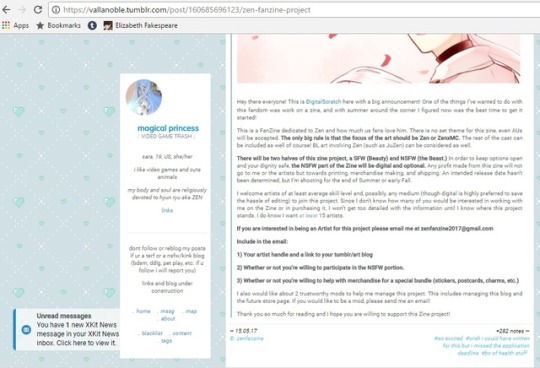
(Link)
https://vallanoble.tumblr.com/post/160685696123/zen-fanzine-project
At approximately 9am that morning, I receive traffic from them on statcounter.

The interesting thing about this is that at first I was not entirely sure why this traffic happened. I do not reference anything about this incident on my blog until approximately midday, when I reblog Void’s answer to a second ask.
http://vo-dcc.tumblr.com/post/160688531186/the-creator-of-the-zen-fanzine-did-clarify-that
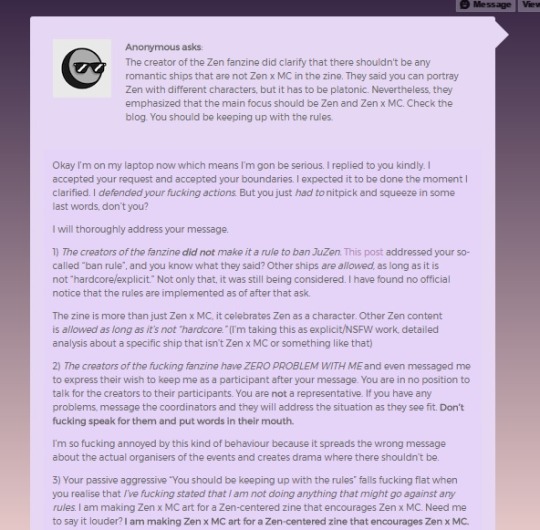
(Screenshot) (Here is the time stamp of when I actually reblogged it)

From 8.30am onwards, Void and I were talking privately about the situation, at which point (a little before this conversation)

Void referenced typing out a long post, which likely became the one they later posted. (Having chatted to Void, they later confirmed that it was in fact, already posted by the time of that screen.) This creates something of a potential timeline of Dipshit seeing the post shortly after it was posted and following through to my blog shortly afterwards. (Note: I believe I was not the only one to receive this treatment, but I’ll get to that later)
In any case. I asked Void to check if they were blocked by Dipshit and it later transpired that they were.

I encouraged Void to get Statcounter, we compared notes and here is a full compilation of all traffic
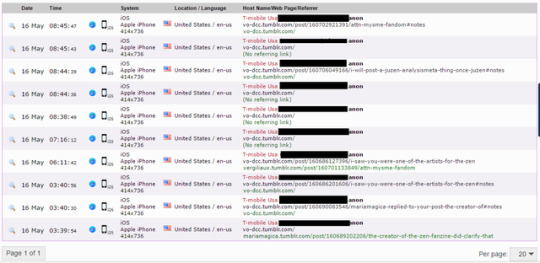
from

Dipshit received within the first day of installation. (Pls note that the date is different because of time zones. I live in Britain and for me these times are in the evening of the 15th. US people would be even further back in the day)
Here is a screen of Dipshit later admitting to sending both asks covered so far to Void
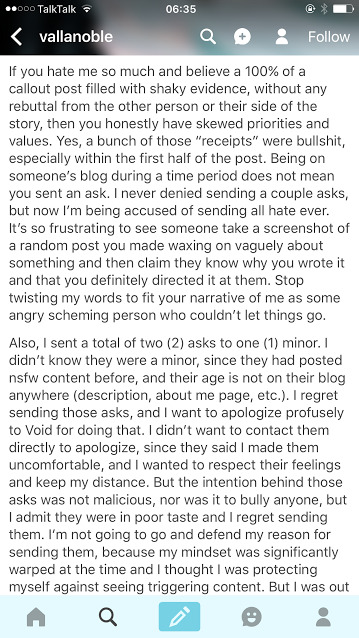
Note that I said I was not the only person whose blog potentially received attention from Dipshit as a result of Void’s posts. I believe that Dipshit actually went through the blogs of several people who either commented or expressed support for Void over the course of those few hours spanning from when they first received an ask to the 9am response.
This would not only fall in line with current evidence at hand, but also their actions in April.
Exhibit a
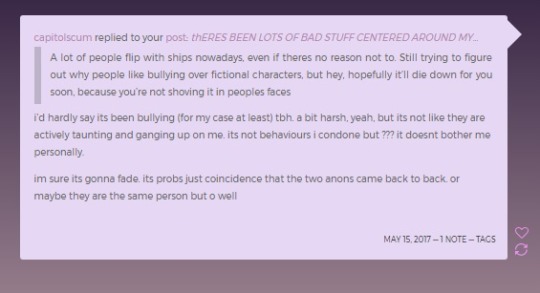
, exhibit b
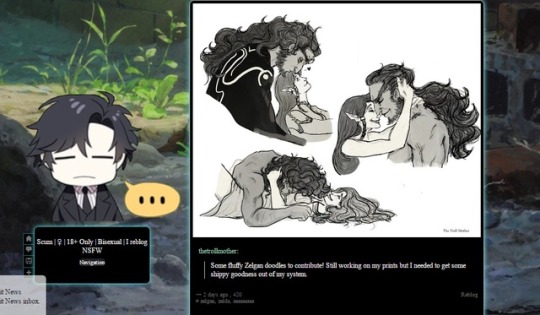
, and exhibit c
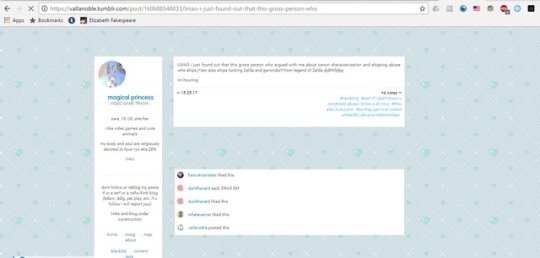
(link)
https://vallanoble.tumblr.com/post/160688548033/lmao-i-just-found-out-that-this-gross-person-who
(I’m coming back to this one later)
Also take note of this reblog by user setthestarsxonfire.
https://setthestarsxnfire.tumblr.com/post/160686536882/i-saw-you-were-one-of-the-artists-for-the-zen
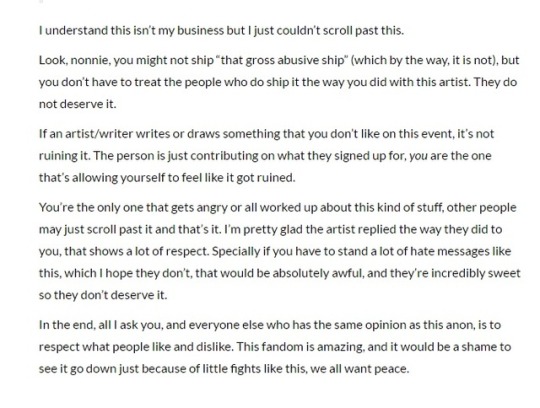
(Screenshot)
They made a post a short time afterwards, further going into their feelings on the matter
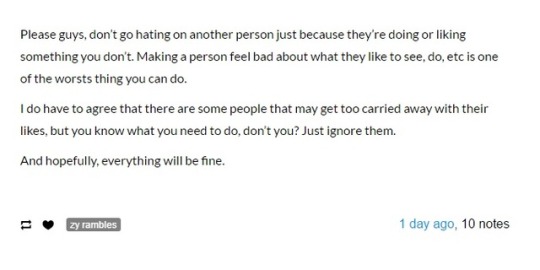
(link)
https://setthestarsxnfire.tumblr.com/post/160687270552/please-guys-dont-go-hating-on-another-person
Afterwards, they received three asks (ask a,
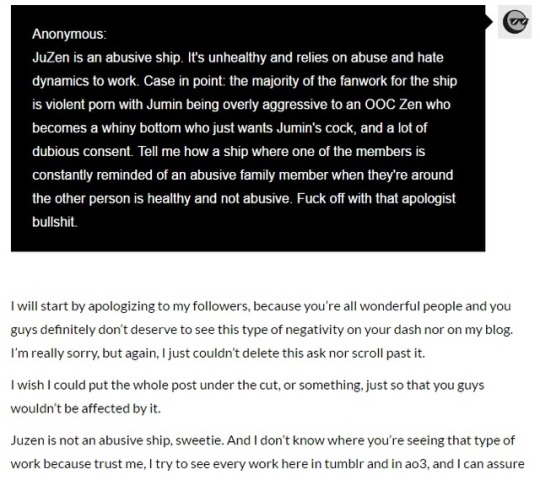
ask b
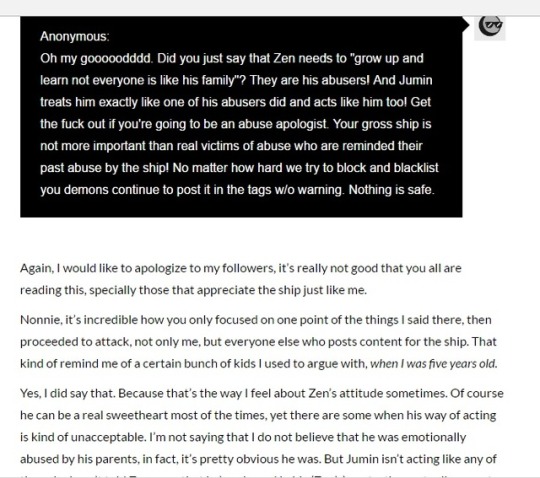
and c
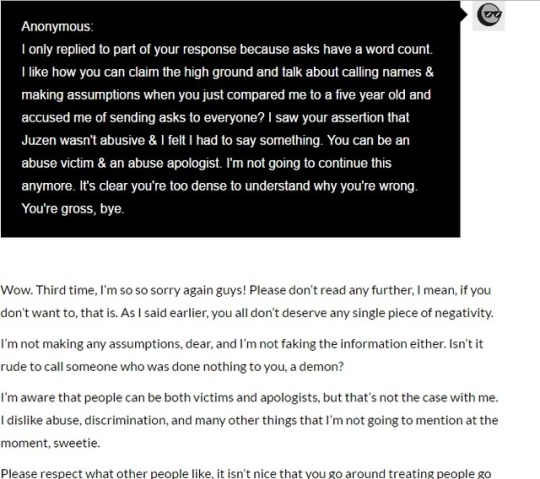
) (link to a,
https://setthestarsxnfire.tumblr.com/post/160689487552/juzen-is-an-abusive-ship-its-unhealthy-and
link to b
https://setthestarsxnfire.tumblr.com/post/160690376012/oh-my-gooooodddd-did-you-just-say-that-zen-needs
, link to c
https://setthestarsxnfire.tumblr.com/post/160691061357/i-only-replied-to-part-of-your-response-because)
When reviewing statcounter data, it’s clear that Dipshit reviews the #notes of posts and flits from one blog to another.
While this was happening, I was in conversation with user mariamagica, having seen them comment on Void’s post that they knew who was sending the anons. Considering that this was the same person who had liked my tweet about Dipshit Anon way back in April, I was curious to know what they knew and if we had any shared experiences.
It transpired that Dipshit was so well known to them and had caused them so much bother that they were able to reference them by name within a matter of seconds. They sent me this screenshot sent to the askbox of the Juminzen week blog.
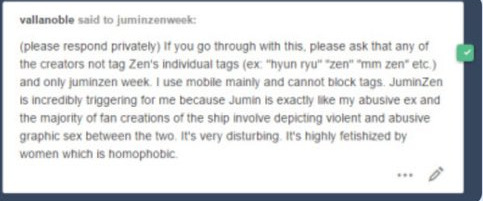
Mariamagica had them blocked, but I encouraged them to get statcounter and here is their Dipshit traffic from the 15th.

A short time after this, Vess and Jun confirm that Dipshit followed them that same day.


Dipshit continues to lurk my blog.

Having gone over the events of the day, I made a post at 18:46 my time. This is a soft warning and a pre-emptive call out. Up until this point I had not said anything about Dipshit anon publicly on my tumblr, but I was running increasingly low on patience. I blocked them in February and kept the details to myself at the time, but they continued. In April, we resolved it peacefully but they continued. At this point they were on strike three.
In my post, I listed three examples of asks from Dipshit.
http://fromthedeskofelizabeththird.tumblr.com/post/160701054230/attn-mysme-fandom
These were all examples I could confidently attribute to Dipshit and as it gained so many reblogs, I gained

a

lot of traffic

from Dipshit

in that period.
This traffic extends to my personal blog

I received an ask
http://fromthedeskofelizabeththird.tumblr.com/post/160703102265/hi-im-not-looking-to-start-drama-and-am-here-on
(screenshot, including timestamp of receipt)
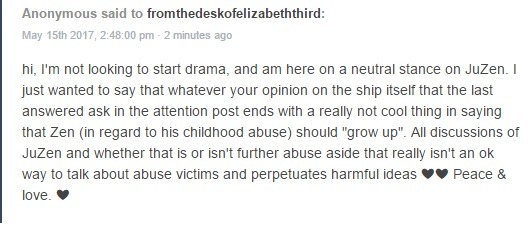
-Dipshit on my blog in that exact same time frame? Check

-Not my ask but trying to pull the high ground with me about it anyway? Check
-“Please consider the abuse victims!!1″ To a survivor? Check.
-Sending a really questionable anon in general? Check.
After my response saying that if I received any more messages I would reply with their URL, Serena got a message from Dipshit, complaining that I should apologise to their friend
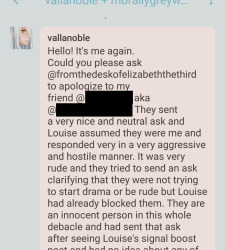
for blaming them for things Dipshit had done.
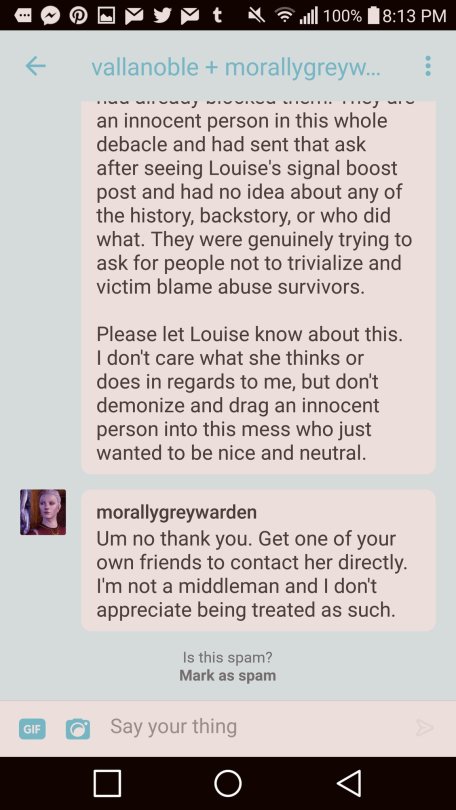
This earns the biggest of sighs and rolliest of eyes from me and there are hundreds of things I could say about it, such as the sheer unlikeliness of a random mysme blogger I have never heard of before (and incidentally never blocked) showing up to send me an ask with the precise same objections as Dipshit while Dipshit is on my blog, all while having no involvement with what Dipshit is doing. Even Dipshit acknowledged they were friends and went so far as to link their Zen centric blog.
They later post the following screens to their blog, which confirm that they sent these

asks to Stars and encouraged another person to send more: 1
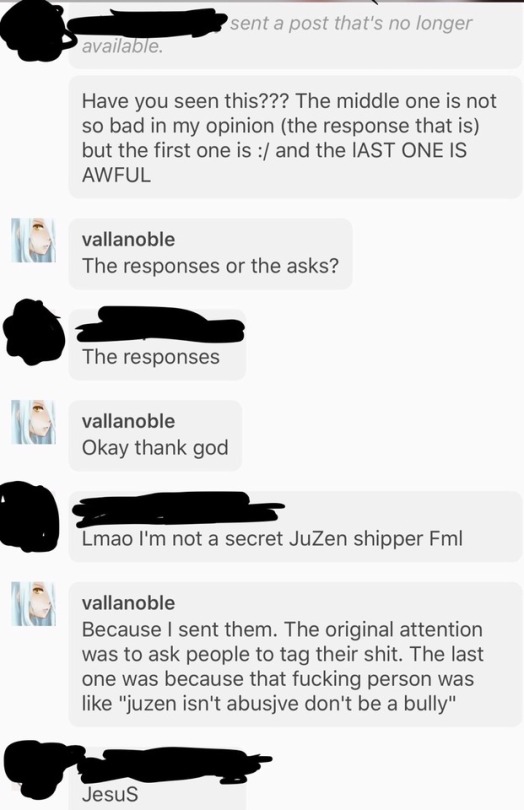
,2
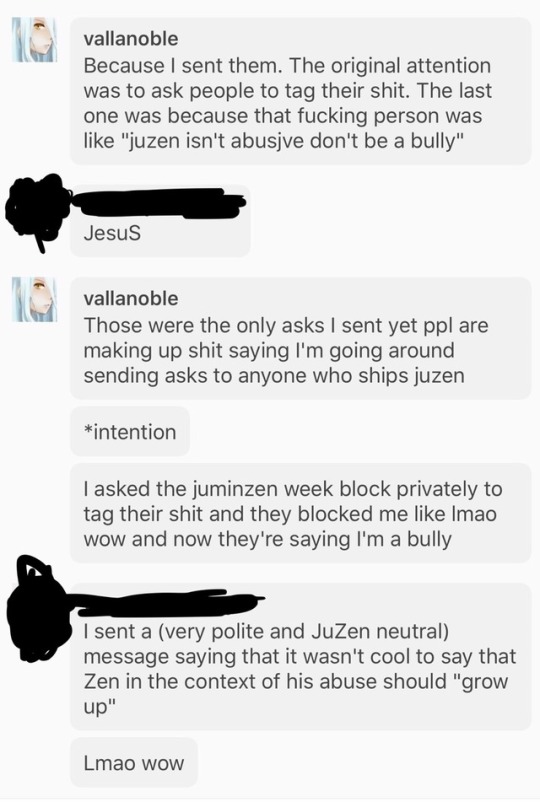
,3
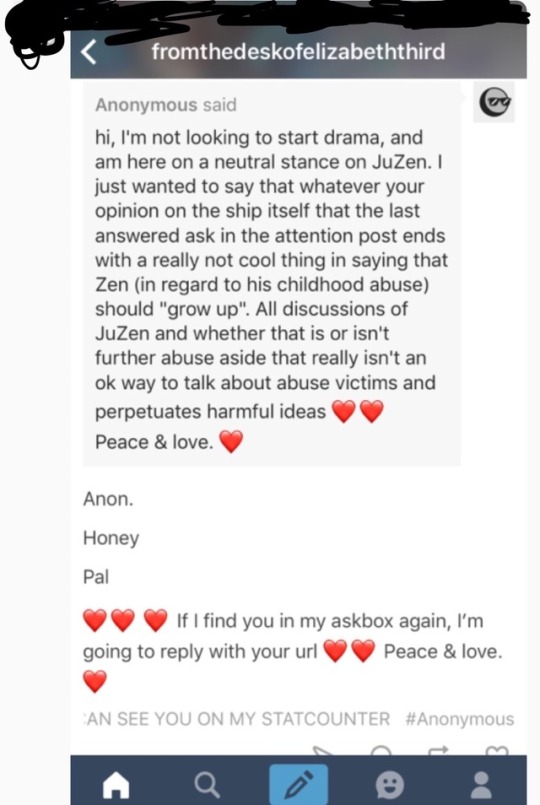
,4
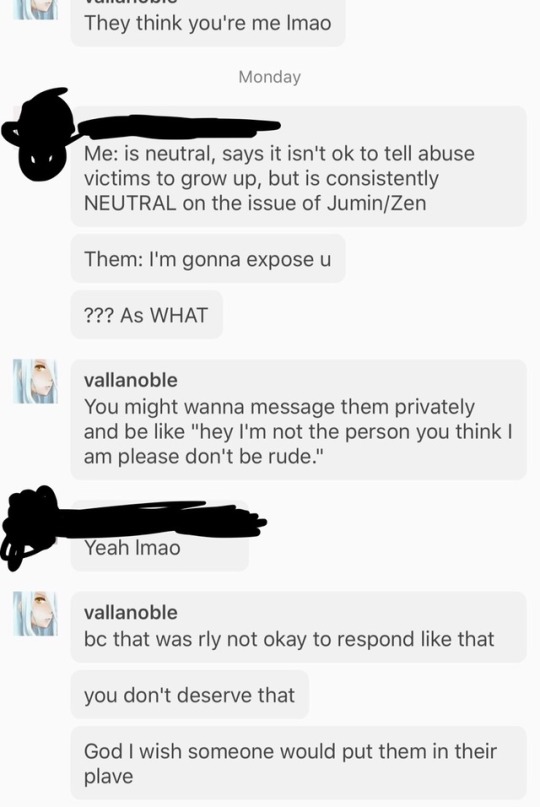
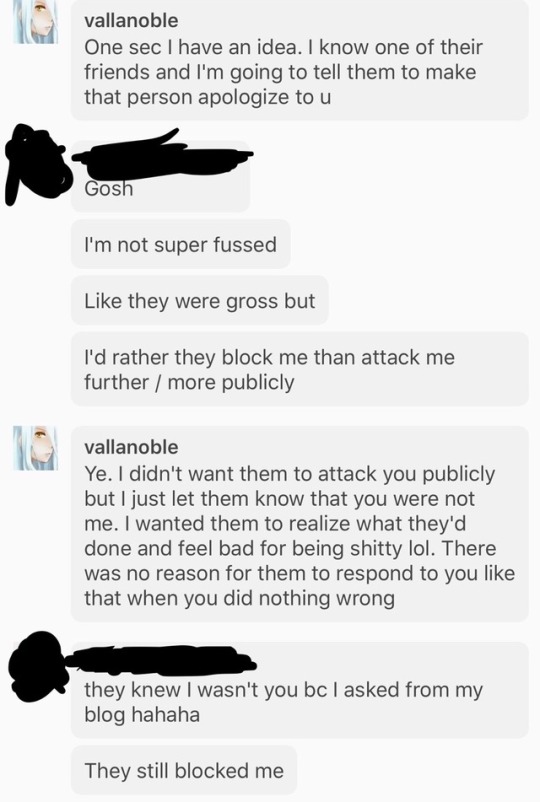
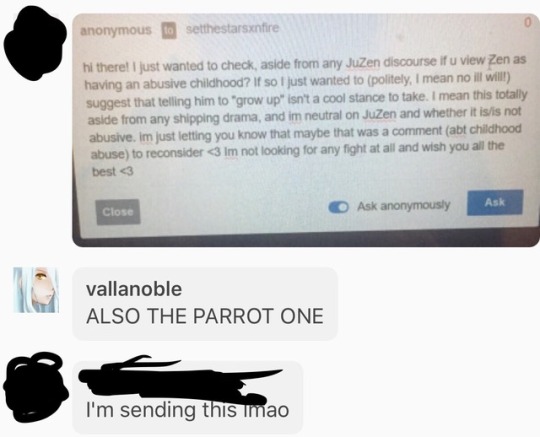
Also. This is what a receipt for blocking looks like.

However, if a chat is what’s going these days, here’s a chat

between the mods of JuminZen week
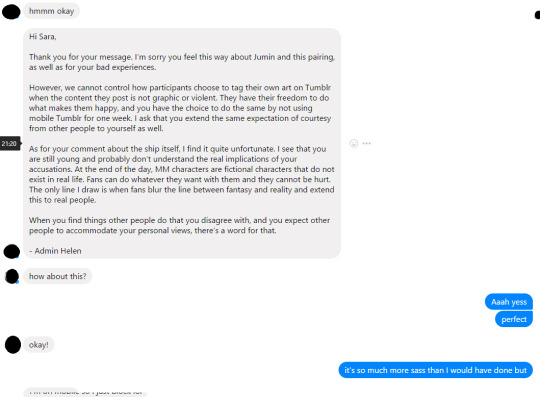
discussing whether or not to block

Dipshit, drafting a response and discovering they were already blocked,
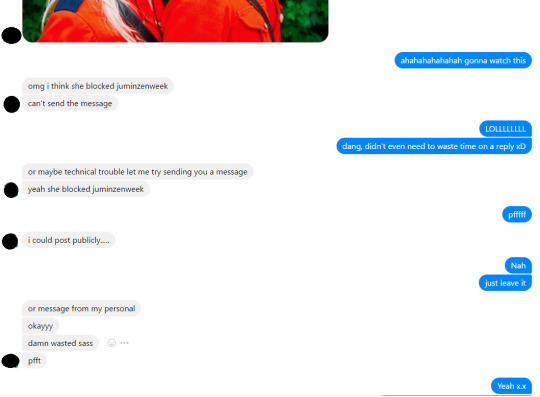
as forwarded to me by mariamagica <3
I’m especially interested by the use of the word “demonise”. Demonise only makes sense in terms of me addressing Dipshit and publishing their URL, neither of which have anything to do with their friend…who up until that message was anonymous in this conversation.
User setthestarxonfire also receives two
https://setthestarsxnfire.tumblr.com/post/160705202992/hi-there-i-just-wanted-to-check-aside-from-any
https://setthestarsxnfire.tumblr.com/post/160706326042/thanks-for-your-kind-response-and-for-being-so
asks about this in much the same vein with identical phrasing. (screenshot one) (screenshot two)
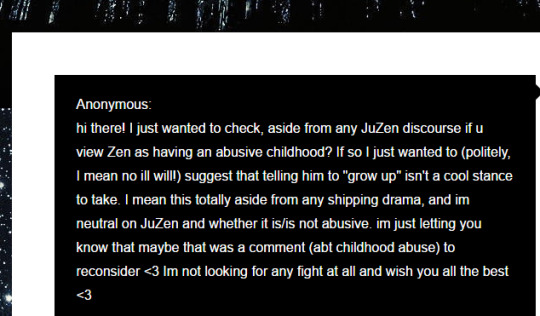
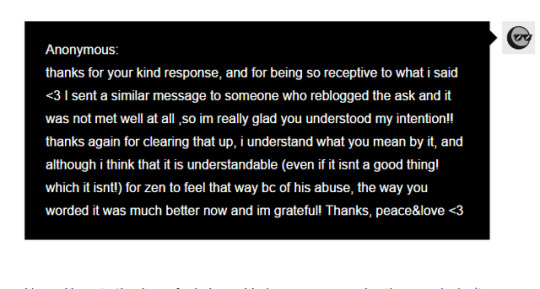
You may recall I referenced user capitolscum. That is the personal of mmscum, who I was also in touch with at this time. Through the reblogs of my Attn:-Mysme fandom post, I became aware that they too had received strange anons.
As it happened, Scum had received three anonymous asks. One
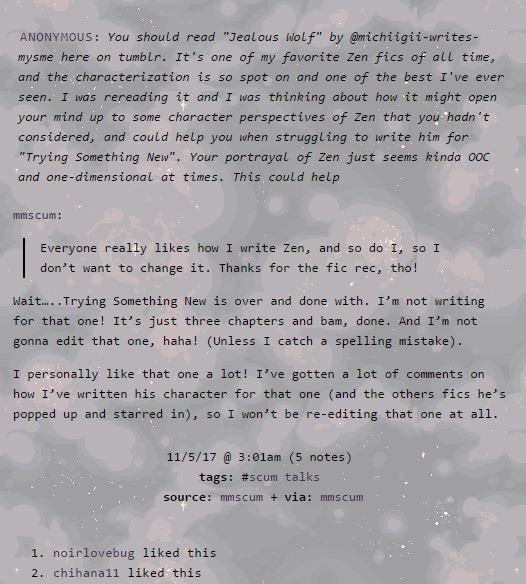
, Two
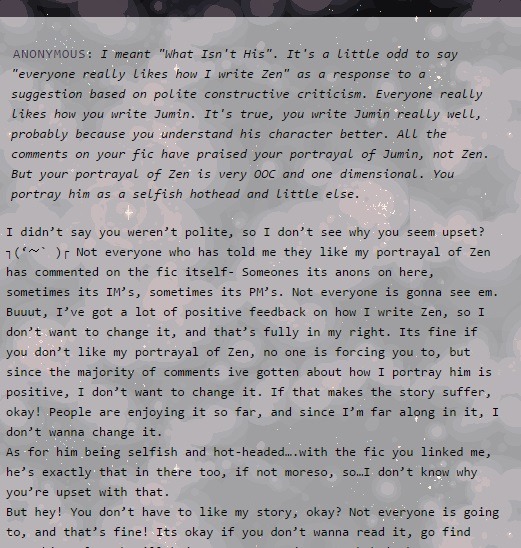
and Three
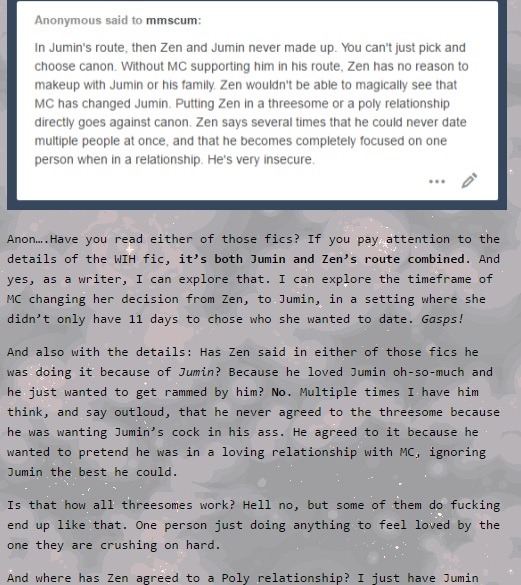
(Links: One, Two and Three)
https://mmscum.tumblr.com/post/160542799049/you-should-read-jealous-wolf-by
https://mmscum.tumblr.com/post/160544142294/i-meant-what-isnt-his-its-a-little-odd-to-say
https://mmscum.tumblr.com/post/160556930029/anonhave-you-read-either-of-those-fics-if-you
This prompted the following essay:- 1,
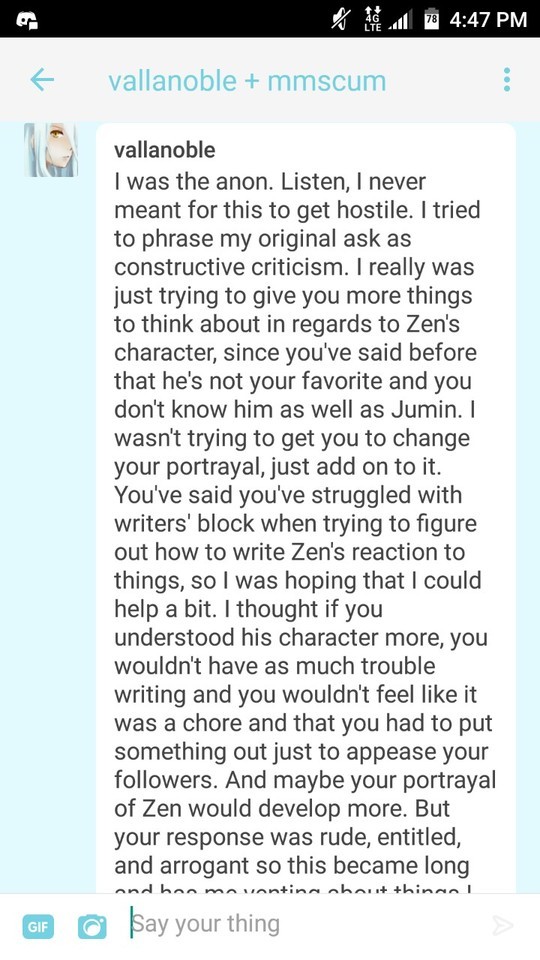
2,
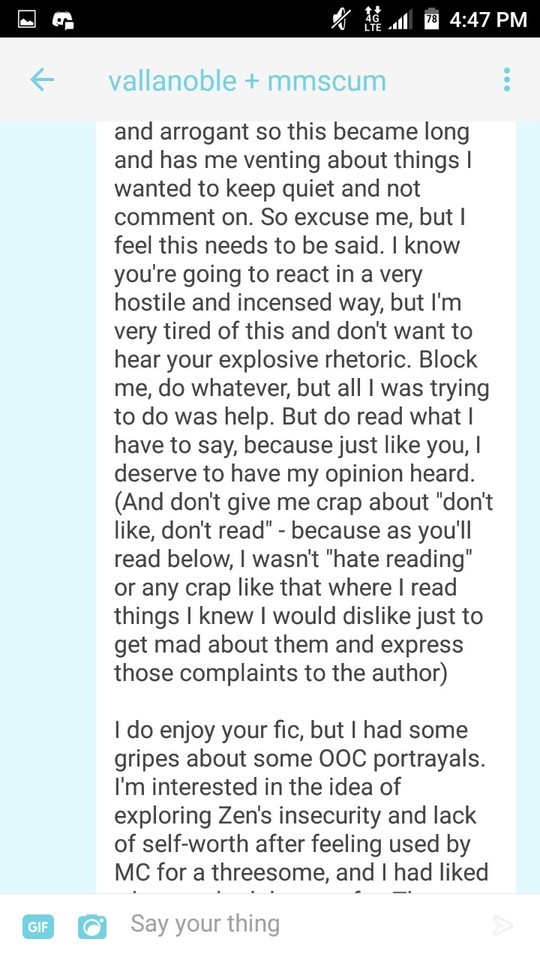
3,
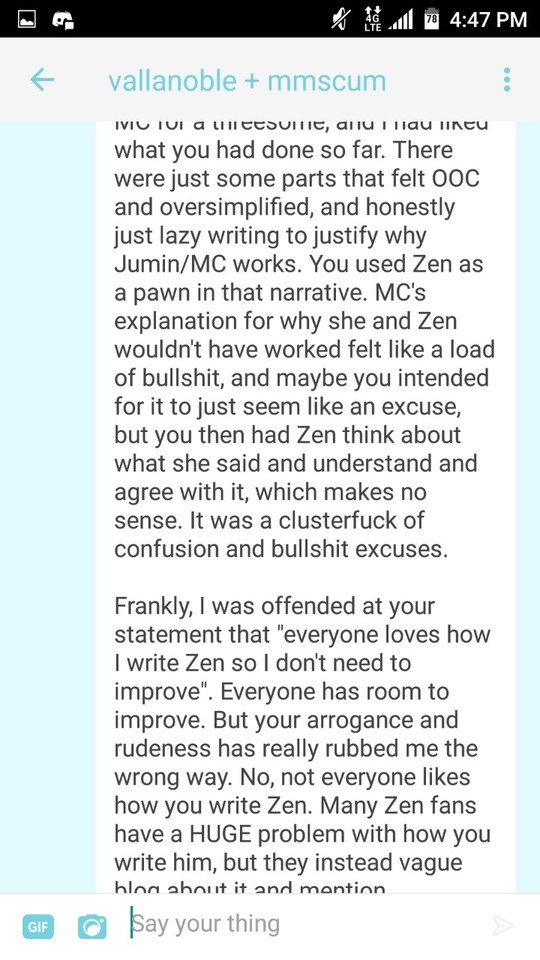
4,
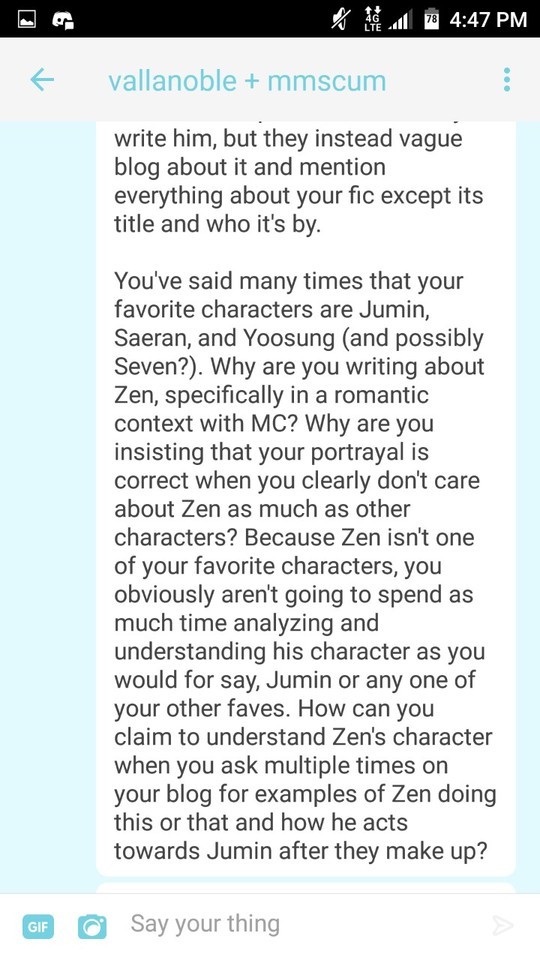
5,
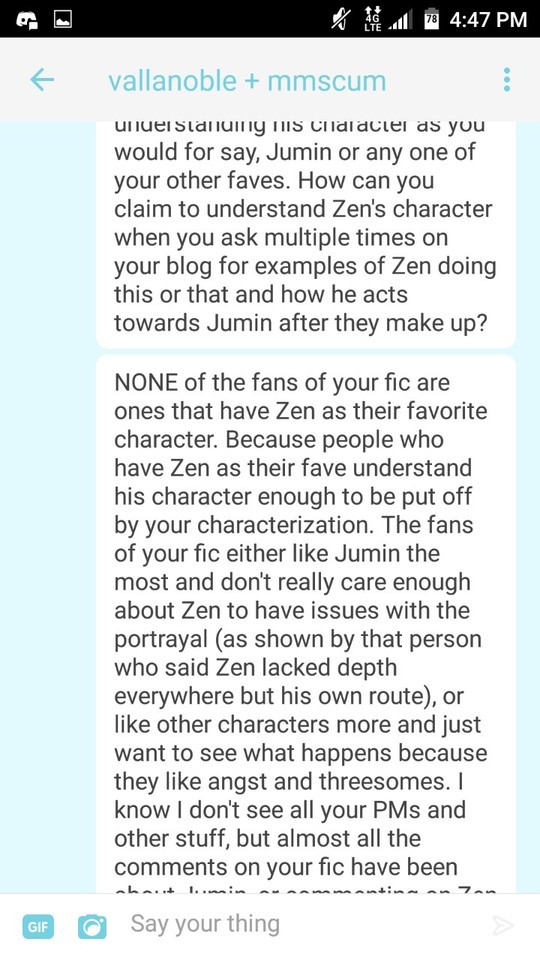
6,
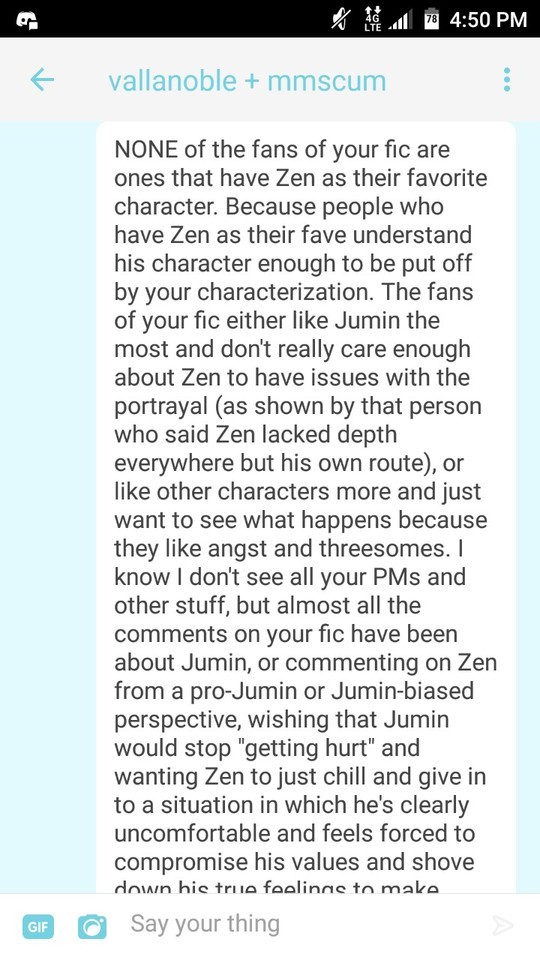
7,
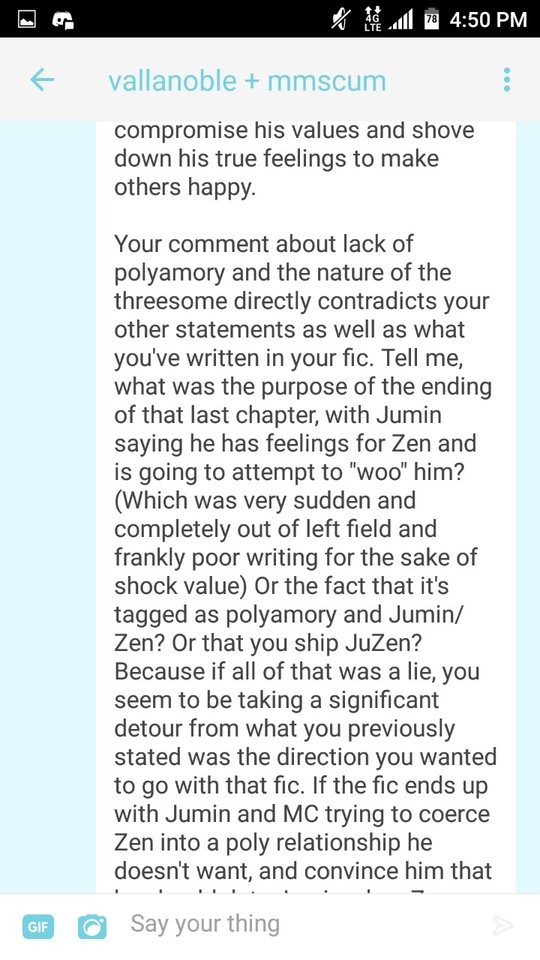
8,
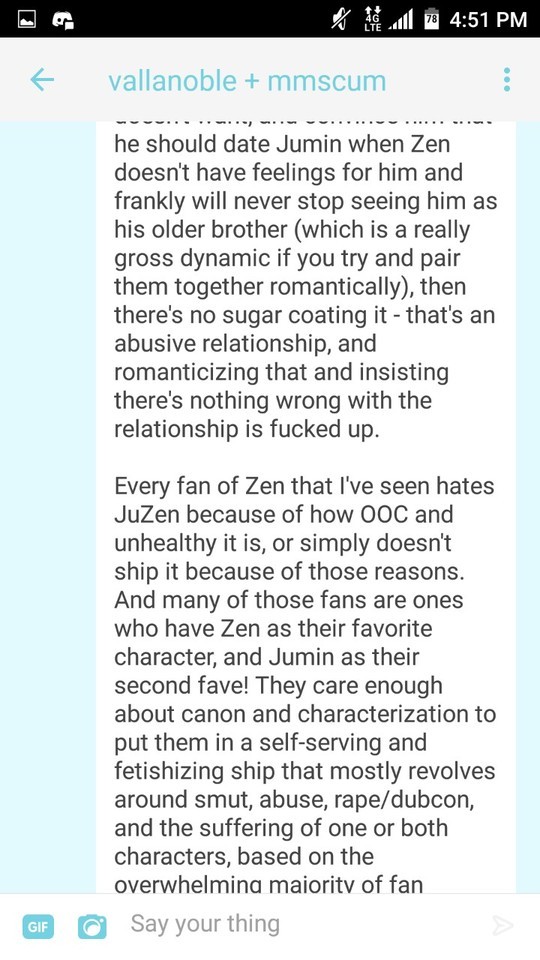
9,
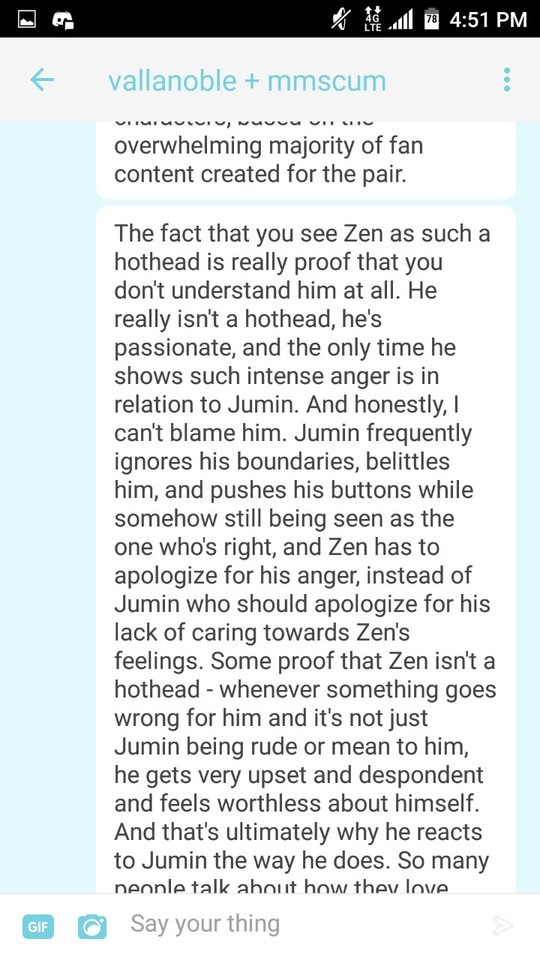
10,
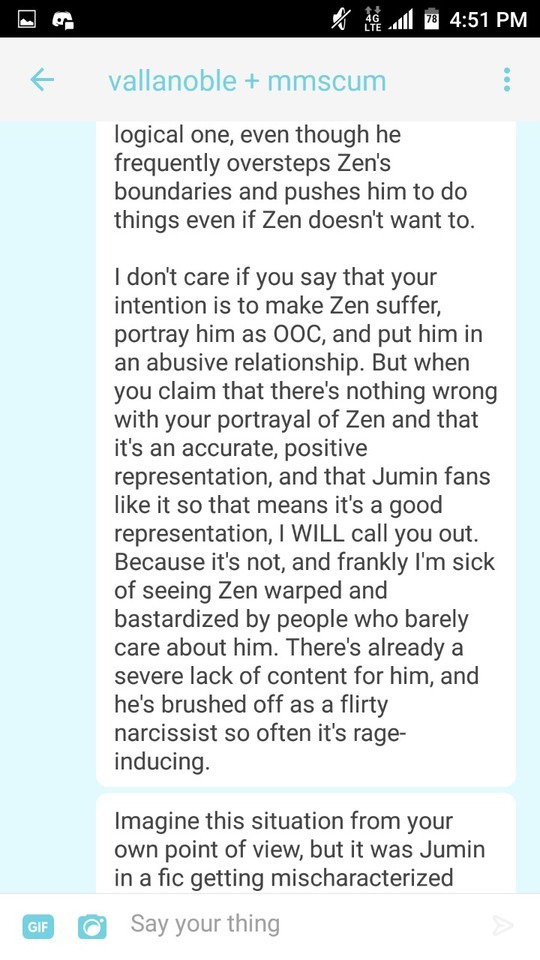
11,
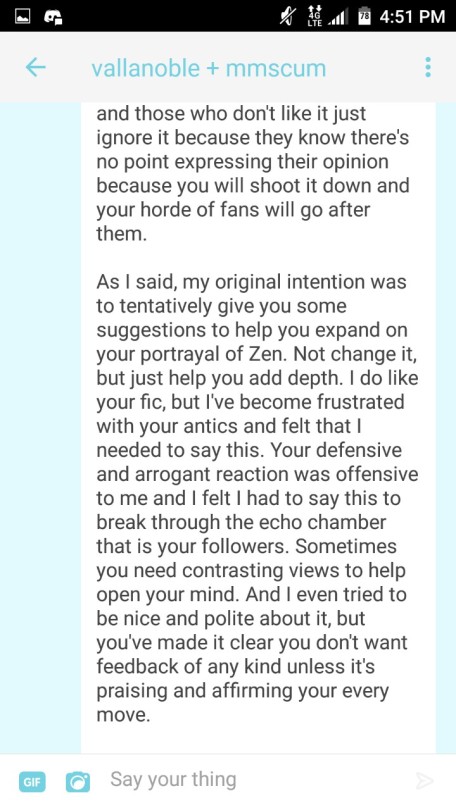
12
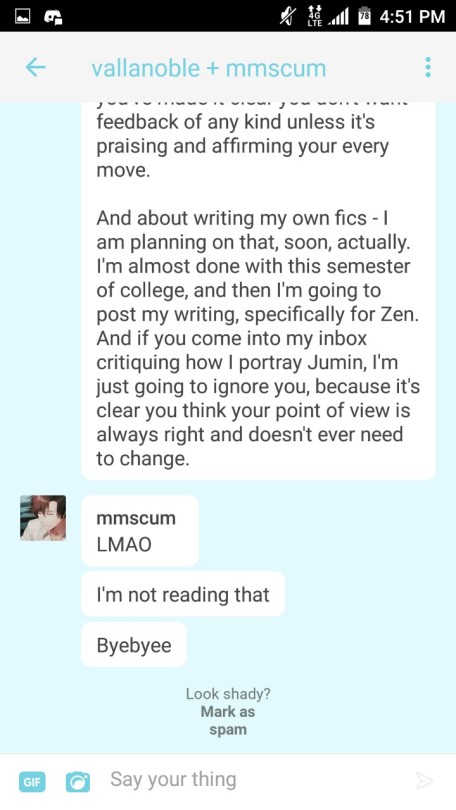
Which corresponded with this review on AO3 (Please zoom)

This coincides with this ask
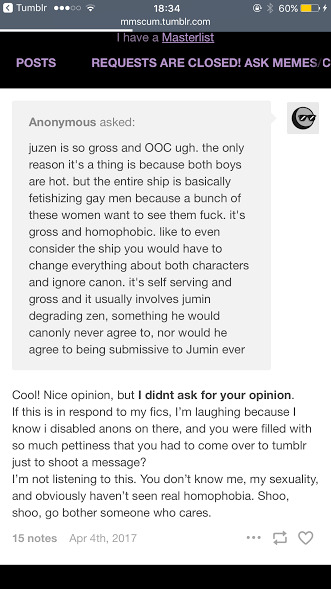
and this response from Scum (part one and two)

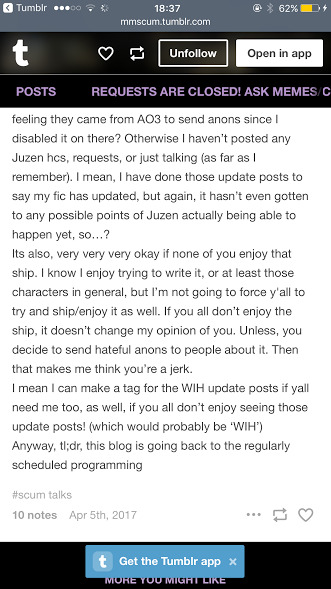
It also prompted this chat (part one)(part two)
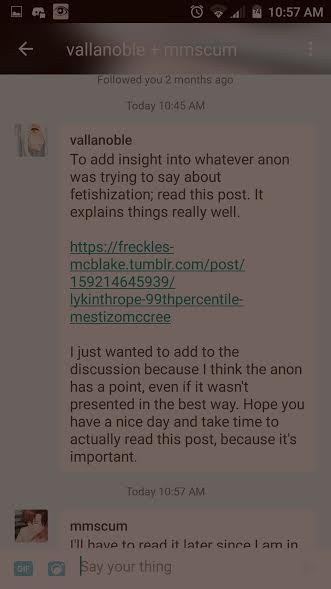
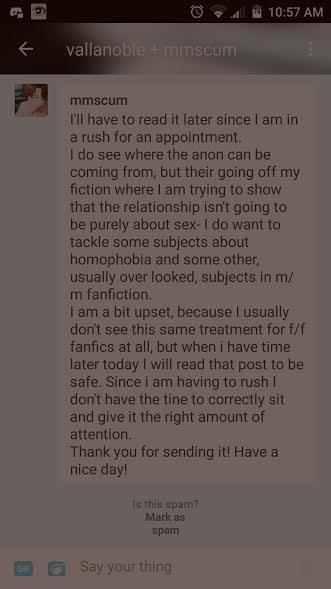
I’m including this chat for the sole reason that this is how Dipshit described it post call out
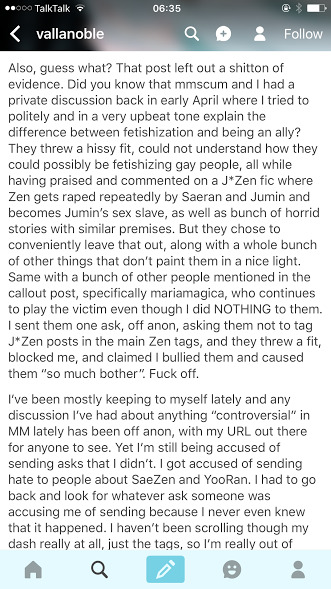
It’s unclear what exact fic Dipshit is referring to, though Scum believes the comment they’re referring to is this one, on a fic exploring Zen’s recovery as a survivor of a traumatic incident prior to the first chapter.
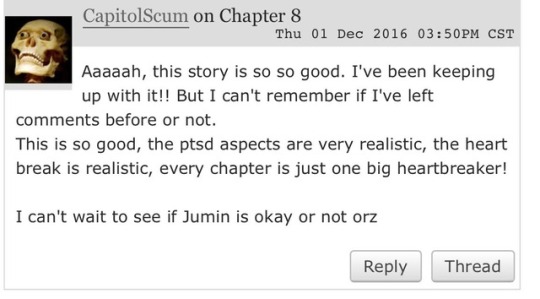
There’s also this post
https://mmscum.tumblr.com/post/160144676634/i-love-my-followers-but-this-is-the-first-time
addressing negativity in fandom (screenshot here),
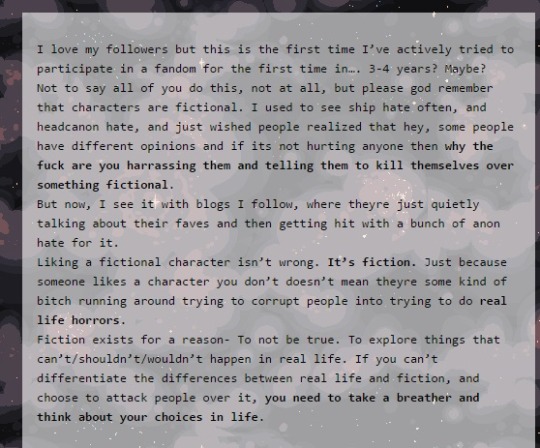
to which Dipshit anon responded twice (one, two)
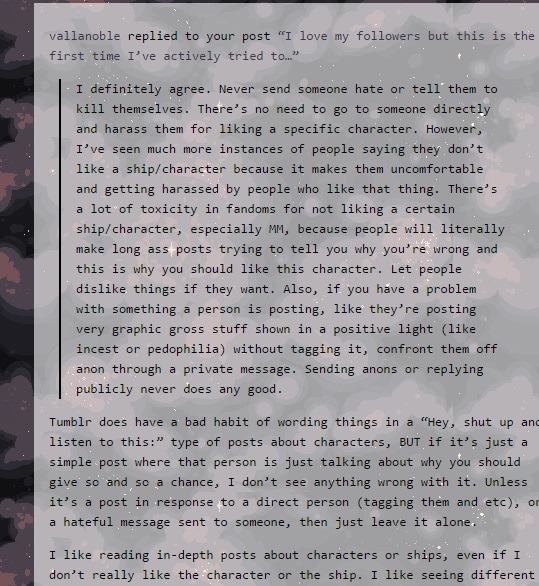
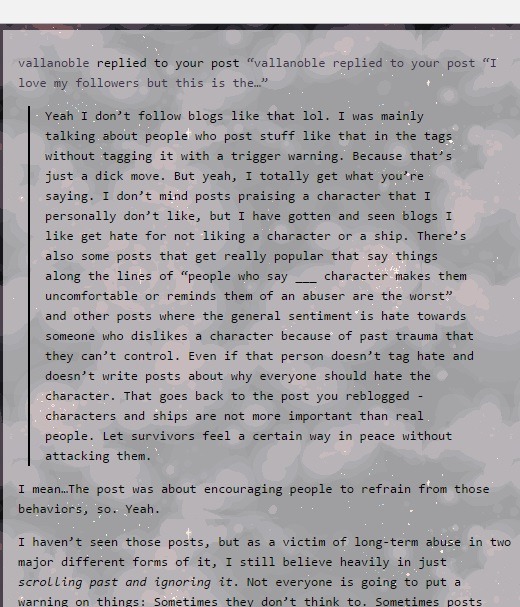
(links)
http://mmscum.tumblr.com/tagged/vallanoble
I’m including this for the sheer ridiculousness of the fact that it happened two weeks ago and shows them discouraging their own behaviour.
Scum, post callout, received this review on the same fic
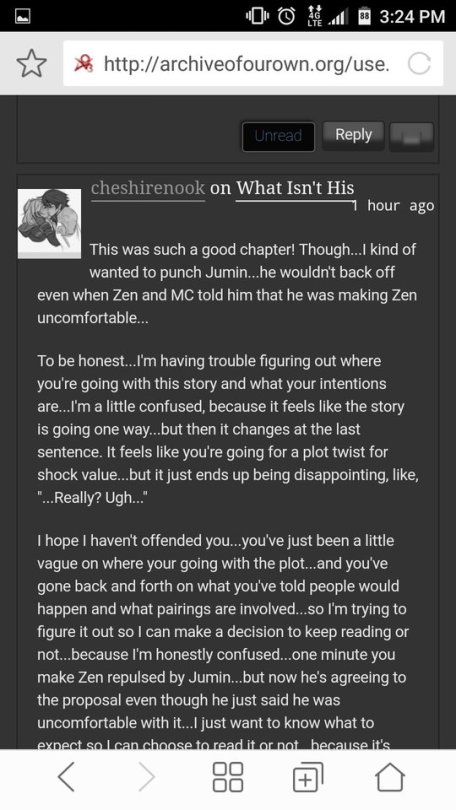
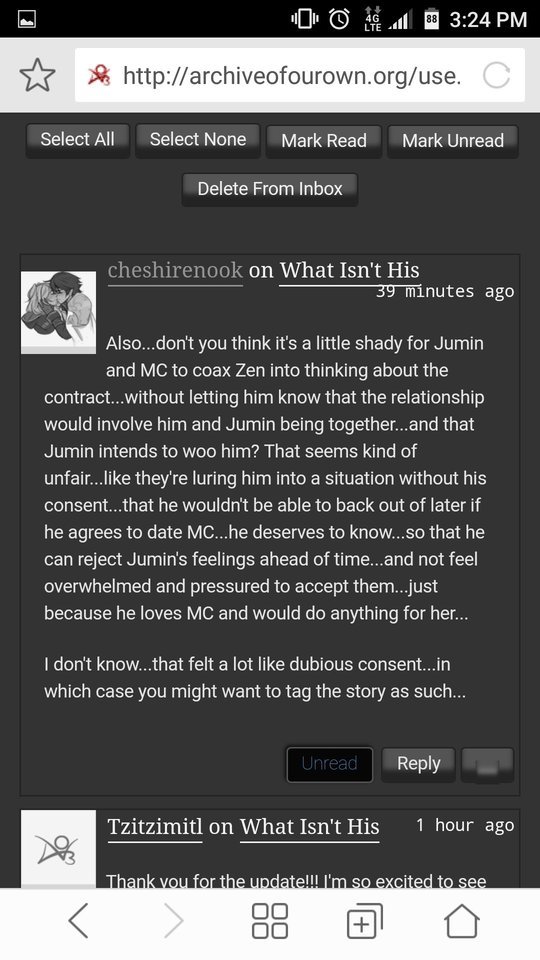
Considering both the linguistical patterns and the complaints both matched Dipshit, we did a bit of investigating and if this is a coincidence it’s a very unfortunate one.


And now we arrive at the 16th of May.
Void gets notifications from Dipshit

and their reaction
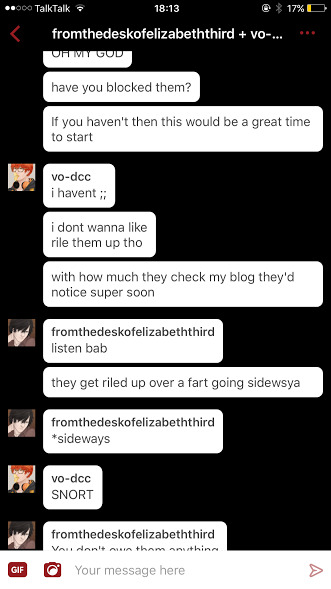
speaks for itself.

Remember this?

Void is 17. Younger than Dipshit and a minor.
I have

multiple visits

from

Dipshit that day (Is it worth me even saying it at this point? Whatever)
Here is Mariamagica’s traffic for that day (All of the ones from the university are Dipshit)

17th of May, today!
Dipshit

is active

on my blog and Void’s

(The one blacked out the most.)
Scum passes on their statcounter data to me and Dipshit is not only a visitor
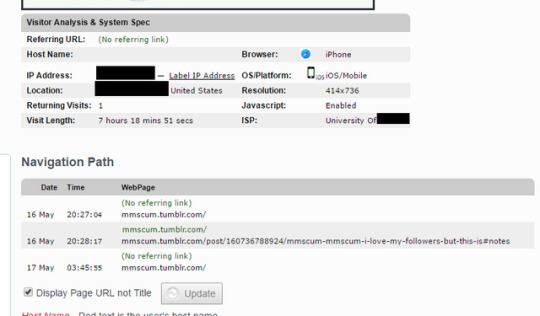
but recently went through the notes of this post
http://mmscum.tumblr.com/post/160736788924/mmscum-mmscum-i-love-my-followers-but-this-is
which somewhat ironically was partially inspired by their actions.
Considering this fact and the fact that they visit my blog in the wake of this reblog
http://fromthedeskofelizabeththird.tumblr.com/post/160765050395/fandom-commandments
(statcounter)

their subsequent blog post becomes slightly more interesting.
(Screenshot one)
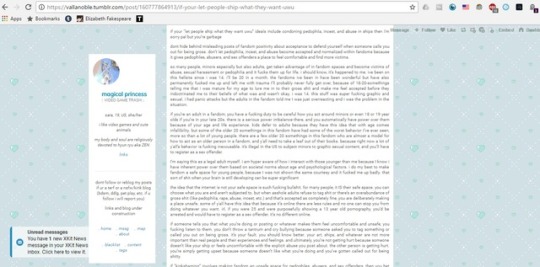
(Screenshot two)
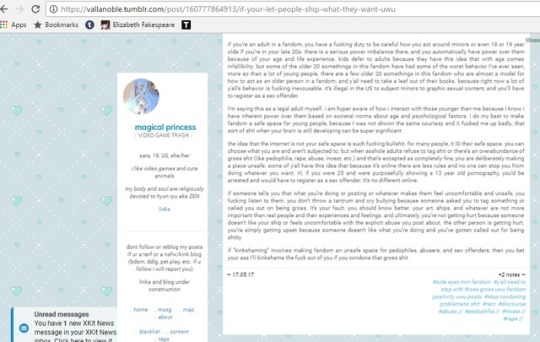
(link to post)
https://vallanoble.tumblr.com/post/160777864913/if-your-let-people-ship-what-they-want-uwu
It’s past midnight now and I’m about to go to bed. I have only one thing to say on this matter, however.
The adage that the internet is not your safe space is not a suggestion that it should not be safe. It means that the internet is not the safe place of any individual person. It belongs to all of us and there is going to be opinions, ships, characters etc you do not like personally. But it is NO ONE’s job to keep you safe but your own. It’s nobody else’s responsibility to write characters as you see them. It’s no one else’s job to keep the content you don’t like off your radar or create the content that you do. There’s no justification for treating real people badly over fictional things.
A few other notes post call out:-
Dipshit remains blocked. Here is a screenshot of a message they sent to me the day after I posted the call out (part one)

(part two)
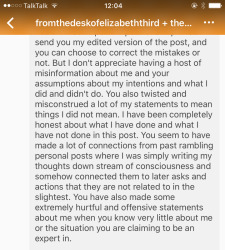
from a new blog designed to collect receipts (this is not hyperbole: screen shot one
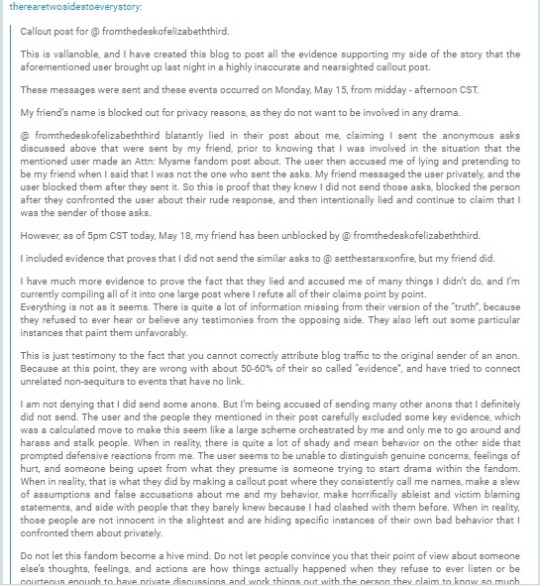
and two
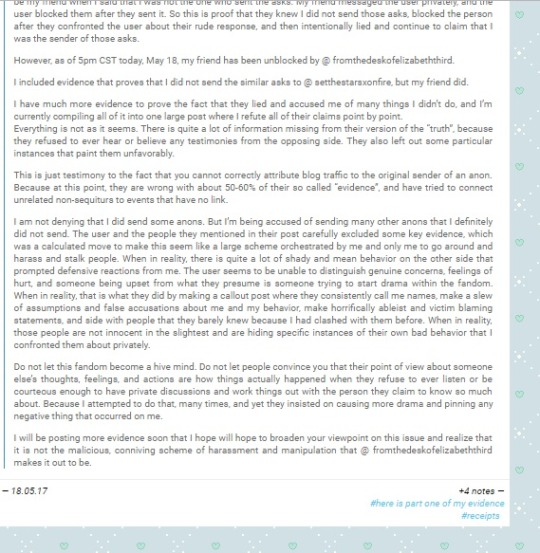
). This blog has since been deleted.
I am not a shipper of Juzen and so bad behaviour within the community is not something I would know of immediately or in much depth, however:
Dipshit considers an anti Juzen week to educate the homophobic women who ship it.
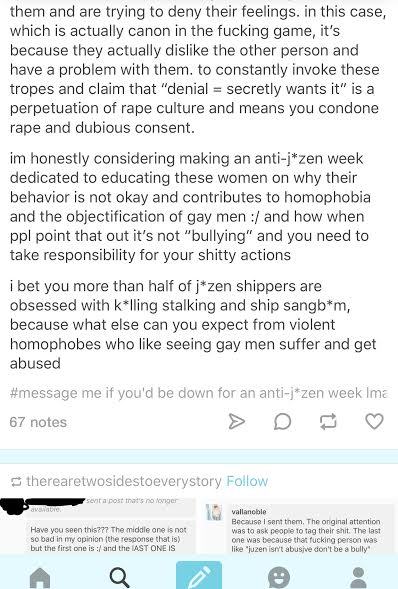
This is an interesting one, as it coincides with the appearance of the blog juzenisgross, which specifically posted excerpts from Why does he do that (a book about abusive relationships and domestic violence) in the juzen tags on the first day of juzen week.

This is a loose thread on its own. However. This is the time stamp of the first post on the blog.

This is Dipshit on my blog.

Once again, possibly coincidence, but incredibly unfortunate if so.
Here is Dipshit continuing to send lengthy messages to content creators 1,
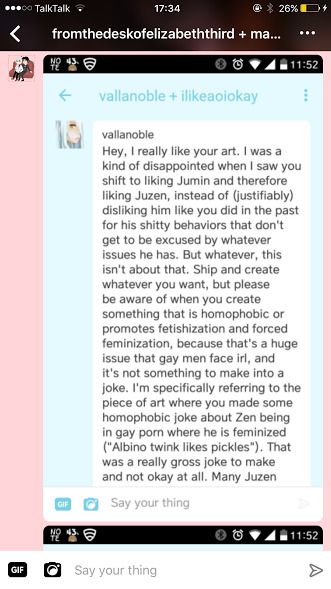
2,
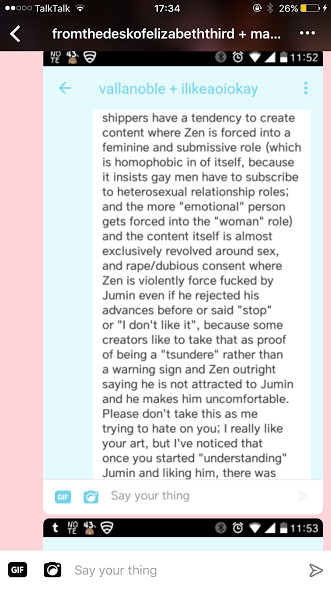
3,
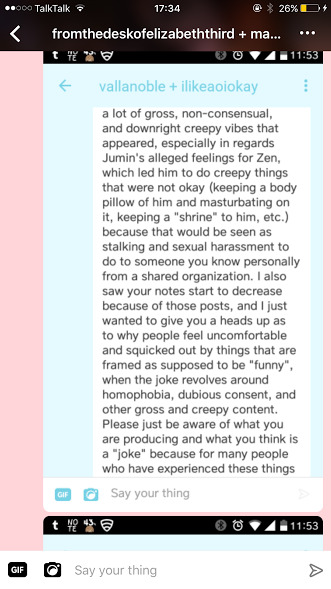
4,
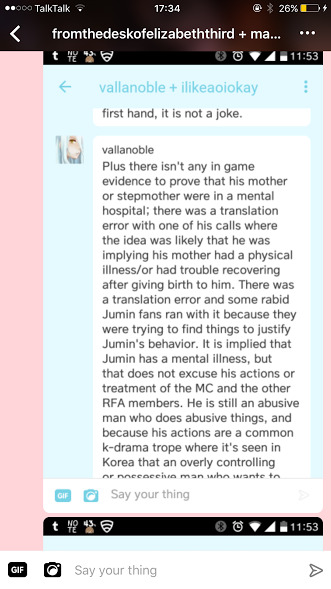
5,
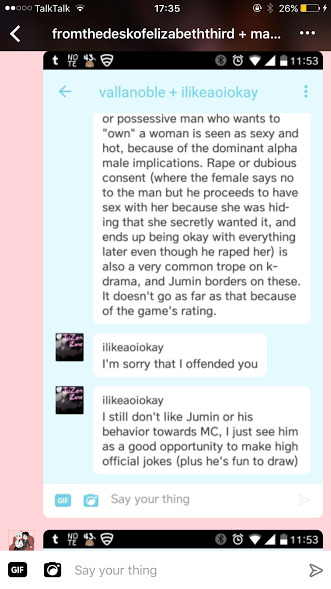
6,
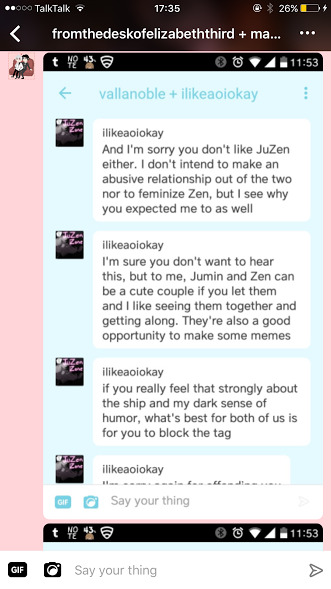
7

along with her refusal to blacklist tags
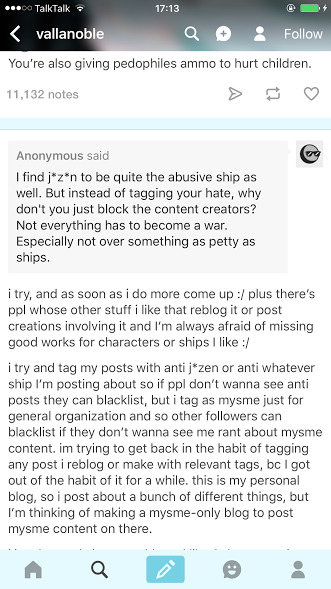
354 notes
·
View notes
Text
(Submission)
Nerd here: Regarding this convo, some anons say that Bruno knew that Camilla was racist and still brought her on. Those are NOT facts. Where did that idea come from? A lot of us didn't know that she was racist until today. Many of us barely knew who she was. I myself didn't know until I did the research and pulled receipts. So if many of us didn't know about her, how can you guarantee that Bruno knew? I'm gonna give Bruno the benefit of the doubt that he didn't knew and was unaware of this girl. Bruno faced racism in the industry himself so I doubt he would bring on someone who he KNOWS is a problematic racist. We never seen him do that before. So this time, he probably was just naive. About Bruno citing Elvis as an inspiration and giving him props. Well of course he is! He literally started out impersonating the guy. They had a whole family band with him doing the Elvis impersonation as a main act. That's how they paid their bills. Bruno would be lying if he said he wasn't inspired by Elvis. But of course he was only inspired by how he performed and all the stage performance. But I think as Bruno got older he realized the bad side of Elvis stealing black music and not giving credit to blacks and making the crappy comments about blacks. So of course Bruno does the exact OPPOSITE by writing and producing his own songs. And purposely working with Black producers and writers and crediting black people every time. A prime example is how in "Uptown Funk" Trinidad James is getting credited and that man is getting royalties off that song for the REST OF HIS LIFE. That man will never starve cuz he'll always get paid every time people play "Uptown Funk" which is one of the most popular songs of this decade. And Bruno is not only inspired by Elvis but he's also influenced by Michael Jackson and has stated many times that in terms of all around entertainment, Michael is his main inspiration cuz he did it all with the dancing, music videos, his songs etc. And Bruno also used to be a Michael impersonator as well. And to this day you could easily see Michael's influence in Bruno. And nowadays Bruno doesn't even mention Elvis anymore. And I don't consider Bruno a vulture because he's literally been singing black music since he was a baby. It was always his dream to sing and now he's living out his dream. Just like me, I'm a black woman who draws in Anime style. And we all know Anime is Japanese, but I'm not stealing Japanese culture cuz I'm not pretending like I'm doing something new, and I always give credit to the Japanese pioneers and innovators of the art style like Tezuka and Miyazaki. And I've literally grew up watching Anime and reading Manga. And loved it so much that I'm doing this myself. So just like my love for Japanese animation, Bruno's love for Black music is real and he loved it so much that he's still doing it now as his dream job. For the issue of why he still went on to sing "Perm" at the BET awards. First of all BET told him to sing the song and personally invited him to the show and I remember when we had the convo about it, an anon said that if it's not good enough to sing at the BET awards, then he should not have made that song in the first place. They said something like that. So maybe Bruno felt like the song IS good enough to sing in front of Blacks because he KNOWS he's not being racist. Also Bruno was getting hate anyways even BEFORE he performed so maybe he felt like he might as well go all the way through since he was getting hated on anyways no matter what he does. Just my opinion I'm not in Bruno's head. For the last topic of if Bruno said the word "nigga" I would be sad and disappointed, and I would have to abandon him then because at this point in the game, he knows good and well that word is offensive. And yes I know Bruno has some black in him but he doesn't identify as a black person. And he's mixed with a lot of ethnicities as well. And yes I know Puerto Ricans in New York call THEMSELVES "nigga" all the time. I'm originally from the Bronx so I know. I know we all in the same hood but It's still kinda weird when they say it. But Bruno is NOT from the Bronx, he's not from New York at all so there's literally NO excuse for him to say it. But I never heard Bruno say it, or Tweet it EVER. In his old videos BEFORE he became famous, in those old MySpace posts, his old tweets, in his unreleased songs, Bruno NEVER said the word "nigga" and I'm so happy for that. And he's never disrespected black people or black women. Unlike some of these other celebrities like ASAP Rocky saying that dark skinned black women don't look good in red lipstick and that the Black Lives Matter movement has nothing to do with him and that he basically doesn't care. And Kodak Black completely DISRESPECTING black women every time you turn around. Bruno never did any of that. And I never heard him say nigga. I would not be here as a fan if he was like that. Bruno is not perfect, he got problems. But he's NEVER disrespected us. He's got a clean track record with that. And I love Bruno for that. ❤️
5 notes
·
View notes
Text
Creating Puentes Transcript
Megan Figueroa: Hi, and welcome to the Vocal Fries podcast, the podcast about linguistic discrimination.
Carrie Gillon: I’m Carrie Gillon.
Megan Figueroa: I’m Megan Figueroa. It’s July. And we’re here.
Carrie Gillon: Wow. So many things. Yeah, this is very overdue.
Megan Figueroa: But luckily our listeners are very lovely and understanding.
Carrie Gillon: Because a bunch of things happened.
Megan Figueroa: Yes. COVID, of course, just COVID and that general COVID stuff and living in this world right now happened. And then we were ready to record an intro and then my beloved Rilo gets very sick. So, I’ve been dealing with that. And then I turn a year older, and then my aunt dies on the same day. I’m still dealing with getting Rilo healthy, and I got a puppy. It’s all very stressful. The puppy’s the good news in all of that. I shouldn’t really lump her into death and sickness.
Carrie Gillon: It’s true. But she’s still a puppy. That’s very stressful on its own.
Megan Figueroa: On its own. It would’ve been good stress any other time. Right now, sometimes it feels too overwhelming, but then you remember it’s a puppy and the puppy actually makes you feel better about their own pee and vomit. [Laughter]
Carrie Gillon: Oh, boy. Yes. Baby animals are so cute.
Megan Figueroa: They’re so cute. I drove by the zoo. No one’s there, obviously, but apparently there’s new baby meerkats at the Tucson Zoo. I’m like, ah! I wanna go see the baby meerkats. It’s just like –
Carrie Gillon: Me too!
Megan Figueroa: – COVID is ruining something else. But, yeah, all of this is happening to me. I missed just an amazing amount of stuff on linguist Twitter. Just being a linguist right now, I’ve missed a lot.
Carrie Gillon: Yeah.
Megan Figueroa: Tell me a little bit about being a linguist on the internet right now, Carrie.
Carrie Gillon: God. So, as you know because you signed it too, there was a letter going around asking for Steven Pinker to no longer be listed as a media expert on the LSA. He was one of only two that were listed for “General Linguistics.” And the man doesn’t even do linguistics anymore, as he freely admits, so even for that reason alone he should be taken off, but no.
The letter was mostly pointing out a bunch of tweets that, at best, could be characterized as clueless and at worst could be characterized as racist. It’s just kind of exploded. Of course, there’s another letter that people are calling the “Boomer Letter,” [laughter] which –
Megan Figueroa: The Harper’s Letter, right? That’s the Boomer Letter.
Carrie Gillon: No, no, no. The Harper’s Letter is actually not rel – it’s related in terms of themes, but it’s not related to what’s going on in the linguistics world. The Boomer Letter is David Pesetsky wrote this long Facebook post in consultation with Barbara Partee and someone else that I don’t know.
I think the intent was, “We support our junior colleagues” – [sighs]. There’s this sense that it’s mostly junior colleagues who signed the Steven Pinker letter saying he should not be a representative for the media and also, he should not be listed as a fellow, but those are two separate things and it doesn’t matter. At least one of these things should be done immediately, LSA [coughs], but whatever.
Megan Figueroa: Exactly.
Carrie Gillon: So the Pozesky letter – Pozesky, Partee, and I don’t know, whoever the other one is. I think the intent of the letter was, you should not be harassing our junior colleagues. We don’t agree with the letter but don’t harass them. I [sighs] – if they had just focused on the stop harassing them – regardless of whether you agree with the letter or not, you shouldn’t be harassing them – I could’ve very easily been like, “Yes, of course people should be signing this letter.”
Unfortunately, it spent so much time explaining why they didn’t sign it and why the letter was bad and wrong and all these things. It just kinda shoved people under the bus while they were supposedly supporting them. It didn’t look good. That’s why it’s been called the “Boomer Letter.”
Megan Figueroa: That’s amazing. I didn’t see this letter, nor did I see reference to it as a boomer letter, and that’s amazing. Is it so wrong, people, for younger voices to come up and say, “We are the future of this organization and this field. Steven Pinker doesn’t even talk about this stuff anymore. We want other people to be able to talk about this stuff”? It’s not unreasonable just that fact about it.
Carrie Gillon: And also, it’s not really a fair characterization. I would say that there’s a tendency for people to have signed the Steven Pinker letter, the original letter, to be younger, more junior, not tenured, all these things. That’s a tendency, that is true. But there are certainly tenured professors who also signed that letter, like David Adger. It’s not as clear cut as some people would like to make it out to be.
But I agree. Younger people should have more of a say than they have had up to this point. The LSA is doing a very bad job of responding to it because first they were kind of like, “Well, we support everyone has academic freedom and they can say what they want, basically, but we also don’t like racism.” It’s like, well, which is it? You have this statement about how there are racial disparities, and that those are bad, and we should work for racial justice. You can’t say that while at the same time saying, “It’s fine if Pinker speaks for us.”
Megan Figueroa: Right. Because even though, I mean, a lot of people were saying that the letter didn’t properly – or they were trying to dispute the fact that Pinker says racist or does racist things and all this stuff. There’s so many receipts on the internet about Pinker’s into race science. He peddles that shit. I’ve been saying it on Twitter for so long. We’ve even talked about him on the show about saying don’t listen to Steven Pinker because he’s problematic as fuck.
Carrie Gillon: He’s obsessed with IQ, which you have pointed out and, again, definitely said many, many things that I think are completely racist. But even the most charitable thing you can say is that he’s completely clueless about how the world actually works. That’s the best-case scenario. Is that who you want representing you?
Megan Figueroa: Exactly. We’re not even on that list, right? There’re people like you and I who do more stuff that might be, maybe media would want to reach out to us because we’re trying to be public-facing linguists who are putting linguistic work out there. We’re not on there, but Steven Pinker is.
Carrie Gillon: I mean, I don’t know what’s gonna happen, but right now, I do not want to represent the LSA. I don’t want anything to do with the LSA right now. If they come around, then we can have a conversation. But could you imagine if we were the faces of the LSA right now how embarrassing that would be?
Megan Figueroa: I’m so grateful that we’re not in any way affiliated with the LSA. I actually realized that I didn’t renew my membership because of money issues, so I was like, “Oh, that’s why I didn’t get the letter from the LSA because I’m not a member.”
Carrie Gillon: I haven’t been a member for a few years. Supposedly – I mean, I have no reason to doubt this – but supposedly John McWhorter told Michael Powell from the New York Times to contact me about the letter because I was one of the signatories. According to Michael Powell, he had reached out to a bunch of linguists and basically everyone had said no to him.
This was after we talked for a while. We’ve been talking for a while. So, it's kind of the end of the conversation. He was like, “I just don’t get it. If you put your name up there, then why wouldn’t you wanna talk to me?” And I was like, well, because I think people are afraid of harassment. It’s one thing to be listed on a letter, but then if you’re actually in the New York Times, then how much more attention will you get? I don’t know why but he did not quote me at all.
Megan Figueroa: Really?
Carrie Gillon: Even though we talked for 20-30 minutes. Yeah. The article just came out today and nothing. Which is good because I was not looking forward to the harassment.
Megan Figueroa: Well, we’re kind of getting some right-wing trolls harassing the Vocal Fries on Apple, iTunes, right now.
Carrie Gillon: Yeah. But that was before.
Megan Figueroa: Yeah. This is different. But it’s like, I wonder what else it could possibly bring if we spoke out – and we are speaking out against Steven Pinker. We’ve also said that John McWhorter is problematic as fuck, too. And they’re BFFs right now in this fight, this linguistics fight.
Carrie Gillon: They’re very good – good friends, sorry. McWhorter is heavily quoted in this article, which is unsurprising, but I did think that at least one person who had a problem with it would be cited besides Adger – so David Adger, something he wrote on his website is quoted, not him directly because he didn’t talk to the reporter – and Byron Ahn just wrote a tweet and the guy quoted his tweet and that was it. He didn’t quote me who actually did talk to him. I’m like, very curious why. I was worried because I knew that if I was in this the Vocal Fries would get a lot of flak and I was like, “Oh, no! We’ve already had so many” – well, two – we’ve had two reviews from people who are clearly from the alt-right.
Megan Figueroa: Yeah, no, John McWhorter and Steven Pinker have a ton of power and, if you feel sorry for them, don’t. Don’t. Absolutely don’t feel sorry for them. I completely understand why people are afraid of going up against Steven Pinker’s and John McWhorter’s –
Carrie Gillon: And also, the guy who wrote this article is apparently – well, basically what he did in this article is exactly who he is. He’s just protecting Pinker, supporting Pinker. The last quote is from McWhorter.
Megan Figueroa: Of course.
Carrie Gillon: “We’re in this moment that’s a collective mic drop and civility and common sense go out the window. It’s enough to cry ‘racism’ or ‘sexism’ and that’s that.”
Megan Figueroa: Oh, my god.
Carrie Gillon: It’s such a bullshit argument, McWhorter, and you should know that.
Megan Figueroa: Yeah. This is why other linguists didn’t wanna talk to this person because that’s why kind of article they thought might happen, too. I guess your words weren’t able to be manipulated, Carrie.
Carrie Gillon: One of my Facebook friends, who’s a linguist, that’s what he said. He said something to the effect of, “Well, I guess you didn’t fit into the frame that he wanted for the article,” which is true because, obviously, I’m not siding with Pinker, but I guess my arguments against Pinker weren’t silly enough for him to cite me to make me look bad.
Megan Figueroa: To undermine people who are trying to say Pinker doesn’t represent us. He’s trying to undermine that message and he’s trying to find quote-unquote “silly” reasons that we’re saying Pinker should not represent us. You didn’t fall into that. What you said didn’t fall into that. I’m sure of it.
Carrie Gillon: I guess not because otherwise I’d be in there, I guarantee it, which makes me feel better about the whole situation that I didn’t fall into some trap, but it’s also very confusing. You complained that no one would talk to you, and then I did, and you didn’t use anything I said.
Megan Figueroa: Wow. So, yeah, this is the last two weeks of being a linguist. I am glad that we have this podcast because I think that we are good linguists that aren’t trying to be racist or sexist like, uh, Steven Pinker.
Carrie Gillon: Well, yeah, we’re not obsessed with IQ etc. Someone else actually pointed out that there’s a real divide between psychologists and linguists. Psychologists are really obsessed with individual differences, and linguists are more like, “Hey, everybody has language. Isn’t that cool?” Pinker really falls into the individual differences thing.
Anyway, it was just this really eye-opening movement for me. I was like, “Oh, that’s right! That’s what’s really different between psychologists and linguists.” Linguists don’t care about individual differences that much because, when it comes to language, it’s just not really there. The language that you learn is different, but every person who speaks X language has that language.
Megan Figueroa: This is exactly, to bring it back to something our listeners might very much remember, this is very much related to the 30-million-word gap. Psychologists are responsible for it and for perpetuating it. Linguists, and anthropologists, and linguistic anthropologists, and educators are trying to say, no, why are you so obsessed with this idea? I don’t know. It’s just this whole putting the blame on the individual kind of thing when why is there any blame to be placed. It’s a whole thing for sure.
Carrie Gillon: And they haven’t proven that there really is a gap in the first place.
Megan Figueroa: Right. It was shoddy science in the first place.
Carrie Gillon: It was very shoddy science. Even if it had been true, there probably are lots of things that were playing into that, but I don’t even think it was true. Why are we worried about this stuff? What we should be worried about, like, people getting the food that they need and access to the education that they need.
Megan Figueroa: But, no, we’re obsessed with how much you speak directly to your child in affirmatives. Like, come on!
Carrie Gillon: We’ve talked about this before, but that is so ridiculous, and it’s very European. Lots of cultures do not do that and it is fine. Anyway, there’s lots of variation. Variation is interesting and cool, but it’s not as important to us. We’re just like, hey, what can language do? What do we do with language?
Megan Figueroa: What can it look like? What does it look like? And how can we celebrate that? Because that’s really fucking cool.
Carrie Gillon: Exactly! That’s really fucking cool. That’s what I think of when I think of linguistics. That makes me feel a little bit better about being in this field because last week I had felt utterly despondent about our field because I was like, is this really what our field is? Our field is supporting Pinker, of all people. Why?
Megan Figueroa: I mean, there are some among us that are, and I’m glad they’re showing themselves. It’s very helpful.
Carrie Gillon: Yeah. But it’s also very depressing.
Megan Figueroa: It’s depressing, yeah, but not entirely shocking.
Carrie Gillon: Some of them were. That’s the thing. I think that’s why I was depressed. Like, okay, McWhorter supporting Pinker – completely, completely expected. But then there were some other people who were like, “Well, I don’t think that he should be kicked off of the media list,” which is, to me, nothing. Like, why do you care that much? That is not a thing. He doesn’t do linguistics anymore! No one should care.
Megan Figueroa: He doesn’t care. He just wants to yell “cancel culture.”
Carrie Gillon: He only cares because, yeah, he can say, “Oh, I’m being canceled.” But he doesn’t care. That’s not a thing he cares about. So, I don’t even know why you’re trying to protect him with that. Those people who were not, like, obviously friends with him but who were like, “Ah, I don’t know. It’s fine,” who depressed me.
Megan Figueroa: Who, for some reason, may be afraid that they’re gonna get quote-unquote “canceled” or whatever. They don’t want it to happen to them.
Carrie Gillon: I think in some cases that’s what it is, but I don’t think it’s always the case because most people aren’t tweeting those kinds of things. Over 600 people have signed the original letter, so that’s nice that there’s a bunch of people.
Megan Figueroa: And good on the anonymous letter writers. I know it was a scary thing that you did. I hope you’re listening to this just so you know that I think that you’re really brave and amazing. It’s just so scary to go against people like Pinker because he does have these very alt-right fans. They can go after you. It’s scary.
Carrie Gillon: And they will. They have.
Megan Figueroa: Right. Exactly. It’s like, I don’t know, it’s not a good sign if you have alt-right fans. I mean, what is that – you know.
Carrie Gillon: Nope. He never tries to reign them in, either.
Megan Figueroa: No, of course not. I guess kinda bringing it back to the podcast, if listeners out there would do us a favor and go review us positively on iTunes to counteract some of the trollage that we’ve seen calling us “Marxist Karens” – whatever. [Laughter] That would be great if you have the time. We appreciate you.
Carrie Gillon: Yeah. We got two reviews that were sort of troll-ish, which isn’t that terrible but, still, it’d be nice to see at least a couple of nice ones to counteract.
Megan Figueroa: It would. Exactly. I mean, they made me laugh, mostly, because there wasn’t anything –
Carrie Gillon: It wasn’t too ruthless.
Megan Figueroa: Yeah. There wasn’t anything aggressively violent or anything. That would’ve been scary. It was more just ridiculousness.
Carrie Gillon: We talked about the Marxist Karen in our bonus episode for last month, so if you’re interested in that.
Megan Figueroa: Or if you’re like, “What the heck? What Marxist Karen?” you should definitely join our Patreon to go check it out.
Carrie Gillon: Yes. [Laughter]
Megan Figueroa: And we have a sticker on Redbubble that you can buy that is our image with “Marxist Karens.” There’s that too. There have been some things that have been happening while we’ve been away.
Carrie Gillon: The other one, the other review, also brings up Marxism, “A sad product of Marxist programming. Two self-hating white female SWJ” – should be “SJW” but anyway – “liberals explain why everything in language is racist, classist, etc. Wonder Bread for the mind.”
Megan Figueroa: Oh, right! “Wonder Bread for the mind.” I forgot that was amazing too. I should probably make some sort of sticker for that.
Carrie Gillon: It’s so good. Come on, people.
Megan Figueroa: Wonder Bread is delicious.
Carrie Gillon: Up your game.
Megan Figueroa: Wonder Bread – I would eat that any day, so go fuck yourself. [Laughter]
Carrie Gillon: Wonder Bread lasts forever, so you’re just saying that we last forever.
Megan Figueroa: Yes. Long-lasting impacts.
[Music]
Carrie Gillon: Okay. Today, we have Dr. Marie-Eve Monette, who was a professor of Spanish until last year. She left that job because she wanted to start Creating Puentes. Welcome!
Marie-Eve Monette: Thank you.
Megan Figueroa: Hi! Thank you for being here.
Marie-Eve Monette: Thank you for inviting me.
Carrie Gillon: Yeah! It’s like, I saw that you were doing something really important and we thought we should have you on to talk about your work. What is Creating Puentes?
Marie-Eve Monette: At the moment, it’s a program that is focused on language access. Basically, what we do is offer a range of services that go from helping legal nonprofits design language access plans to implementing them and monitoring them. We really focus on translation – legal translation at the moment – but we hope that eventually we’ll be able to incorporate interpretation as well.
Megan Figueroa: So necessary and yet so many people don’t really understand the gaps that there are when it comes to those resources.
Marie-Eve Monette: My partner is an immigration attorney and he has been working with mostly undocumented immigrants since he started working in 2011. He’s been working with legal nonprofits since. I’ve seen second hand the different issues regarding language access there. He speaks Spanish, so he was able to work with clients that were Spanish speaking, but with clients that speak other languages and that are limited English proficiency speakers, it gets very complicated.
Carrie Gillon: Why did you decide to start Creating Puentes?
Marie-Eve Monette: Well, I’m Canadian. I’ve been living in the US since 2014, but I’ve always been really involved in the different communities that I’ve lived in. When I moved to Alabama, I moved just the year before the elections, and I tried to figure out where I fit, what kind of work I could do. Then, the immigration crisis on the border just got bigger and worse. It already existed prior to the elections in 2016 but, as we all know, it just got worse and worse after that.
I had the opportunity of serving as a remote volunteer translator for different legal nonprofits on the Mexico-US border. I started doing that. I worked with different organizations like RAICES, like AVID in the Chihuahuan desert in New Mexico, Al Otro Lado in California as well. I worked – and I still do volunteer work for those organizations until today. But I also started seeing gaps and difficulties that the different legal nonprofits were having in doing the translations of the documents necessary for fighting for their clients.
I just started feeling less and less fulfilled with the work I was doing at the university. There was not much space for me to be able to do this translation work. So, I decided to leave and dedicate myself fully to working on filling that gap and collaborating with other people already working in this field to do that.
Megan Figueroa: Can you tell us a little bit about what those gaps look like? What is missing right now? What gap are you trying to fill?
Marie-Eve Monette: So many. [Laughter] There are gaps from the nonprofit side. There’re gaps also for the volunteer side. If you look at the nonprofit – funding, right. Funding is just, you know – not just for legal nonprofits, nonprofits generally – getting funding is really difficult. When they do manage to get funding, it’s really difficult to argue the case that you need funding for language access.
Oftentimes, especially on the border, for instance, you have a lot of Spanish speakers that are on staff in these nonprofits. So arguing with grant providers that, well, we actually need to pay translators to do this, the grant providers will say, “Well, hold on, you already have staff that speaks Spanish, so why do you need to spend extra money with translators?”
Megan Figueroa: Oh, so they think that just by being a speaker of another language you automatically become some sort of translation or interpreting expert?
Marie-Eve Monette: Yes. The staff that work for these nonprofits, they’re obviously very familiar with the discourse that they use on a daily basis, but the time that they spend doing translations on these cases is time taken away from doing the actual legal work prepping the cases, working with the attorney, speaking with the clients. It takes resources away from doing the work that can help.
One of the ways that many legal nonprofits have found to address this, particularly since the 2016 elections, is to work with remote volunteer translators. What I saw, especially towards the beginning – these things are starting to be addressed now – but what I saw at the beginning is the need was so high that they would take on just anybody.
In my experience, it’s very easy to say, “Yes, I’m fluent in Spanish” or “Yes, I speak French,” but when you start speaking to the person, you think, “Whoa.” Okay? Your level’s not quite where you think it is. You could hold a conversation in the supermarket, for instance, but actually translating legal or medical documents, that’s another thing. If the translation isn’t done properly, it can have really dire consequences on the cases of these clients. So, I thought, well, there’s one problematic – they weren’t being vetted.
Retention is another big issue. Translating these materials is difficult. A lot of vicarious trauma that can result from that. I mean, you’re translating the stories, the lives, of these people and they didn’t migrate to the United States just because they felt like it. They’re really escaping terrible situations, terrible circumstances. So, the emotional labor that’s involved in doing the work is really heavy and there’s no support for volunteers in that sense – or at least when I started. Now, there are organizations like Al Otro Lado created a system where there is support for volunteers to help them manage any vicarious trauma that they may experience as a result of their volunteer work. But at the beginning, that wasn’t happening.
And people have their lives, right? One week, they can dedicate five hours to translating and then they disappear for three weeks. So, sustaining the translation can be really difficult. Those are the main gaps that I saw and that I wanted to support. I wanted to also support translators and interpreters because there are many that do the work that are certified and that are fighting to get paid to do that work that is so important. With these nonprofits working with volunteer translators, it kind of devalues the work that certified translators are doing and are fighting to get paid for.
Megan Figueroa: So not only is this work so important, but it’s legally mandated, right? In court and in medical settings, the government is supposed to provide translation and interpretation services. Is that correct?
Marie-Eve Monette: Yes. If you look at Title VI of the Civil Rights Act, and the executive order that came out in 2000, the memorandum that was written in 2011, federally funded agencies are supposed to provide at least a minimum of language access to their clients. However, since 2016 – and it had begun being problematic way before then. Implementation has always been difficult. But since 2016, that’s being done less and less, and the crisis has just reached such a level that even if people are trying to address these issues, there’re so many fires to put out at the moment that you put out one and then five more crop up somewhere else.
I know that the ACLU is very involved in suing the government for different aspects of language access in immigration courts. The Immigration Law Lab in Oregon – Immigration Law Lab, sorry – in Oregon is part of that as well. Clients are losing rights every day, basically. They don’t have access to interpreters for their first court hearing. Now, it’s all done through video or video conferencing. So, the first court hearing, they receive a fact sheet that explains the process, but if they don’t understand the fact sheet, they can’t speak to anyone – to an attorney – to explain to them what happens afterwards.
On paper, there are laws that are supposed to be followed, but it’s really – they’re not being followed, and they’re being tossed pretty much all the time since 2016.
Carrie Gillon: Who does Creating Puentes serve?
Marie-Eve Monette: Legal nonprofits mostly. I did a pilot program with the Las Americas Immigrant Advocate Center in El Paso, Texas, last fall. We did a three-month pilot program where I served as a translator. I translated documents ranging from marriage certificates, birth certificates, to the credible fear interview. Then, towards the end of the pilot, we started onboarding volunteer translators. We created an onboarding protocol. We also included the vicarious trauma management as well in that.
After the three months, we tried to see if we could get funding so I could continue doing the work with them and maybe see if we could partner with local universities. Unfortunately, that didn’t work, but they did find the funding to hire a translator part-time to work with them from now on. Because the amount of translations that we managed to do just during that pilot, it showed them how much time their staff could dedicate to the actual legal work when they had someone dedicated to the translation.
I’m trying to continue doing that. I’m talking with the Navigate Law Group that’s based in Vancouver, Washington, at the moment to see how we can do something similar here and serve the Spanish speaking population in Washington and Oregon. Those are the main types of organizations that we have served so far.
Megan Figueroa: I hear that you helped translate credible fear interviews – I can only imagine how hard that is to do. Now, I’m understanding what you mean by the vicarious trauma because I really can’t imagine having to read through those. Thank you for doing that work. It needs to be done. Who interviews these folks in the first place? Is there a Spanish speaker that interviews them? How does that happen? The resources that you get, how are they compiled or obtained?
Marie-Eve Monette: It really depends. Legal nonprofits have had to be extremely creative and increasingly so in the past few years. Normally, you have an attorney that meets with the clients. If the attorney speaks Spanish, then they’ll get the interview that way. You can have an interpreter that will be with the attorney. Oftentimes, that interpreter, like I said, will be a staff member of that nonprofit.
I’ve also worked with other organizations like AVID in the Chihuahuan desert where they ask immigrants to write out the credible fear statement. Then, when they go visit them, they take screengrabs or just photographs of the written version and then they send those to the volunteer translator. It depends on what you have access to and how creative you can get, really.
Oftentimes, as well, what happens is you’ll get it in bits and pieces. I’ve done credible fear interviews where – or translated credible fear interviews – where I’ve received three pages the first week, then I will get nine a week later, and then just one. Then, we just try to compile them as best as we can at the time.
Carrie Gillon: Oh, wow. That sounds hard to do.
Megan Figueroa: Just the idea that this process isn’t streamlined in any way – how you said, oh, there’s so many gaps, I see it even here the fact that they have to be creative in getting those credible fear interviews when that’s a really important part of a refugee or asylum claim.
Marie-Eve Monette: Just reading through the credible fear interviews, you can see exactly the moments that provoke the most traumatic reactions because, generally, one of the ways that you can see that is they will be writing in the past tense, and then when they start talking about the traumatic experiences, they switch to the present tense. They’re reliving it as they write or as they speak. There’s no best way, I think, at the moment. It’s just doing the best that we can to get the materials that we can use to support their asylum-seeking claim or request as best as possible.
Carrie Gillon: Have you helped facilitate access to speakers of Mayan languages? I know that that’s a big need.
Marie-Eve Monette: I have not. I don’t have the connections with Mayan communities. That being said, there is a group that’s called the International Mayan League. I can’t remember where they’re based out of. But they have been mobilizing in a very powerful way. For instance, I think it was last year, they did a fundraiser where they managed to pay the flights, the hotel, the food for a number of Mayan-speaking interpreters to come from Guatemala to Arizona to work with asylum seekers there. That’s happening.
Many different communities around the country are mobilizing in that way. What I have managed to do, however, with the pilot program with Las Americas, for instance, is that they had quite a few asylum seekers from India. There’s a lot of Indian asylum seekers that are arriving through Mexico. I managed to find volunteers that were either native speakers of that specific dialect that we were looking for and we managed to translate the entire credible interview for that particular client.
Sometimes, because I speak French and Spanish, I can help with translations from those languages. If there’s a request for another language, then I can try to find connections with translators or interpreters that do or other people that can connect me to them.
Carrie Gillon: We’re all living through this pandemic now. Has the COVID-19 affected your organization?
Marie-Eve Monette: Definitely. I wasn’t quite ready to launch. We had done the pilot program in the fall with Las Americas, like I said. I’ve been working on my website, on my business plan, on applying for funding the past few months. Then, the pandemic hit, and an article came out in the Oregonian, I think it’s three weeks ago now, saying that the immigrant communities in Portland and in Oregon weren’t getting not only access to resources but just the basic information about how you can fight this – washing your hands, wearing masks, that sort of thing.
I thought, you know what? The website isn’t ready. The organization is not quite ready, but it doesn’t matter. The need is now, and this is why I left my job in May in the first place, so let’s just jump in and see what we can do. So, I designed a request system so organizations or groups – mutual aid groups – that need support translating materials – so fliers to share information about resources, translating their websites to other languages, that sort of thing – they can put in the request. Then, if I can do the translations myself, I’ll do them. Otherwise, I’ll try to connect them with people who can translate or interpret in other languages.
So far, we’ve done that for different mutual aid groups in Portland. We’re working closely with a mutual aid group that is focusing on supporting people with disabilities because they’ve been extremely marginalized during this time of pandemic. I think it’s a situation that was ongoing before, but it’s just made worse since the pandemic began. We’re working closely with them. Like I said, I’ve started talking with the Navigate Law Group to see about supporting a free, virtual clinic that they’re offering every Thursday – offering that in Spanish – to Spanish-speaking clients and then to see how we can move forward.
All the services we’re offering right now that are related to COVID-19 responses are free. We’re not charging for those. I think everyone’s really struggling right now to figure out how we’ll move forward, so eventually, when we all get back on our feet, we’ll do that. But right now, I’m not getting a salary. None of us are. We’re just trying to support each other as best as we can.
Megan Figueroa: I read an article in ProPublica about how – it was about access to language – or interpretation services or translation services – in the hospital and how one of the residents, or one of the doctors, said that X person probably would’ve lived if they spoke English. I’m seeing a lot of that. That was a problem before. Now, the rate with which COVID is going through our communities, it’s just like this problem has been infinitely made worse.
Marie-Eve Monette: It has, and it can be really discouraging. But at the same time, I’m also seeing encouraging things happen. One of them is a lot of people are finally realizing the importance of language access. I think when we met, Carrie, I gave the example since the elections we see a lot of those flags that have the rainbow colors and it says, “We welcome immigrants.” That’s a beautiful sentiment, and I think it’s very helpful to see that there are people that are open to other communities.
But that flag always bothered me a little bit because, yes, we welcome immigrants, but what are you doing to welcome them? Are you speaking their language? Are you making sure that through their language they have access to the information to feel welcome? They may not even be able to read those flags. I think a lot of people are finally becoming aware of the importance of language access and that language access isn’t just translating a website.
I was working with a group, and we were translating a website and also translating a request form for mutual aid, and then the person said, well, “Oh, I don’t know if we can continue this because now, when we receive forms in Spanish, we can’t read them.” Well, yes, it’s a process. You can’t just start with one thing. You actually need to set up a system to make sure that it’s sustainable throughout.
So, people are starting to realize what “language access” means and what it implies in the long run as well. I’m hopeful that that will mean that more people will be willing to perhaps put the funding towards supporting translators and interpreters. Maybe that’s me being a little bit overly optimistic.
Megan Figueroa: I mean, I also have to believe that not everyone’s an asshole and that –
Carrie Gillon: Well, they’re not.
Megan Figueroa: Right. It’s a matter of maybe not thinking beyond yourself because a lot us haven’t had to. We haven’t had language access issues ourself. Perhaps it’s just a matter of knowing that that’s a thing when you didn’t know before that will push this forward.
Marie-Eve Monette: I think you’re right. It’s not that everybody’s a bad person. I think the intentions are good. What I’m seeing, anyway, right now is a lot of people realizing that this is a thing. It’s something that needs to be addressed and, also, realizing what it takes to address it. It’s not just at the level of Portland. I’m part of some mutual aid slack channels, so people from around the country, and around the world as well, are meeting on those and talking about different things.
We’re sharing free documents once the system is set up with Creating Puentes. I’m actually sharing it for free with anybody who wants to replicate it in their cities. I think it’s important to do and, yeah, that really does encourage me that people, like you said, it may just be that they weren’t aware before but, now that they are, they really wanna do something about it.
Carrie Gillon: I do think that language and linguistics in general, it’s kind of ignored by many people, or has been, and just being aware of it and understanding like, hey, actually language is every where and does all these things – people are learning, and that’s a good thing.
Marie-Eve Monette: Definitely.
Megan Figueroa: It’s almost like since language is everywhere and a part of our lives at all times, we don’t actually think about it as deeply as perhaps we think about other things. I mean, not us. We’re linguists. But other people.
Carrie Gillon: It’s absolutely the case because everyone speaks or signs a language, at least one. They think they know everything about it, and we don’t.
Megan Figueroa: No. That’s what linguists are for.
Carrie Gillon: Even we don’t know. We know a lot, but we don’t know everything.
Megan Figueroa: Linguists have many failings. [Laughter]
Marie-Eve Monette: It’s also seeing what’s attached to language as well, right? It’s all the cultural components that come with them. I’ve worked with some mutual aid groups here that make suggestions on how to approach immigrant communities. Again, the intention is really good, but then you think, how do you think they’re going to receive that coming from you? I know that some immigrant communities right now are grateful that there is a lot of mutual aid, that there are resources available to everyone no matter what their status is, but that’s also mixed with feelings of “But where were you before this?” because this was also needed before, perhaps not to the extent that it is now.
It’s messy. It’s complicated. It’s not just a question of knowing how to speak that language, it’s knowing all the cultural components that come with it. Oftentimes, the cultural components, it’s not just like, I’m from Canada, but I’m from Quebec in Canada. I’m not just Canadian, I’m French Canadian, and that comes with this whole lot of baggage. It’s the same thing with all immigrants that live in this country. It’s not just a matter of being from Mexico or from Peru or from India, you come with everything else there.
I think the dialogue that is starting to happen right now hopefully will lead to an exchange beyond just an exchange of services but actually an exchange of cultures and knowledge and maybe build something better. I don’t know. Again, the eternal optimistic in me is kind of hopeful.
Carrie Gillon: I mean, we kind of have to. Either we build something better, or everything falls apart. We don’t really have a choice.
Marie-Eve Monette: And I don’t think we’re out of this anytime soon, so it’s, yeah, I think we need to start looking at other options now. The mutual aid groups, like I said, it’s messy, and it’s not easy, but there’s a lot of good that’s happening and a lot of communication.
Carrie Gillon: Messy is not always bad, too. I mean, sometimes the best things come out of miscommunications that get discussed. So, yeah, French Canadian. I’m Canadian, but I’m not French Canadian. I’m from British Columbia – one of the more Anglo areas. What is it like being a French speaker in the US versus being a French speaker in Canada?
Marie-Eve Monette: Well, going from being a majority, part of the majority speaking population, in Quebec to becoming a minority speaking person in the US is definitely something that’s been an adjustment. I do miss speaking French a lot and hearing it. I’ve been speaking English for decades now. I learned at an American school. But my brain definitely can relax only when I switch to French. I can feel it that I can just not relax fully until I do that.
It’s been an adjustment for that. I think, again, to go back to those cultural components for me, that’s what’s been the biggest challenge. Because I’m from Canada, a lot of Americans that I’ve met seem to think that we’re just kind of an extension of the United States. You just have to add “Eh” at the end of sentences and that’s the amount of the difference. [Laughter] That’s been a little bit frustrating, I have to say, because I didn’t grow up with the same kids TV shows, with the same music. I don’t really listen to American pop-cultural music. I don’t like it. That’s my personal taste. I’m fine with anybody who does, but that’s just not what I grew up with.
And getting comments like, “Oh, how come you don’t know that?” or “Where have you been all this time?” Well, not here. I’ve been in Quebec. It’s been a bit challenging in that way. But at the same time, it’s opened conversations that have been really enriching because when you do meet with people that have different perspectives, that have different backgrounds, and that have connected with those, then you start talking about the similarities and the differences. That can be really powerful, too. That’s been a lot of fun as well.
Megan Figueroa: It kind of sounds like being a French speaker in the US is at least perhaps partially inspired Creating Puentes?
Marie-Eve Monette: I mean, I don’t know about you coming – Canada’s so big. It’s like the US, right? You say you’re “Canadian,” but at the same time, there’re so many idiosyncrasies from each province.
Carrie Gillon: And that gets flattened here. Nobody knows the difference. They’ll ask me, “Oh, are you from Toronto?” “No, no, I’m from Vancouver.” And like, “Where’s that?” I’m like, “Kind of the opposite side?”
Marie-Eve Monette: I mean, I don’t know what it’s like in B.C., but I know that in Quebec I feel like, as a French Canadian, in my experience at least, you don’t really have a choice but grow up as a bridge between cultures. Whether you like it or not, there’re so few pockets of French-speaking communities throughout Canada. We’re surrounded by English speakers. So, you need to learn very early how to navigate those communications and those relationships.
In Quebec, you have the additional component of separation and nationalism that you have to learn to compose with, whether you are for it or against it. It’s just there. Then, in Quebec as well, you have – we’re colonizers and colonized at the same time, which adds another layer of complication or messiness that is not necessarily negative, like you said. Then, you have the other component which is that it’s a very multicultural society with all the messiness and the beautiful novelty that comes from it as well.
I think when you’re from Quebec that being a bridge – whether it’s a broken one, whether it’s one you need to keep working on – I think that’s part of who we are, at least that’s how I feel about my identity coming from Quebec, and I’m a person that really wants to create those bridges. I will plunge into that messiness. It hurts, and it’s hard, but at the same time, such beautiful relationships and things come out of it that I, yeah, I don’t hesitate. I just plunge in and see what happens.
Carrie Gillon: That’s so beautiful.
Megan Figueroa: I admire that so much. I dip my toes in and then step back. [Laughter]
Marie-Eve Monette: We all do different types of work and in different ways. Sometimes, dipping your toe, that’s enough to understand what you need to do with it. Some people, maybe, it could be argued that I just don’t get it quickly and I need to plunge to my neck to get in, whereas you just need to dip your toe and you got it, right? [Laughter]
Megan Figueroa: You sound like my therapist right now trying to make me feel better about being a little timid.
Marie-Eve Monette: I seriously think that. We have different ways of learning. Some people, it takes them longer sometimes where you need to do that.
Carrie Gillon: I’ve never really thought about Quebec that way, but it’s so true the way you describe it. It is this bridge between the French and the Anglo and, I mean, it’s more complicated than that, but. Whereas, where I come from, there’s a lot of anti-French sentiment and it’s awful. Canada’s messy.
Marie-Eve Monette: It is. I mean, in my own family there’s anti-Anglo sentiment. For example, I remember I went to – for the Saint-Jean-Baptiste that’s on the 24th of July, that’s Quebec’s “National Day” if you wanna call it that – we always have – is it a “parade,” that you say? – for that day. I went a few years ago. For the first time I saw a group – there were different political groups that were part of the parade, and I saw one of the groups was “Anglos for Separation of Quebec from Canada.”
Wow! Okay. So, being Anglophone in Canada is not the same thing in Quebec as it is in B.C. or in Manitoba. So, yeah, it is definitely messy. There are negative sentiments coming from both sides of it. I don’t know in B.C. as well, but in Quebec, since the different anniversaries of Quebec and Montreal, there’s been a lot more dialogue about indigenous communities as well and about the history of the relationships between the different communities. I think there are a lot of things that are very common to the whole of Canada. They just look different in different places.
Carrie Gillon: Yes. Absolutely. In B.C., the fact that there’s hardly any treaties means that that’s the main conversation. Indigenous communities are very much part of the conversation.
Marie-Eve Monette: In Quebec, with the Oka crisis that happened in the early 90s, that was a big part of growing up. But then a lot of people kind of forgot what happened since then and just went back to their things, right? It’s just part of it. It’s always there, not necessarily because you’re not aware of it.
Megan Figueroa: As an American, I don’t have the same context as ya’ll do. I can’t imagine this anti-French sentiment because I am from the US southwest and I’m used to anti-Spanish sentiment where French is, like, fancy or, oh, you know, French! Okay.
Carrie Gillon: Not in Canada. It used to be considered working class. It’s not quite the same now, but definitely that’s what it used to be felt as.
Marie-Eve Monette: I had conversations with my dad recently talking about growing up. My mom, on her side, her family was definitely working class. My father as well although was a bit higher middle-class than my mom was. He lived in a very Anglophone neighborhood in the suburbs of Montreal. He told me stories about being beaten up by the kids in the neighborhood because he spoke French and because his dad was a bus driver. That is part of our history. It’s important to acknowledge that, to acknowledge the ugliness, but it’s also important to acknowledge that we’re not there anymore, that a lot of good has come since then, that there’s still a lot of work to be done.
But I don’t wanna stay stuck in those negative feelings. It’s easy to get back to it when you read those negative comments towards French Canadians on social media. You just really wanna plunge in and take the gloves off and – [laughter]. But, yeah, you just have to talk to yourself and hold back and think, “Okay. Is it really worth getting into this now?” choosing your moments and trying to figure out where you can actually build on all those things that happened in the past and how we can move forward better.
Carrie Gillon: I agree. It’s a perfect place to end. But if you have final thoughts for our listeners?
Marie-Eve Monette: I mean, I think that’s it. Thank you so much for inviting me to have this conversation this morning. I think it’s so easy to feel discouraged these days with everything that’s going on. It’s hard to bring it around to a more positive outlook, but I think the way you said it was the best way, right, messiness is not a bad thing because it helps us work through things and, hopefully, get out the other side better. Thank you for sharing that image because that’s actually going to help me with continuing my work here in Portland.
Carrie Gillon: Good!
Megan Figueroa: Where can we find you on the internet?
Marie-Eve Monette: So, Creating Puentes is www.creatingpuentes.com, which means “Creating Bridges.” I mixed both English and Spanish. That’s the only place, really, I’m at at the moment. Still working on social media because we weren’t ready to launch, but soon I’m hoping to be on Facebook and Twitter as well.
Megan Figueroa: We’ll definitely share that update, the information, once we get it from you. Thank you so much for doing the work that you do. It’s so important and I’m so glad that there’re people like you who can do this kind of – I feel like you’re doing emotional labor for a lot of us for a better world.
Carrie Gillon: You are.
Megan Figueroa: So, thank you.
Carrie Gillon: Yeah, thank you. We always leave our listeners with one final thought, don’t be an asshole!
Megan Figueroa: Don’t be an asshole! [Laughter]
Marie-Eve Monette: I love it.
Megan Figueroa: Jinx. [Laughter]
[Music]
Carrie Gillon: We’d like to thank our newest patrons. We have Phillipp Angermeyer.
Megan Figueroa: Yay!
Carrie Gillon: Jennifer Medina.
Megan Figueroa: Yay! I recognize that name from Twitter.
Carrie Gillon: Yeah. Casey.
Megan Figueroa: Thank you.
Carrie Gillon: Michelle Smith.
Megan Figueroa: I would say I recognize that name, but I feel like I know a couple Michelle Smiths for some reason.
Carrie Gillon: Yeah. Unfortunately, that’s a very common name. It might be the case.
Megan Figueroa: Well, I appreciate you anyway.
Carrie Gillon: We’d also like to thank Daniel Greeson for increasing your Patreon.
Megan Figueroa: That’s really amazing.
Carrie Gillon: That’s really great. Thank you so much, everybody. Again, any time you wanna let us know what you’d like us to talk about, please do let us know.
Megan Figueroa: And we really appreciate you, especially during this COVID – it just feels extra special when the world is falling apart like this for people to be supportive. Thank you.
Carrie Gillon: Yes. Thank you so much.
[Music]
Carrie Gillon: The Vocal Fries podcast is produced by me, Carrie Gillon, for Halftone Audio, theme music by Nick Granum. You can find us on Tumblr, Twitter, Facebook, and Instagram @vocalfriespod. You can email us at [email protected] and our website is vocalfriespod.com.
#transcript#linguistic discrimination#linguistics#language#language discrimination#French#Spanish#Canada#United States#Mayan
0 notes
Text
From Cosmetics to NASCAR, Calls for Racial Justice Are Spreading
Estée Lauder announced donating $1 million to support racial and social justice organizations in response to the George Floyd tragedy. But employees pinpointed Mr. Lauder’s political donations to President rump as being in conflict with the company’s stance on race, particularly since the president has tweeted conspiracy theories about injured protesters, and described demonstrators as “THUGS.” If you were Mr. Lauder would you increase your donation to social justice groups to match your donations to President Trump: (1) Yes, (2) No? Why? What are the ethics underlying your decision?
The reckonings have been swift and dizzying.
On Monday, it was the dictionary, with Merriam-Webster saying it was revising its entry on racism to illustrate the ways in which it “can be systemic.”
On Tuesday, the University of Washington removed the coach of its dance team after the only two black members of the group were cut. The two women were invited to return.
On Wednesday, after a black racecar driver called on NASCAR to ban the Confederate battle flag from its events, the organization did just that.
On Thursday, Nike joined a wave of American companies that have made Juneteenth, which celebrates the end of slavery in America, an official paid holiday, “to better commemorate and celebrate Black history and culture.”
And on Friday, ABC Entertainment named the franchise’s first black man to star in “The Bachelor” in the show’s 18-year history, acceding to longstanding demands from fans.
In just under three weeks since the killing of George Floyd set off widespread protests, what started as a renewed demand for police reform has now roiled seemingly every sphere of American life, prompting institutions and individuals around the country to confront enduring forms of racial discrimination.
Many black Americans have been inundated with testaments and queries from white friends about fighting racism. And anti-racist activists have watched with some amazement as powerful white leaders and corporations acknowledge concepts like “structural racism’’ and pledge to make sweeping changes in personal and institutional behavior.
But those who have been in the trenches for decades fighting racism in America wonder how lasting the soul searching will be.
The flood of corporate statements denouncing racism “feels like a series of mea culpas written by the press folks and run by the top black folks” inside each organization, said Dream Hampton, a writer and filmmaker. “Show us a picture of your C-suite, who is on your board. Then we can have a conversation about diversity, equity and inclusion.”
“Stop sending positive vibes,’’ begged Chad Sanders, a writer, in a recent New York Times Op-Ed, directing his white friends to instead help protect black protesters, donate to black politicians and funds fighting racial injustice, and urge others to do the same.
The protests have so far yielded some tangible changes in policing itself. On Friday, New York banned the use of chokeholds by law enforcement and repealed a law that kept police disciplinary records secret.
But their power is also cultural. A run on books about racism has reordered best-seller lists, driving titles like “How to Be an Antiracist’’ and “White Fragility’’ to the top. And language about American racial dynamics that was once the purview of academia and activism appears to have gone mainstream.
In a video released June 5 apologizing for the N.F.L.’s previous failure to support players who protested police violence, Roger Goodell, the commissioner of the league, condemned the “systematic oppression” of black people, a term used to convey that racism is embedded in the policies of public and private institutions. The Denver Board of Education, in voting to end its contract with the city police department for school resource officers, cited a desire to avoid the “perpetuation of the school-to-prison pipeline,” a reference to how school policies can lay the groundwork for the incarceration of young black Americans.
“One of the exhilarating things about this moment is that black people are articulating to the world that this isn’t just an issue of the state literally killing us, it’s also about psychic death,’’ said Jeremy O. Harris, a playwright whose “Slave Play” addresses the failure of white liberals to admit their complicity in America’s ongoing racial inequities.
He added, “It’s exhilarating because for the first time, in a macro sense, people are saying names and showing up and showing receipts.’’
Sensing a rare, and perhaps fleeting, opportunity to be heard, many black Americans are sharing painful stories on social media about racism and mistreatment in the workplace, accounts that some said they were too scared to disclose before. They are using hashtags like #BlackInTheIvory or #WeSeeYouWAT, referring to bias in academia and “White American Theater.”
The feeling of a dam breaking has drawn analogies to the fall and winter of 2017, when sexual abuse allegations against Harvey Weinstein triggered a deluge of disturbing accounts from women and provoked frank conversations in which friends, colleagues and neighbors confessed to one another: I’ve suffered in that manner as well. Or: I now realize I have wronged someone, and I’d like to do better.
Though racism is hardly a secret, “a huge awakening is just the awareness of people who don’t face the headwinds,” said Drew Dixon, a music producer, activist and subject of the documentary “On the Record,” about her decision to come forward with rape allegations against the music producer Russell Simmons, which he has denied. “Many people had no idea what women deal with every single day, and I think many non-black people had no idea what black people deal with every day.”
A shift in the making
While the outpouring may seem sudden, there have been signs that perceptions on race were already in flux.
Opinion polls over the last decade have shown a self-reported turn by Democrats toward a more sympathetic view of black Americans, with more attributing disparities in areas like income and education to discrimination rather than personal failure. By 2018, white liberals said they felt more positively about blacks, Latinos and Asians than they did about whites.
The reason for the shift is unclear — and those attitudes have so far not translated into desegregated schools or neighborhoods — but may help explain the cascade of responses to Mr. Floyd’s killing.
The outpouring is also related to the horrific nature of Mr. Floyd’s death — a white police officer kneeling on his neck for nearly nine minutes — captured in a stark video at a moment of rising national frustration with the government’s handling of the coronavirus pandemic and the lockdown.
The protests still surging through the streets of America’s cities, said the civil rights movement scholar Aldon Morris, are “unprecedented in terms of the high levels of white participation in a movement targeting black oppression and grievances.”
Younger Americans are also much more racially diverse than earlier generations. They tend to have different views on race. And their imprint on society is only growing.
Brands trying to appeal to younger consumers have in recent years increasingly proclaimed their belief in equality and justice. Two years ago, Nike featured in a major ad campaign the former San Francisco 49ers quarterback Colin Kaepernick, who knelt during the national anthem to protest racism. The tagline for MAC, the cosmetics company, is “All Ages, All Races, All Genders.”
In the wake of the Floyd protests, everyone from Wall Street C.E.O.s and the sportswear giant Adidas to the fruit snack Gushers and a company that sells stun guns put out statements of support of diversity, flooding Instagram with vague messages.
These prompted cries of hypocrisy from those who said the companies don’t practice the values they’re espousing.
At several companies, what employees saw as an inadequate response to Mr. Floyd’s death seemed to serve as a catalyst for a long-simmering contention over questions of racial equity. At Adidas, dozens of employees stopped working to attend daily protests outside the company’s North American headquarters in Portland, Ore.
The tumult has been especially fraught at Estée Lauder, the beauty giant, stemming from the political donations of Ronald S. Lauder, a 76-year-old board member and a son of the company’s founders. He has also been a prominent supporter of President Trump.
On May 29, employees at Estée Lauder, like those in much of the rest of corporate America, began receiving emails from the company’s leadership addressing racial discrimination.
There was “considerable pain” in black communities, one missive noted. According to copies of the internal communications obtained by The New York Times, the company, whose vast portfolio includes Clinique, MAC, Bobbi Brown, La Mer and Aveda, encouraged employees to pause working on June 2 in honor of “Blackout Tuesday.”
At a video meeting on June 4 among an internal group called NOBLE, or Network of Black Leaders and Executives, company leaders said Estée Lauder was donating $1 million to support racial and social justice organizations. But employees pinpointed Mr. Lauder’s political donations to Mr. Trump as being in conflict with the company’s stance on race. The president has tweeted conspiracy theories about injured protesters, described demonstrators as “THUGS,” and praised most law enforcement officers as “great people.”
Employees left dissatisfied. Later that night, a petition appeared on Change.org.
The company’s donation did “not match, or exceed Ronald Lauder’s personal donations in support of state-sanctioned violence,” organizers of the petition, which has amassed more than 6,000 signatures, wrote. “Ronald Lauder’s involvement with the Estée Lauder Companies is damaging to our corporate values, our relationship with the Black community, our relationship with this company’s Black employees, and this company’s legacy.”
In his first public comment on the situation, Mr. Lauder told The Times in a statement Friday that he had spent decades “fighting anti-Semitism, hate and bigotry in all its forms in New York and around the world as president of the World Jewish Congress.”
“As a country, we must recommit ourselves to the fight against anti-Semitism and racism,” he said. “In this urgent moment of change, I am expanding the scope of my anti-Semitism campaign to include causes for racial justice, especially in the Black community, as well as other forms of dangerous ethnic and religious intolerance around the world.”
On Monday, Estée Lauder said it would donate $5 million in coming weeks to “support racial and social justice and to continue to support greater access to education,” and donate an additional $5 million over the following two years.
Other companies have also pledged money. On Thursday alone, PayPal, Apple and YouTube collectively pledged $730 million to racial justice and equity efforts.
Jobs on the line
As companies face restive employees, pressure has also grown to remove those who have made offensive statements. Others have had to apologize publicly. Adam Rapoport resigned as editor in chief of the magazine Bon Appétit on Monday after a 2004 photo showing him in an offensive costume resurfaced on social media.
And Greg Glassman, the founder and chief executive of CrossFit, stepped down on Tuesday following comments about race and racism on a Zoom call to gym owners.
“We’re not mourning for George Floyd, I don’t think me or any of my staff are,” said Mr. Glassman on the Zoom call, according to a recording of the call provided to The Times.
“Can you tell me why I should mourn for him?” he said. “Other than it’s the ‘white’ thing to do. I get that pressure, but give me another reason.”
NBCUniversal, a division of Comcast that includes the NBC broadcast network and cable channels like Bravo, has encountered fires on multiple fronts as the reckoning has swept the country.
For NBC, the problems started the morning after Mr. Floyd’s death, when Jimmy Fallon found himself under attack on Twitter for performing in blackface on “Saturday Night Live” in 2000. A video of the sketch had resurfaced online. Mr. Fallon, who has been an NBC star for 22 years, first at “SNL” and more recently leading the “Tonight” show, issued a written apology that afternoon. He apologized at length on camera the following day.
On June 2, a writer was fired from an upcoming NBC series, “Law & Order: Organized Crime,” after posting photos of himself on Facebook holding a weapon and threatening to “light up” looters.
Then came an explosion from NBCUniversal’s cable division. The hit reality series “Vanderpump Rules,” an anchor tenant on Bravo since 2013, fired four cast members for past racist behavior. Some of the incidents were already known. Others were disclosed on Instagram after Mr. Floyd’s death.
On June 8, Brian Roberts, Comcast’s chief executive, said in a memo to employees that the company would give $75 million to social justice organizations, along with $25 million worth of advertising inventory, including on Sky, its pay-television unit in Britain.
“We know that Comcast alone can’t remedy this complex issue,” Mr. Roberts wrote. “But you have my commitment that our company will try to play an integral role in driving lasting reform.”
LONG ARTICLE CONTINUES ...
0 notes
Text
Proof-of-Stake Could Lead to Crypto Banking. Let’s Avoid That
Michael J. Casey is the chairman of CoinDesk’s advisory board and a senior advisor for blockchain research at MIT’s Digital Currency Initiative.
The following article originally appeared in CoinDesk Weekly, a custom-curated newsletter delivered every Sunday exclusively to our subscribers.
___________
With last week’s Constantinople delay offering a reminder that ethereum faces challenges in its long roadmap to migrate from a proof-of-work (POW) consensus algorithm to proof-of-stake (POS), it’s easy to miss the fact that elsewhere in crypto-land, POS is already a thing.
A little-discussed ramification is that POS will drive new business and financial models for cryptocurrencies, which will, in turn, give rise to a new regulatory and security challenges.
Viewed through the prism of traditional finance, a consensus model in which owners of cryptocurrency earn block rewards when they stake, or deposit, their holdings to “vote” on ledger validation starts to look a bit like an interest-earning function. And when third parties, such as those that are starting to provide “staking as a service,” do this on behalf of coin-holders who trust them to provide custody and exchange functions, it starts to look like banking.
That assessment would rightly alarm crypto traditionalists. And it’s one reason why some warn against these attempts to improve on the POW model on which bitcoin is founded, arguing that POS will diminish security and incentivize centralization.
But although the Lightning Network and other “Layer 2” solutions may help bitcoin and other POW coins resolve scalability and cost problems, proof of work faces real challenges both in terms of computational efficiency and in its public perception as an environmental threat.
As such, it’s hard to imagine there won’t be continued and growing support for chains using proof of stake and its cousin, delegated proof of stake (DPoS), which draws from notions of representative democracy to increase efficiency at the cost of some centralization.
Already, out of the 19 leading blockchain projects reviewed on CoinDesk’s Crypto-Economics Explorer, three – Cardano, Dash and Qtum — are using proof of stake and another three – EOS, Lisk and Tron – use DPOS. Four of those six are among the top 15 ranked cryptocurrencies cited by CoinMarketCap.com, collectively accounting for $6 billion in coin value as of Friday afternoon.
If we added ethereum to that group, along with Tezos, another prominent blockchain project using a variation of POS, the total market cap of these leading POS chains would run to $18.8 billion.
That’s still less than a third of bitcoin’s total $64 billion valuation. Nonetheless, this universe of future and current POS chains can’t be ignored. We need to think hard about what POS means for the evolution of a crypto-based financial system.
A business waiting to happen
I hadn’t given this much thought until I read an excellent Twitter thread from Israel-based blockchain entrepreneur Maya Zehavi in which she assessed aspects of a new report from the European Securities and Markets Authority (ESMA) on regulating crypto assets.
Zehavi made the point that while ESMA is recommending that crypto exchanges now employ systems of segregated accounts, in the future there will also be a need for “exchanges to explicitly inform clients whether their funds are used for staking purposes” and to “get specific consent.”
It got me thinking of how unavoidably appealing staking-as-a-service is for all the exchanges managing people’s trading in POS coins. There are no clear signs that any are actually doing this with crypto tokens in their custody – and if that is happening without users’ consent, it needs to stop. But the idea of helping their clients earn revenue on their otherwise dormant coins, and charging a fee for doing so, is surely an attractive one for both sides.
A bitcoin utopia in which “everyone is their own bank,” with complete control over their private keys, may well be desirable from a decentralization and security perspective. But millions have shown that they are happy to have an insured third party handle custody for them rather than have sole control over their assets. The success of Coinbase and other such custodial exchanges and wallet providers speaks to this.
Now, add to that the prospect of having that exchange or dedicated custodian manage staking rewards on people’s behalf and it’s easy to see many people going for it.
There’s a fiat equivalent: most of the world’s savings in dollars, euros, yen and all other traditional currencies sit in either interest-bearing bank accounts or are pooled into funds whose portfolios are managed by third parties. People find it both convenient and more effective to pool their monetary power with others and have an outsider invest it for them.
Back to the future
But, hang on a second. Aren’t we just recreating the old banking world with all of its attached system and counterparty risks? Maybe, yes.
As Viktor Bunin of Token Foundry points out, if we can envisage staking-as-a-service becoming so popular that pretty much all coins permanently reside with the most trusted of these custodians, constantly earning rewards, then we can also imagine those entities issuing tradable, interest-bearing depositary receipts based on the coins held with them.
Given the unlikelihood that all users’ coins will be withdrawn from that institution at the same time, those receipts would trade at par, which could mean they’re treated as a unit of exchange equivalent to the value of the underlying deposited coins, essentially allowing for off-chain monetary creation.
“Congratulations!” writes Bunin, “We’ve come full circle to reinventing fractional banking! You now have an asset AND a financial instrument that’s a claim on that asset.”
Anyone who’s studied the history of banking, specifically of bank runs, of systemic risk and all the panics that have led to repeated crises in our financial system, and who’s also watched how governments have stepped into the crypto space in the name of protecting consumers, will know that this scenario will inevitably invite another layer of regulation. And for a host of reasons, including for keeping the cost of entry down for breakthrough startups, that can be problematic.
Now’s the time to try to get ahead of this. As with many other ideas that try to wrestle control over security risks away from regulators and put it into users’ hands via blockchain-inspired governance, the way forward may lie in innovators developing decentralized solutions.
Not unlike the work going into decentralized exchanges and atomic swaps that protect users from the counterparty risks with centralized exchanges, so too can developers look at decentralized systems for pooling assets employed in staking services.
One way to think about it is illustrated by a proposal for creating block producer pools run by their own decentralized applications, so that smaller players can participate in EOS’s lucrative reward system for delegated block producers.
Another way to add protection to the system might be to somehow apply multi-sig custody arrangements in staking service agreements, so that clients retain ultimate control while service providers are still empowered to execute staked votes.
As investor Arianna Simpson has documented, staking-as-a-service is already taking off, with the early players earning steep margins. She notes a natural trajectory by which new competitors will enter the market and narrow the spread, making this more attractive for the wider market.
The time to figure out what this means for the crypto financial system is now.
Ethereum image via CoinDesk archives.
!function(f,b,e,v,n,t,s){if(f.fbq)return;n=f.fbq=function(){n.callMethod? n.callMethod.apply(n,arguments):n.queue.push(arguments)};if(!f._fbq)f._fbq=n; n.push=n;n.loaded=!0;n.version='2.0';n.queue=[];t=b.createElement(e);t.async=!0; t.src=v;s=b.getElementsByTagName(e)[0];s.parentNode.insertBefore(t,s)}(window, document,'script','//connect.facebook.net/en_US/fbevents.js'); fbq('init', '239547076708948'); fbq('track', "PageView"); This news post is collected from CoinDesk
Recommended Read
Editor choice
BinBot Pro – Safest & Highly Recommended Binary Options Auto Trading Robot
Do you live in a country like USA or Canada where using automated trading systems is a problem? If you do then now we ...
9.5
Demo & Pro Version Try It Now
Read full review
The post Proof-of-Stake Could Lead to Crypto Banking. Let’s Avoid That appeared first on Click 2 Watch.
More Details Here → https://click2.watch/proof-of-stake-could-lead-to-crypto-banking-lets-avoid-that
0 notes
Text
17 ways to save on your 2017 taxes
A view of Connemara, along Ireland's west coast, by Fred Bigio via Flickr CC.
St. Patrick's Day is almost here, but it's not the lush Kelly green landscapes of the Emerald Isle we taxpayers are thinking about right now.
We want to know ways to save some green on our taxes.
Inspired by the man brave enough, at least in myth, to face down snakes and the March 17th day we honor him, here are 17 ways to round up some tax savings from the almost as scary U.S. tax code.
1. Non-cash charitable gifts: If you gave household goods to or volunteered at your favorite charity, those actions could provide you with some added itemized charitable deductions. The value of the goods you give count, as do out-of-pocket expenses and even mileage in connection with your in-person good works.
2. Moving expenses: You can write off many moving expenses as an above-the-line deduction when you relocate to take another job. That applies to even your first job.
3. Job-hunting costs: Costs associated with looking for a new job in your current career field can be claimed as an itemized miscellaneous expense on your 2017 Schedule A. This includes things like fees for resume preparation and sending it out, as well as employment or outplacement agency fees. Note, though, that you have to have enough of these assorted costs to exceed 2 percent of your adjusted gross income before you can claim them. on Schedule A.
4. Child (and others) care credit: Uncle Sam can help pay for some of the cost of putting the kiddies in day care while you and your spouse work (or look for a job). Day camp costs also count here. And the credit counts beyond care of minor children. You can use it for costs to care for others whom you can claim as a dependent.
5. Many medical costs: Being sick sucks. Being really ill sucks and costs big bucks. But at least in the latter case, you might have enough medical expenses to get past the 7.5 percent of adjusted gross income threshold to claim the costs as an itemized deduction. If you're close to clearing that hurdle, look for other medical costs to add, such as travel expenses to and from doctor-prescribed treatments, insurance premiums you pay for from already-taxed income and even no-smoking and alcohol- or drug-abuse treatments.
6. Retirement tax savings: Most folks already know that in certain cases, contributions to traditional IRAs (which can be made up to the filing deadline) are tax deductible. Those, along with money you put into a Roth IRA and/or a workplace retirement account, also could help you cut $1,000 off any tax bill you owe thanks to the Retirement Saver's Credit.
7. Educational expenses: Uncle Sam is generous when it comes to helping fund higher education. There are the above-the-like deductions for student loan interest and college tuition and fees you paid. And yes, in case you were wondering the tuition and fees provision did expire at the end of 2016, but in January was renewed retroactively for the 2017 tax year as part of some last-minute budget bill machinations. On the tax credit side, there's the American Opportunity Tax Credit, which offers dollar-for-dollar tax savings of up to $2,500 and possibly even more for some as a tax refund. And don't forget the Lifetime Learning Credit, which provide students — including those done with full-time schooling but who take courses to help them get ahead at their jobs — a credit up to $2,000.
8. Energy-efficient home improvements: Yes, this tax break also is back, again retroactively for 2017 taxes as part of the 2018 budget bill. These relatively easy home upgrades, such as insulation, certain roofing material and exterior doors, windows and skylights, could give you some dollar-for-dollar tax credit savings if you made any of them last year. So if haven't already used up the lifetime maximum $500 Nonbusiness Energy Property Credit claim, be sure to do so now. The option might not be back for 2018.
9. Sales taxes, local and for big ticket purchases: This tax break, most beneficial for folks who live in one of the few states with no income taxes, lets you claim your state sales tax amount paid as an itemized deduction. No need to hang onto all those receipts. The IRS provides tables for each state with the average state sales tax amounts for various income levels that you can use in your Schedule A claim. But if your locality also collects a sales tax, be sure to fill out the worksheet on the Form 1040 instructions (or let your tax preparer or software do the job), or use the IRS' online sales tax deduction calculator. And definitely don't forget to claim the sales taxes on IRS-specified big purchases, such as a motor vehicle (car, motorcycle, motor home, RV, sport utility vehicle, truck, van or off road vehicle); aircraft or boat; a home (including a mobile home or prefabricated home) or a substantial addition to or major renovation of a home up to the amount of the general sales tax rate; and/or a motor vehicle leased for personal, not business, use. You might want to dig out those item's sales receipts.
10. Earned Income Tax Credit: The Earned Income Tax Credit, referred to as the EITC or sometimes the EIC, is a tax benefit for the working poor. The key word here is earned. You must make money from a job to get this tax credit, but not that much. The credit amount is calculated based on how much you make and the size of your family. But many folks without kids overlook the EITC. While it doesn't pay that much to child-free filers, you could qualify for some EITC benefits. And since it's a credit, it directly cuts what you owe the U.S. Treasury.
11. Casualty and theft losses: Dealing with a disaster is right up there with medical situations atop life's stress-o-meter. But like doctors' bills, some casualty and theft losses might be deductible as itemized expenses. And you don't have to suffer through a major natural disaster to have such a claim. Deductible expenses on your 2017 Schedule A also can come from such unfortunate incidents last year as a car wreck, loss of a financial account bank account due to insolvency of the bank, and uninsured losses from a burglary.
12. Costs related to caring for a parent: If you pay for the care for a parent and mom or dad qualifies as your dependent, you can deduct the parental assistance costs you incur. Costs of in-home care and nursing home care qualify, as do the many medical costs that older folks tend to have. In fact, those doctors' bill could pay off at tax time even if your parent doesn't qualify as a dependent for exemption purposes. You still can deduct mom's or dad's medical expenses on your return as long as you provide more than half of his or her support. And that could be just what you need to meet the deduction threshold cited in the medical costs (#5 above).
13. Credit for the elderly or disabled: If Mom and Dad are doing fine on their own, make sure they know about this tax break. It's available for those 65 or older or who are retired on permanent and total disability and received taxable disability income for the tax year. There are income limits and you (or your tax preparer or tax software) will have to fill out Schedule R. But the work could be worth it, as this tax credit ranges between $3,750 and $7,500.
14. Self-employment deductions: If you file a Schedule C, you'll find many items you can claim to reduce your self-employment income. But there are more directly on the long Form 1040 in the adjustments to income, aka above-the-line deductions, section at the bottom that form's first page. There you can deduct one-half of your self-employment taxes (that's the amount you figured on Schedule SE). You also can deduct 100 percent of the health insurance premiums you paid, as well as contributions you made to Keogh, SEP or SIMPLE retirement plans.
15. Deduct your private mortgage insurance: This is a tax break, like the EITC and Retirement Saver's Credit, that applies only to certain filers. But if you meet the requirements, you can write off the premiums you paid in 2017 on the private mortgage insurance (PMI) premiums your lender made you buy because you didn't put 20 percent down when you bought your house. And, yes once again, you remember correctly; this provision expired at the end of 2016, but like the home energy improvement tax credit and tuition and fees deduction, it was resurrected in January's budget bill for the 2017 tax year.
16. Mortgage refinance points: Home loan rates still are low, but some folks may still pay points to get an even more affordable monthly mortgage. In those cases, you can deduct the points on your tax return for that year of your residential purchase.
17. Foreign tax credit: This is a somewhat obscure, but relatively easy option for many investors with international holdings. Basically, if you paid tax on your holdings to another country, the tax law says you don't have to pay it again on your U.S. return. The amount of foreign tax paid should be on your 1099-DIV. If the total creditable foreign tax amount is $300 or less ($600 or less if married filing a joint return), you can claim the foreign tax credit right on line 48 of Form 1040. If your foreign tax is more than $300/$600, you'll have to fill out Form 1116 to claim the credit.
Some of these deductions, income adjustments and tax credits obviously apply to special filing situations. But that could be your tax circumstance. If so, don't waste the tax-saving opportunity.
Changes coming in 2018: And one final tip. Keep in mind that these tax deductions and tax credits apply to your 2017 tax return, which is due on April 17 this year.
You probably already got that from the many, many references above to 2017. But it's a necessary reminder since this year we've also been talking about tax changes for 2018 under the newly enacted Tax Cuts and Jobs Act (TCJA).
Some of the tax breaks listed here for 2017 returns will change or be eliminated under the TCJA that took effect this year. Those changes, though, are something to worry about once we're through with our 2017 taxes.
For now, here's hoping that at least some of these St. Patrick's Day prompted tax breaks will add to your tax savings pot of gold. Be sure to celebrate with a toast of green beer!
Advertisement
// <![CDATA[ // <![CDATA[ // &lt;![CDATA[ // &amp;lt;![CDATA[ // &amp;amp;lt;![CDATA[ // &amp;amp;amp;lt;![CDATA[ // &amp;amp;amp;amp;lt;![CDATA[ // &amp;amp;amp;amp;amp;lt;![CDATA[ // &amp;amp;amp;amp;amp;amp;lt;![CDATA[ // &amp;amp;amp;amp;amp;amp;amp;lt;![CDATA[ (adsbygoogle = window.adsbygoogle || []).push({}); // ]]&amp;amp;amp;amp;amp;amp;amp;gt; // ]]&amp;amp;amp;amp;amp;amp;gt; // ]]&amp;amp;amp;amp;amp;gt; // ]]&amp;amp;amp;amp;gt; // ]]&amp;amp;amp;gt; // ]]&amp;amp;gt; // ]]&amp;gt; // ]]&gt; // ]]> // ]]>
0 notes
Text
@justforthebs
so you and my boyfriend have been arguing all day practically about whether or not monosexual privilege is real and whether or not mod v is a lesbophobe
so, below is me reading all the sources you cited and telling you why it still in no way says anything about monosexual privilege existing. all it shows is some lesbian and gay people are biphobic (just like how some bi people are homophobic, just like how some trans people are nbphobic, just like how some nb people are transphobic)
under the cut for length
1. Erasure of Bisexuality - GLAAD
the main and most seemingly damning piece in this part of the article is clearly the info graph, so i will address that first.

i will only address the first bullet and the last bullet because the otherones don’t mention the L or the G in any way. now, the first bullet is impossible to confirm or deny based on the fact no study will be able to take into account undiagnosed mood disorders, those who have DIED due to mood disorders, nor the LGB people who are not out/willing to partake in a study on this
the final point is similar because it doesn’t study what level the tobacco use is and, again, it’s impossible to study closeted people
basically, any studies based on “rates” or “percentages” wrt the LGBT community is a pointless study unless it’s meant to have a narrow lens because, due to marginalization, it’s impossible to know whether someone is straight or simply in the closet.
also the line graph at the bottom says “health in relation to sexual orientation” but neither the first nor the last points are necessarily about sexual orientation specific things. they are both mental health related which, considering i dont have details on this study being cited, could have been a bad study
keep in mind a good study takes into account controls like class and race, so if the people in question studied a lot of poor people than rates of tobacco use would go up
and for my final point on the graph: what study is it even referring to? i’ve read this article multiple times and it doesn’t cite any sources for the infograph. it siply says that the image is from bisexual resource center, not the study that it is sourcing
finally, the rest of the article at no point refers to the lgbt community specifically aside from a brief hypothetical. and, surprisingly, hypothetical scenarios aren’t valid sources.
2. WHAT IS BI-PHOBIA, BI-ERASURE, AND BI VISIBILITY? - Queer Grace
this is a blog, not a very good article/source to cite given that blogs are opinion based more often than not, just like tumblr blogs! but i will read through regardless just keep in mind for future debates that blogs aren’t sources
they linked further reading but the places where the LGBT community is mentioned does not include any further reading relating back to biphobia in the LGBT community (and given the idea of monosexual privilege has no basis without assuming that biphobia in the LGBT community is systemic, nothing that upholds the idea of monosexuality aside from more opinion pieces with no sources like this one)
below are the only paragraphs that talk specifically about the LGBT community:
“Sadly, these stereotypes are held against bisexual people by both straight people and by the gay and lesbian community. Some gay/lesbian people are also resentful of a bisexual person’s ability to “pass” as straight if they are with a partner of a different gender. Although bisexuality has been included in the common LGBT initialism since the 1990s, misunderstandings and stereotypes about bisexuality still persist in the LGBTQ community. “
“ Biphobia persists in both straight and gay/lesbian communities in large part because of monosexism. Both straight and gay/lesbian people experience monosexuality — a sexual orientation towards only one gender. It can be difficult for straight and gay/lesbian people to imagine the capacity to be attracted to more than one gender. This can perpetuate the belief that everyone experiences sexual orientation in the same way. The belief that sexual orientation can only be towards one gender is called monosexism. “
yes, that is it!
for the first quote: thats called intercommunity issues/aggression. it’s similar to the fact some bisexual people are extremely homophobic or transphobic-- it’s bad but if one is systemic than so is the other, which would mean we are somehow all oppressing each other simultaneously
and the second quote: a definition of what the term monosexual is and then a hypothetical scenario of how, theoretically, this could lead to biphobia. still not proof of monosexual privilege
2. Bisexual Invisibility: The LGBT Community’s Dirty Little Secret - Huffington Post
as a whole, we have to stop referring to huffington post because they are known for their lesbophobia (here is their tag on tumblr user liberal-lesbophobia’s blog full of receipts where huff post has been lesbophobic)
now that we have that out of the way let me get into the article
the most semmingly damning part of this article is the study of bi women (where the sources cited have since been deleted for some reason)
“The two recent studies from the Journal of Bisexuality explore the correlation between this bisexual exclusion and poor mental health among bisexuals. The first study — conducted by Corey E. Flanders of the Centre for Addiction and Mental Health in Toronto, Cheryl Dobson of the Planned Parenthood Toronto, and Carmen Logie of the University of Toronto — surveyed 34 non-monosexual women (both cisgender and transgender) of different ethnic backgrounds between the ages of 16 and 29 to discuss ways biphobia and monosexism affected their mental health. Many of the participants reported not only encountering professionals who were clueless about bisexuality, but also feeling unwanted at Pride events just for being bisexual. The results indicated “young bisexual women perceive monosexism and biphobia as significant challenges to their mental health at the institutional, community, interpersonal and intrapersonal level.”
most of this is not clear on whether the aggression is coming from straight or gay people until the last part. now the last part is again an experience of biphobia in the community. but that still isn’t proof of monosexual privilege. it’s proof that people are biphobic sometimes, which is bad yes but is not the basis of oppression on a systemic level!
and if we can just cite personal accounts like this than isten to me when i’ve said that i’ve felt unwanted at LGBT events in my area because i’m gay. because i have!
now onto the quote about the second study
“The second study — conducted by Tangela S. Roberts and Sharon G. Horne of the University of Massachusetts, and William T. Hoyt of the University of Madison-Wisconsin — surveyed 745 bisexuals of a various ages, genders, and ethnicities (although 80% of the participants were white) to share their stories of experiencing biphobia. Although the bisexuals surveyed experienced more biphobia from straight people, they also experienced an alarming amount of biphobia from lesbians and gays. “
so the 80% white people-- not a very diverse group-- of 745 bisexuals-- not a very large group-- of varying ages and genders-- not a very controlled experiment-- said they mostly experienced biphobia from straight people but also from LG people. an “alarming” amount, whatever that means.
so we don’t even know the percentage of this messy noncontrolled small white survey that experience biphobia from LG people much less if they somehow were feeding into the cisheteropatriarchy to the point where they have privilege. next.
“A 2011 study conducted by Joseph Robinson and Dorothy Espelage of the Illinois College of Education revealed that 33% of LGBTQ students surveyed reported thinking about suicide during the past month, compared to 44% of bisexual youth, placing bisexuals at a higher risk. The report also noted that bisexual youths “were at elevated risk of suicide attempts, with more than 21% reporting that they had made at least one attempt during the prior year.”
this study doesn’t say how many people were surveyed, doesn’t take into account the circumstances that makes one contemplate suicide, doesn’t mention the percentage of each sexuality within the LGBTQ group, doesn’t mention the amount of the bisexual people who were also trans, and doesn’t even give sources for it’s last claim. and even without these issues only studies the climate of one universiry in illinois
also, the source itself even says that what they’re describing is miniscule at best with this quote: “Essentially it’s like saying that two people are yelling at you, but one voice is a decibel higher. Yes, statistically one voice is more significant, but the difference between the two voices is small.” - Tangela Roberts
4. Mental Health Biphobia Brochure - Bisexual Resource Center
keep in mind i won’t be able to quote this source because it’s an image of a pdf
the summary of the pages is that bi people face mental health issues because of biphobia from straight and LG people alike. none of this was up for debate. this says nothing about whether or not monosexual privilege exists and barely even talks about biphobia in the LGBTQ community in any way other than “sometimes people say bad things”.
5. Biphobia: The Attitude that Plagues the LGBTQ Community - One Equal World
again, this is a blog post so keep in mind what i said about the last blog post
below is the only part of the article that refers to any sources:
Activist, scholar, and bisexual Robyn Ochs writes that “Gay- and lesbian-identified individuals frequently view us as either confused or interlopers possessing a degree of privilege not available to them, and many heterosexuals see us as amoral, hedonistic spreaders of disease and disrupters of families,” touching on how lesbians and gays, as well as heterosexuals, perceive bisexual people. Because heterosexual people have societal privilege, some believe that gays and lesbians further persecute the already marginalized bisexuals in their LGBTQ community as a means of establishing their superiority.
Bisexual author Amy Andre possesses the same attitude as Ochs, developed by harrowing personal experience. She explains that the bisexual identity is constantly perceived as illegitimate, and that she has received equal ill treatment from the gay community and heterosexuals. According to Andre, “Homophobia typically says, ‘The way you love is not equal to the way I love,’ but biphobia says, ‘You don’t love. I don’t/can’t/won’t believe in the possibility of the way you love,’” dissecting the difference between homophobia and the way that bisexuals are perceived.
Ochs’ and Andre’s examples outline the root of biphobia: the belief that bisexuals are confused, or fake, or wrong about their own deeply personal sexual identity. Understanding the roots of biphobia will be a critical tool in achieving universal equality for all sexual orientations.
this is simply describing the difference between how biphobia and homophobia are conceived while also saying that they overlap. Ochs quote, also, simply says that some LG people hold biphobic ideals and voice them in ugly ways which, again, isn’t up for debate.
6. Why don't the LGBT community care about bi people? - DAZED
the incorrect grammar in the title is discouraging. as is the inclusion of the B as people who don’t care about bi people and the T as though trans bi people don’t exist. as is the fact it’s stated to be an opinion piece.
the first paragraph is just saying how cis white men in the community are prioritized which is real because of transphobia and racism and sexism so let’s continue to the second paragraph
“The extensive report highlighted in particular the fact that the Pride board closed registrations early for the parade, meaning that not one bisexual group had a chance to register in time. No allowance was made for a late registration, and a bi parade entry was included only following an uproar on social media. The report also cited concerns about “biphobic remarks” made by a Cabaret Stage Presenter and Parade commentator. The CAB recommends that to compensate for these failures and to “combat bi erasure more generally, ‘Pride in London should follow the example of Tel Aviv Pride this year, by making bi people the central focus of the Pride Parade in 2018 or 2019”.
this is basically just an example of poor event planning. no late registration for sure means that floats other than the bi floats were excluded but the fact that they didn’t have ANY by the close date for registration and did nothing to change it does imply that the organizer is biphobic.
which, again, was never up for debate. so the one dude who organized that one pride parade might be biphobic. that does not in any way prove monosexual privilege
the article then goes on to cite personal experiences and tweets which, if we’re using that as sources, than you could say that the bi community has privilege over gay people because i’ve felt unwelcome and faced homophobia in LGBT spaces from bi people. but you shouldn’t because that would be untrue, illogical, and biphobic.
just like how assuming that all gays and lesbians are biphobic and hold societal power over bisexuals because there’s a problem where some are biphobic is homophobic.
(also a LOT of the tweets sourced are about straight people, not LG people)
basically, the only valid point made is how media portrays bisexuals. but what it doesn’t acknowledge is that the shows listed (the OC, the L word, and btvs) also treat the gay people on them poorly. it’s a classic case of hypervisibility vs erasure. neither is a privilege.
7. Show Us the Money: Funding for Bisexual Community Lacking - Huffington Post
insert my previous note about the huffpost being lesbophobic and keep that in mind
Fact 3: We bisexual people don’t get any. According to the latest report from Funders for LGBTQ Issues, the total amount given from foundations for bi-specific grants in 2009 and 2010 (the last two years of available data) was $0.
The report states:
The 2010 report contains some positive indicators as well as some that continue to challenge our sector... Grants dollars increased by 12 percent to the lesbian community and by 24 percent to gay men. Though the number of transgender-focused grants increased, the amount of total dollars to transgender issues decreased by 5 percent, and support to bisexual-focused issues remained at zero for the second year in a row.
Zero. As in, not one single dollar. For two years.
this is true but what is also true is that this funding is from STRAIGHT PEOPLE more often than not. and what is also ture is that, because of erasure, gay and lesbian is used as an umbrella term for the community by a lot of people-- that isn’t good but it means that the money allotted to gay people is most likely meant to be for the whole community.
and now as the article continues, the author literally states that they think that a lot of this is due to sexism because of how bisexuals are viewed as women oftentimes
If you ask me, it seems not just biphobic but sexist. After all, research from the Williams Institute and other sources shows that most people who identify as bisexual are women. So when we add this all up, what this means is that women in the LGBT community are being excluded from access to financial resources. Foundations that give money to LGBT issues are disproportionately favoring men and prioritizing men’s concerns. As a feminist I find this problematic on multiple levels. For one thing, like bisexuals, women have greater need. And for another, economic discrimination on the basis of gender, which is already all too common in the non-LGBT world, has no place in ours. As a community whose foundation is sexuality and gender identity politics itself, we are de facto poised for feminist analysis and action.
so, basically, this still has nothign to do with onosexual privilege and this article, regardless of it’s accuracy (which is debatable), had nothing to do with your point anyway!
8. Why Bisexual People Face "Double Discrimination" - Refinery 29
this article is repeating the study about mental health that was used in a previous article except with different wording so refer to #2 -- the main difference in the articles is that Refinery 29′s is shorter and never refers to the idea of monosexual privilege or monosexuality at all.
that being said if these are different studies, the conclusions are the same and from what i can tell the parameters of the study are the same so my response is, you guessed it, the same
9. STUDY: Biphobia Puts Bisexual Men at Risk for STIs - Advocate
keep in mind that Advocate isn’t the best source considering it condones Call Me By Your Name
this mainly talkes about how men who have sex with men and women regardless of their sexuality are at a higher risk for STIs than straight people and the article says “possibly” gay people-- it doesn’t say for certain because it isn’t known for certain.
“Societal biphobia — negative attitudes and behaviors toward bisexual individuals — is more prevalent than antigay sentiment," said study author William Jeffries of the Division of HIV/AIDS at the CDC’s National Center for HIV/AIDS, Viral Hepatitis, and TB Prevention, in a press release. "It is sometimes perpetrated by lesbians and gay men, and public health professionals who interact with MSMW. Biphobia can manifest in erroneous beliefs that MSMW are closeted gay men and, particularly for black men, responsible for HIV transmission to women.”
"Experiencing these sentiments can contribute to MSMW’s social isolation and psychological distress, which in turn may promote HIV/STI risk through substance use, sexual risk behaviors, and avoidance of prevention services," Jeffries continued. "Researchers have argued that biphobia may explain some MSMW’s HIV testing avoidance, substance use, and high number of sexual partners. For example, because biphobia manifests in beliefs that bisexuality is not a legitimate sexual orientation, MSMW may feel inclined to publicly validate their bisexuality through multiple sexual partnerships with men and women.”
when you read through this,it contains the biphobia i stated before isnt up for debate and then implies that bi people have too much sex and do intravenous drugs which is a weirdly biphobic sentiment without and sources backing it up-- did you read your own sources? or did you trust a clickbaity title?
Conclusion
none of your sources proved anything and most of them didn’t even refer to the idea of monosexuality much less the idea of monosexual privilege.
what you cite as monosexual privilege is noncontrolled studies and horizontal aggression which, being horizontal, goes both ways. it’s also personal experiences with lateral/horizontal aggression which, if count as proof of systemic oppression and privilege, means that people in the bi community all have privilege over me because i’ve faced a lot of homophobia and feeling unwelcome in the community from bi people irl-- but guess what! they don’t. because not all bi people are like that and they don’t hold power over me wrt sexuality and vice versa
0 notes